






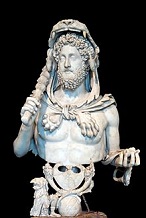










A Quick History of the Roman Emperors (Roman Emperorscope™) |
By T.L. Winslow (TLW), the Historyscoper™ |
© Copyright by T.L. Winslow. All Rights Reserved. |
Last Update: Sept. 28, 2025 |
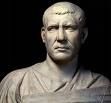

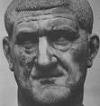






Westerners are not only known as history ignoramuses, but double dumbass history ignoramuses when it comes to the Roman emperors. Since I'm the one-and-only Historyscoper (tm), let me quickly bring you up to speed before you dive into my Historyscopes.

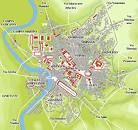
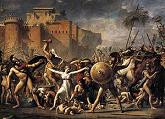
Every people has a founding myth, a frame for their identity, which lets them restart the calendar with year one, and contains within itself the seeds of their ultimate destruction? The Romans claim to come from Long and White, and must be bragging? On Apr. 21, 753 B.C.E. the city of Rome (Roma) (modern-day pop. 2.9M/4.36M), is traditionally founded by twins (fraternal or identical?) Romulus (-771 to -717) and Remus (-771 to -753), born in nearby Alba Longa (12 mi. to the SE in the Alban Hills on the W crater rim of Lake Albano) of the god Mars and mother Rhea (Rea) Silvia (Ilia), a vestal virgin who is the daughter of King Numitor of Alba Longa, and a descendant of Aeneas (Gr. "he who is praised") (the very title later adopted by Muhammad?), leader of the Trojans and son of Anchises and Venus, who escapes from Troy and wanders for years before coming to Latium, and whose son Ascanius or Iulus is the founder and 1st king of Alba Longa, keeper of the Palladium or image of Pallas Athena stolen from Troy by Ulysses and Diomedes, which ends up in the Roman temple of Vesta; at birth they are kidnapped by order of the jealous Numitor, then deposited on the banks of the Tiber (in a basket like Moses?) to die, but rescued and raised by she-wolf Lupa (sucking wolf tit and drinking wolf milk, to make them into predators?), who suckles them in the Lupercal(e) (Lat. "she-wolf"), a cave on the SW foot of the Palatine Hill (uncovered in 2007 C.E.); they are later raised by shepherd Faustulus and his wife Acca Larentia (Larentina), until they grow up and return to kill the king, then recruit Latin colonists from Alba Longa for their new digs, originally called Saturnia after Saturn, "father of the gods", then Rome, City of the Seven Hills, home of the united cities of Latium (named after the god Lateinos (Chaldean "to lie hidden"), their version of Saturn, offspring of the Sun, represented with a ring or halo around his head, and known as the Hidden God, the God of Mystery, with both Saturn and Lateinos having the Number of the Beast 666, hence the pope also?), on the left (E) bank of the Tiber River 17 mi. inland from the Tyrrhenian Sea near malarial swamps where the river makes two sharp bends in a reverse S-shape; the Seven Hills of Rome (Poor Queer, er, Queen Vicky Eats Crow At Christmas?) are: Palatine Hill (C) (centermost) (140 ft. above the Tiber E of the S bend) (home of the aristocrats) (first to be settled); Quirinal Hill (NE) (named after Sabine war god Quirinus); Viminal Hill (NE) (finger-shaped land pointing toward C Rome between the Quirinal Hill to the NE and Esquiline Hall to the SE); (located between the Forum and the Campus Martius); Esquiline Hill (E) (N part of the Oppian Hill); Capitoline Hill (named after the Temple of Jupiter Optimus Maximus) (original name: Mons Saturnius) (W) (; Aventine Hill (SW) (home of the plebs or plebeians, consisting of two small peaks and a gully); Caelian Hill (SE); later the Pincian Hill (NE) (N of the Quirinal) and the Janiculum Hill (W) (on the right bank of the Tiber opposite the N bend) are inhabited with overflow pop.; the area between the Capitoline and Palatine Hills is a marshy valley, which is drained by -500 and turned into a marketplace (the Forum); actually, the legendary founding is moose hockey, and communities existed on the Palatine, Capitoline and Esquiline Hills by -1000, and the city was really formed by the Etruscans after they conquered Latium around -600 and forced the independent communities under their yoke?; the Circus Maximus is later built between the Palatine and Aventine Hills (with the cheap seats on the Aventine side?); the Tarpeian Rock is on the S side of the Capitoline Hill, and used for executing traitors by throwing them off the top; the Campus Martius (Lat. "Mars Field") parade ground W of the Quirinal and Capitoline Hills, E of the N bend of the Tiber River is the first expansion area for overflow pop. before bridges are built across the Tiber and a fort built on the Janiculum Hill for future expansion; the city is open for 1K years until the Aurelian Wall is built c. 270 C.E., encircling all the hills and connecting with the Tiber to the N and S; Romans begin counting time up from this date, or rather, counting down from this date, after Romulus and Remus attempt to conjure a vision from the gods, and Romulus conjures twelve fowls circling over the hills, while Remus is short-changed, only conjures six and fouls out, and the augur Vettius proclaims that Romulus will be king, after which Romulus marks the square sacred boundary of Rome on the Palatine Hill above the E shore of the River Tiber, known as the Roma Quadrata with the sacred bronze plow on the feast day (Parilia or Palilia) (Apr. 21) of the herd-flock god Pales (the hermaphrodite ass-god of ancient Caanan, for whom Palestine is named, as well as the Palatine Hill), then orders a ditch dug and sacred wall (pomerium) built around it, which jealous Remus jumps over, causing Romulus to kill him for sacrilege, becoming Rome's first king (which is why it's called Rome instead of Reme?); Vettius claims that the vision means that the fowls are eagles, indicating that Rome will kick everybody's butt and the city will thrive for twelve cents., but then the eagles will turn into vultures, indicating that Rome will fall and the inhabitants will become bird food (proof that paganism is true, or just a self-fulfilling prophecy, or a deep psychological meaning about killing one's good side so the bad side can run riot, becoming fatal in the end?) (if only he'd said twelve millennia?); when Jesus Christ is later portrayed as entering Jerusalem triumphantly on an ass, you figure it out?; speaking of bad side, Romulus rules for 37 years, waging war with the Sabines under Titus Tatius (d. -748) of Cures (on the left bank of the Tiber River 26 mi. from Rome), starting it by arranging for the mass-kidnapping and Rape of the Sabine Women in C Italy, which causes Tatius to capture Rome with help from Tarpeia, daughter of the cmdr. of the Roman citadel, who opens the gates on the promise that she will receive what the Sabines have on their left arms, whch gurns out to be their shields, after which they throw her from the Tarpeian Rock (which becomes the mode of execution of all capital punishment), after which the Sabine women (led by Romulus' wife Hersilia, daughter of Tatius) convince Tatius and Romulus to reconcile and rule Rome jointly, with the combined community called the Quirites; in modern times the historicity of Romulus is questioned, with German historian Theodor Mommsen uttering the soundbyte in 1854: "The founding of a city in the strict sense, such as the legend assumes, is of course to be reckoned altogether out of the question: Rome was not built in a day"; in 1900 Giacomo Boni (1859-1925) claims to find the tomb of Romulus; in 2007 U. of Rome prof. Count Andrea Carandini (1937-) uncovers evidence of the sacred wall plus Romulus' palace?; the next six kings are Numa Pompilius (-715 to -676), Tullus Hostilius (-673 to -641), Ancus Marcius (-640 to -617), Lucius Tarquinius Priscus (-616 to -578), Servius Tullius (-578 to -534), and Lucius Tarquinius Superbus (-534 to -510), the last three being Etruscans; the govt. is based on three tribes, the Ramnes, Tities and Luceres (Latins, Sabines and Etruscans?), with the pop. split into the patricians (large landowners) and the plebs (plebeians) (clines) (Lat. "fillers") (small landowners); only the patricians constitute the populus (citizens), and have political rights and can serve in the army; the govt. is run by elective king and a small royal council of elders (senate), plus a 100-man assembly of elders (patres) composed of 10 curiae (assemblies) for each tribe, each elder serving for for life and having to be a patrician; the rex leads the army in person, and is preceded by lictors (officers), who bear the fasces, the symbols of power and punishment, and is the supreme judge in all civil and criminal suits; Roman citizenship requires membership in a gens (Lat. "to beget"), i.e., a clan traceable through the male line to a common free ancestor without any slaves in the middle; at first only patricians can use the "gentile" name as the middle of their three names, but later the plebes are permitted; Romulus later worships in the small temple of Jupiter Feretrius ("Jupiter who carries away the spoils of war") on the Capitoline Hill; the crude round hut called the House of Romulus on the central Palatine Hill stands for the next eight cents. - when do they install the mechanical bulls?



It all starts with Shakespeare's Rape of Lucrece? In 509 B.C.E after a cent. of rule by Etruscan kings (since -616), Lucius Junius Brutus leads a rebellion of the Roman aristocrats against Etruscan king Tarquinius Superbus (Tarquin the Proud), whose son outrages Lucretia, wife of Lucius Tarquinius Collatinus, causing her to commit suicide after telling her hubby, igniting Lucius's cousin Brutus to lead the outraged Roman people to overthrow the Etruscan monarchy and expel the Tarquins from Rome; Superbus spends the rest of his life whipping up Etruscan and Latin support for a comeback that never happens; the aristocratic Early Roman Repub. is founded (ends -264), a collection of Latin city-states dominated by 320 sq. mi. Rome, with patrician (top dog), pleb (plebeian) (commoner) (middle dog) and proletarian ("offspring") (low dog), and lower-than-a-dog slave classes below them, two elected (1-year term) sovereign consuls (magistrates) (praetors) (whose edicts have the force of law), an advisory Senate, which permits conscripti or enrolled pleb members, causing all senators to be called patres conscripti (conscript fathers), and a popular assembly; too bad that only patricians can become praetors, causing simmering pleb discontent; on Sept. 13 the Capitoline Temple of Jupiter-Juno-Minerva is dedicated. The first Roman consuls are Lucius Junius Brutus (praenomen, nomen, cognomen) and Lucius Tarquinius Collatinus, who are elected for 1-year terms (the beginning of a 1957-year chain); the Roman Repub. is weak at first, but after 200 years of war it controls most of the peninsula and starts its imperial push to make the whole world bow to it - why do they always send the poor?
In 146 B.C.E. the Achaean League attacks Sparta, but the Romans under consul Lucius Mummius Achaicus crush them, destroy Corinth, slaughter the men, and sell the women and children into slavery, then dissolve the Achaean League, substituting oligarchies for democracies, and annex Greece, placing it under the supervision of the Roman gov. of Macedon, who is permanently installed in Thessalonica; once-proud Greece becomes another tribute-paying Roman province, full of people every Equestrian would like to own?; Macedonia's four districts are formed into a koinon by Rome, with capital at Beroea at the foot of Mt. Bermios (seat of the imperial cult); from now on Greeks work as slaves and peddle their cerebral culture to their practical-minded Roman masters, while living in the past in a state of denial? - don't worry, Romans, you will know what it feels like one day?

In 63 B.C.E. Roman #1 gen. Gnaeus Pompeius Magnus (Pompey the Great) (-106 to -48) invades Palestine, quashes the Judean Civil War (begun -67) between two brothers, Aristobulus II (d. -49) (elder) and Hyrcanus II (d. -30), who vied for both the kingship and high priesthood, and captures Jehovah-town Jerusalem, taking the crown from Hyrcanus II and ending the Hasmonean Dynasty; Pompey then (after having a row of stiff-necked Jewish priests executed?) pompously enters the Jewish Temple, parts the 30 ft. x 30 ft. x 4 in. Holy Curtain and enters the Holy of Holies, finding it empty of Jehovah and his Shekinah (holy presence), making him believe that he proved Jehovah a fraud and/or that Zeus has destroyed him, giving the pagan Roman Empire its fatal hubris?; Pompey restores the high priesthood to Hyrcanus II, also making him ethnarch, responsible to the Roman gov. of Syria; Judea becomes part of the Roman province of Syria, with its territory greatly reduced, and now is in its last days as the blood flows every time a Messiah arises? - if the Jesus story is fiction, this is when they'd start thinking it out?







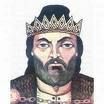
The government gets rid of its own leader, with the Roman LBJ Octavian waiting in the wings, but this time they don't try to coverup the fact that it's a conspiracy or frame a lone gunman? In Jan. 44 B.C.E. popular-with-plebeians Julius Caesar is appointed dictator (imperator) for life at his own request, and twice magnanimously refuses the crown of a king, although he renames the 5th Roman month Quintilis to Julius (July) as he were, performing all kinds of questionable actions to boot; but like true Italians, the aristocrats don't get mad, they get even with anybody even within a Roman mile of becoming a king, so on Mar. 15 (Wed.) (the Ides of March) (a.m.) after ignoring the entrail-examining Haruspices, soothsayer Spurrina ("Beware the Ides of March"), and his own wife Calpurnia Pisonis (b. -75) (who dreamed of their house collapsing, or, according to Shakespeare, of a statue of him streaming with blood while smiling men bathed their hands in it), plus a note pressed into his hand in the street on his way to the Senate (that reads "Beware of Brutus, take heed of Cassius, come not near Casca" according to Shakespeare) by defecting conspirator Artemidorus (which he is too busy to read), 55-y.-o. Gaius Julius (Gr. "child of Jove") Caesar (Lat. "hairy") (b. -100) is assassinated (after stupidly arriving unarmed and without bodyguards, trusting to luck, goodwill of the people, fate, whatever, and setting a precedent for future suicidal U.S. presidents like Lincoln and JFK?) as he sits in his gilded chair at the head of the Senate Curia (Hall of Pompey) at the foot of a giant statue of his late arch-rival Pompey (poetic justice?) by a group of 60 senators concealing daggers in their togas, who all approach at the same time, with Lucius Tullius Cimber (d. -42) asking him to pardon his exiled brother and being refused, then grabbing his purple robe from his shoulders, causing Caesar to shout "Why, this is violence!", after which the first blow is struck by tribune of the people Publius Servilius Casca Longus (-84 to -42) (who is standing behind him) in the back of the neck (Plutarch) or breast (Appian), which doesn't hurt him very badly, allowing old soldier Caesar to catch him by the arm, crying "Casca, you villain, what are you doing?", as he runs his arm through with his writing stylus, causing him to cry to his brother Gaius Servilius Casca in Greek "Help, brother!", after which the others, incl. Gaius Cassius Longinus (-86 to -42), Caesar's good friend Marcus Junius Brutus the Younger (-85 to -42), Caesar's Massilian naval cmdr. Decimus Junius Brutus Albinus (-85 to -43), and poet Gaius Cassius Parmensis (-74 to -30) (from Parma) close in and beginning stabbing Caesar before he can leap to his feet, instead hiding his head in his robe so nobody can see his face and using his left hand to hold his toga as he falls, ultimately receiving 23 dagger holes in his toga, groaning only at the first stroke, although he might have (should have?) uttered the immortal soundbyte "Et Tu, Brute?" ("You too, Brutus?") (really "Tu quoque, fili me?", meaning "You too, my son?) (really the Greek phrase "Kai su, teknon?", meaning "You too, my child?) to Marcus or Decimus Brutus (who are from the #1 bluebood line of Rome, descending from big 509 B.C.E. hero Junius Brutus, who led the overthrow of the the Etruscan kings and started independent Rome going, meaning that if he's in it they're all in it) (or maybe the first words of the well-known Greek saying "You too, my son, will have your taste of power", meaning he will end up the same way?), who stabs him in the groin and is wounded by another senator's dagger in the flurry of stabbing; meanwhile Gaius Trebonius (-92 to -43) (appointed suffect counsul by Caesar in -45, and proconsul of Asia this year) keeps Marc Antony busy outside the Senate while the dirty work is going on; after the assassins exunt stage right, three slaves carry him home on a litter with one arm hanging out, after which physician Antistius conducts the first known forensic homicide investigation and (after counting the dagger holes, coming out 23 just like Jim Carrey (1962-) told ya?) concludes that only one (the 2nd?) stroke (to the breast) was mortal; 1,643 years later (1599 C.E.) William Shakespeare writes the immortal play Julius Caesar, dramatizing the event, incl. the soothsayer, wife Calpurnia's dreams, his own big mouth ("The omens shall be what Caesar makes them be") ("Et tu, Brute?"), etc.; on Mar. 17 the Roman Senate meets, and Marc Antony surprises the backstabbers by not demanding their arrest, but agrees to let them go unpunished if they approve Caesar's will and allow him a proper public funeral, and after they bite he tries some real speechifying, reading Caesar's will on Mar. 20 to the crowd in the Forum, going on about how his gardens along the Tiber River are to be turned into a public park, every Roman citizen is to be given 300 sesterces ($15), and what a great guy this stabbed-in-the-back man of the people was, expertly fanning the crowd into a frenzy, shouting for the assassins' blood (get em', boys?), causing them to cremate the body on an improvised pyre, then begin the 13-year Post-Caesarian (Liberators') Roman Civil War (ends -30); after Caesar's aristocratic murderers come to bad ends as the People with a capital P bring them down, future aristocrats get smart and begin using puppet murderers so they can hide behind the curtains and cut the strings when the People begin to investigate; too bad, Antony's hopes of being adopted by Caesar and becoming the next king are shattered when he reads the rest of the will, which names Caesar's 18-y.-o. grandnephew Octavian (Gaius Octavius Thurinus) (-63 to 14) as his adopted son and sole heir Gaius Julius Caesar Octavianus (that covers all eight octaves?), and in early Apr. after his mommy Atia Balba Caesonia (-85 to -43) and adoptive daddy (hubby since -59) Lucius Marcius Philippus (d. -43) (lifelong fence-sitter, who sat out the war between Caesar and Pompey) fail to talk him out of it, the lucky devil returns from Apollonia in Dalmatia to Rome to take up his inheritance, starting out on the wrong foot on Apr. 18-21 by offending Cicero (who is orating against Antony) by trying to charm the fat pompous ass, and in June Antony is granted a 5-year governorship of N-C Cisalpine and Transalpine Gaul, spending Caesar's fortune instead of giving it to the people like he promised in his funeral speech, and marching N to claim his province of Cisalpine Gaul, allowing Octavian to sells his own possessions to pay them himself and play the hero, causing many legions to switch allegiance to him; meanwhile Brutus and Cassius flee to raise an army in the east, and Cassius captures Dolabella in Laodicea, Syria; Cleopatra VII flees to Alexandria, has her brother-consort Ptolemy XIV asp-assinated (poisoned) on July 26, and on Sept. 2 declares her 4-y.-o. son Caesarion as her co-regent Ptolemy XV Caesarion, king #16 (last) of the Egyptian 32nd (Ptolemaic) Dynasty; too bad, this year Egypt has the first in a series of bad harvests.
On Jan. 1, 42 B.C.E. Octavian Caesar is officially divinized (proclaimed a god) because of a comet that appeared at his games in -44, and he becomes "the son of god".

In June 37 B.C.E. rabbi-murdering Herod I the Great (-73 to -4/-1) conquers Jerusalem with the help of his patron and ally Marc Antony's gen. Gaius Sosius, becoming Roman client king of Judea, Idumea, Samaria, Batanea, Aurantis, Trachonites, Peraea, and Galilee; a hated Edomite (descended from Esau, elder fraternal twin brother of Jacob, father of Israel, who sold his brithright to Jacob for a pot of red lentil stew, after which their tribes split, Esau's tribe AKA the Edomites settling to the E and S of the Dead Sea, and Jacob's tribe AKA the Jews settling to the W and N), the Roman act of setting Herod I up over them as king is a huge slap in the face; Herod I has the last Hasmonean ruler Mattathiah Antigonus slain by Antony's orders, and marries Mariamne I of Samaria (a princess of the Hasmonean line) to consolidate his position with the Jews; Herod I devotes himself to developing and beautifying Jerusalem, building walls, towers, and palaces, and starting in 19 B.C.E. orders the Temple of Jehovah (Solomon) rebuilt and vastly enlarged, expanding the Temple Mount, buttressing the courtyard with blocks of stone weighing up to 100 tons, doubling its size, and doing the unthinkable by creating a courtyard for women, and another for dirty defiled genital-exposing gentiles, a desecration sparking patriotic Jewish resistance movements complete with several Messiahs, all duds; of course Jesus Christ was one of them, but his followers later claim that being a dud was part of the plan, and was a victory after all as his execution caused Jehovah to judge the Roman Empire and doom it, the original Jews don't get mad they get even; construction on the Jewish Temple continues until 64 C.E.


The original Awesome Blossom? In Jan. 27 B.C.E. Octavian declares the republican govt. restored to the "Senate and people", and offers to resign his position as consul, but the Senate, wisely noting how he retains exclusive control of the army by apparently dividing the provinces between him and them, with the ones with the fewest troops going to them, gives him the position of princeps (first citizen), then, after he graciously refuses the title of Romulus, on Jan. 16 gives him the name Augustus (Lat. "revered one"), heretofore reserved for gods, beginning the emperor worship cult, magnanimously mounting the pantheon of month-gods by renaming the 6th month Sixtilis after himself (August), and shortening February so that he can make it as long as July, while juggling other months to their modern-day lengths; he fixes the number of senators at 600; he receives an enormous proconsular province incl. Spain, Gaul, Syria and Egypt (the grain supply of Rome), governed by loyal salaried "legati Augusti pro praetore" with long terms of office, and bypasses senators by appointing equestrians into prefect positions, incl. prefectus annonae (grain supply), prefectus vigulum (fire dept.), prefectus Aegypti (governing Egypt as Octavian's private possession), and prefectus praetorio for his new Praetorian Guard (ends 312), consisting of nine cohorts (one less than a normal legion) of 500 men scattered through Italy, each with 12 (later 16) year terms and special pay privileges, incl. the right to station in Rome, which spooks the citizens until they get used to it, after which he increases each cohort to 1K men; he puts his vast private wealth into an imperial treasury (fiscus), kept distinct from the Senate's aerarium; Augustus divides Gaul into four admin. regions, Gallia Narbonensis (from the Alps to the Cevennes Mts.), Aquitania (bounded on the N by the the Loire River, and containing 14 more tribes than in Caesar's days), Gallia Lugdunensis (between the Loire, Seine and Saone Rivers, with capital at Lugdunum or Lyons), and Gallica Belgica (between the Seine and Rhine Rivers, to the North Sea); the org. lasts until the 4th cent. C.E.; Achaia (Greece excluding Macedonia) becomes a Roman senatorial province, with Corinth as capital; Ephesus becomes the capital of the proconsular province of Asia (until a little after 297 C.E.); "If we compute the number and duration of the reigns, it will be found that a period of six hundred years is filled by sixty emperors, incl. in the Augustan list some female sovereigns, and deducting some usurpers who were never acknowledged in the capital, and some princes who did not live to possess their inheritance. The average proportion will allow ten years for each emperor - far below the chronological rule of Sir Isaac Newton, who, from the experience of more recent and regular monarchies, has defined about eighteen or twenty years as the term of an ordinary reign." - Gibbon, Ch. 48.
About 25 B.C.E. Rome passes Chang'an (Changan), China as the largest city on Earth.
It was like Cirque de Soleil? In 23 B.C.E. 10-time consul Octavian resigns to give others a chance at prestige, then receives imperium maius ("greater command than others") and becomes proconsul, then tribune of the people (tribunicia potestas) (power of a tribune), with the power to introduce and veto legislation and convene the Senate, control elections, and nominate candiates of his choice, allowing him to control the state without himself holding office; his "household" begins to run Rome, substituting for the Senate, as he becomes Rome's first emperor - China's got nothing on Rome now?

In 20 B.C.E. Augustus has a Barefoot Statue of Octavian Augustus made, showing him standing in his military uniform barefoot, with the right arm raised and the left arm lowered, both hands pointing the index finger, and a portrait on his breastplate of him accepting the surrender of the Parthians, portraying him as a prince of peace who's bringing Rome a golden age and the Pax Augusta, while retaining the traditional Republican families in good shape; meanwhile he wipes out and/or buys his opponents in the Senate to solidify his absolute monarchy, while letting his symbols work for him to fool the complacent sheeplike public into being content, becoming the original Big Lie Coverstory used by all future European dictators.
In 8 B.C.E. the Roman Census gives the pop. of the Roman Empire as 4,233,000 citizens; the city of Rome is the first in history to reach one million.
On Mar. 13, 4 B.C.E. Jewish rabble-rousers Judas and Mathias are burned alive for protesting the placement of the golden eagle at the entrance to the Jehovah-less Temple of Jerusalem.

On Apr. 7, 4 B.C.E. Jewish proxy king of the Roman-occupied Holy Land (since -39) Herod I the Great (b. -73) has his eldest son Antipater (b. -45) (son of Doris) executed (3rd son he kills) after Augustus refuses to intervene, then dies five days later on Shebat 2 (Apr. 12) in Jericho after suffering "an intolerable itching of the whole skin, continuous pains in the intestines, tumors in the feet as in dropsy, inflammation of the abdomen and gangrene of the private parts, engendering worms, in addition to asthma, with great difficulty in breathing, and convulsions in all his limbs" (Josephus), and is buried in his fortified winter palace and mausoleum in Herodium 7 mi. S of Jerusalem (near modern-day Zatara); his Roman-educated sons wait in the wings while he orders the leaders of the Jewish nation burned alive in the Hippodrome in Jericho on his death so that the Jews will weep at his own funeral (Herod's sister Salome and her husband Alexas get the order countermanded?); his penultimate will names Antipas as his heir, but shortly before his death he makes a final will naming Archelaus (Matthew 2:22), causing Augustus to constitute him an ethnarch and divide the territory, with half going to Archelaus and half to be split by Antipas and Philip; Herod Archelaus (b. -23) becomes ethnarch of Samaria, Judea and Idumea (deposed in 6 C.E.); Herod Antipas (b. -21) becomes tetrarch of Galilee (home of Jesus Christ) and Perea (E bank of the Jordan) (home of John the Baptist) (deposed in 38 C.E.); Herod Philip (-20 to 34) becomes tetrarch (ruler of a fourth) of modern-day SW Syria and the Golan Heights (Gaulanitis, Batanea, Trachonitis, Autanitis, portions of Iturea and Hulitis) (all largely non-Jewish); Herod's sister Salome I (-65 to -10) is given control of Phaselis, Yavneh (Jamnia), and Ashdod (Azotus); daddy's favorite Archelaus immediately proves to be a good choice for him as he orders 3K Jews killed on Easter for trying to get him to rehabilitate Judas and Mathias.

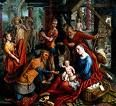
On June 24, 4 B.C.E. Judean Jewish prophet (of voice crying in the wilderness eating locust and honey fame) (St.) John the Baptist (Baptizer) (d. 32 C.E.) is born to Jewish priest Zechariah and his wife Elizabeth; according to the Gospel of Luke 1:5-25 he is conceived 6 mo. before Jesus on the night of the Day of Atonement (Yom Kippur), which would be in late Sept. *Sept. 24?) or early Oct. - so what's this I hear about you're fall and I'm spring? On Dec. 25, 4 B.C.E. Judean Christian Messiah Jesus Christ of Nazareth (Joshua or Yehoshuah bar Joseph) (d. 33) is born in Bethlehem to the Virgin Mary and Joseph (a carpenter or stoneworker), both of the House of David; don't ask about the In-Vitro Fertilization Technique used?; the official Roman Catholic Church position is Dec. 25, although the shepherds are in the fields with the flocks at the time of his birth, which would more likely be spring or summer, which might make John the Baptist the only Dec. baby?; Jesus is crucified on the day of his conception (Mar. 25)?

In 6 C.E. the city of Jerusalem and much of the surrounding area came under direct Roman rule as the Roman Judea (Iudaea) Province. Herod's descendants through #7 Herod (Marcus Julius) Agrippa II (27-100) remained client kings of Judea until 96 C.E.




In 14 C.E. the Res Gestae Divi Augusti (Achievements of the Divine Augustus) (Roman census) claims 4,937,000 Roman citizens; the total free pop. is 7.5M, plus 3M slaves. It's all about the he-said she-said bullsh--? On Aug. 19, 14 C.E. (Aug. 17 Gregorian) after 40 years as a god, dried-out old fart Roman emperor Octavian Augustus (b. -23) is given poisoned figs (belladonna?) by his venerable scheming 2nd wife Livia (b. -58) (after he will only eat figs he personally picks, and she spends all night coating every one on the tree?) and dies in Nola in Campania after asking Livia whether Tiberius' granddaughter (daughter of Julius Caesar Drusus and Livilla) Julia Drusi Caesaris Filia (5-43) has recovered from an illness, uttering the soundbyte "Fabula acta est" (the play is finished); since Livia had systematically eliminated all rivals, and Germanicus fails to go for it, on Sept. 15 Augustus is succeeded by his stepson (Livia's son) Claudius Nero Tiberius (-42 to 37) (who already holds tribunicia potestas and imperium maius) as Roman emperor #2; he decides that Augustus' palace sucks and builds his own palace on the Palatine Hill; in his will Augustus adopts traitor wife Livia into his own lineage, giving her the title Julia Augusta; meanwhile Tiberius cuts off the allowance of his wife Julia the Elder (b. -39), and she starves to death; the Senate appoints Germanicus as cmdr. of the Roman legions in Pannonia and Germany, but when they get the news that their recruitments will not be reduced to 16 years from the usual 20, they mutiny and proclaim Germanicus emperor, but he stays honorable and suppresses them, then disobeys Augustus' will by impetuously leading them across the Rhine River to raid the Marsi on the upper Ruhr River, massacring most of the tribe; meanwhile Tiberius' real son Drusus Minor is sent to make sure the mutiny in Pannonia is suppressed. Rome sets up a network of relay runners carrying messages 50 mi. a day. Augustus leaves a will specifying that the empire's boundaries not be enlarged, but that doesn't stop later emperors from acquiring Cappadocia (EC Asia Minor) in 18, Mauretania (NW Africa) in 41-3, Britain in 43, Pontus (SE shore of the Black Sea) in 63, Thrace (W of Byzantium) in 46, Lower Dacia (N of the Danube) in 87, Arabia (NW corner) in 105, Upper Dacia in 107, and Armenia, Babylonia and Osrhoene (S of Cappadocia and Armenia, incl. Edessa) in 115. Tiberius transfers the elections from the assemblies to the Senate, where already the passage of laws by the assemblies has become a rubber stamp formality. Sometime during Tiberius' reign some passengers of a ship allegedly claim to hear a voice shouting that Pan (the pagan prototype of the devil) is dead, and the early Christians take it as a reference to the dawning of the age of you know who?



30-40 Sorry, historyscopers, but? --it happens in the Roman province of Judea; nobody knows for sure, and it depends on whom you want to believe; a riddle wrapped in a mystery inside an enigma, the greatest coverup in history; the Great Track of Time enters not only a Dark Alley but a Black Hole, becoming an endless source of powerful fiction claiming to be fact, with the dividing line very hazy until centuries later - oh my gosh, I smell an Emmy? Way back when, nobody knows, a bunch of Roman pagans got infected with monotheism, and the most bookish kind, Judaism, and despite the Jews claiming to be the Chosen People, with pagans not invited, they managed to morph exclusivist Judaism into a new one-size-fits-all version by literally twisting the Jewish Bible inside out and claiming to discover that it was there all along, but needed a prophet to reveal it to them, whose life only they can tell us about, since nobody but believers documented it, a strange wonderful brew of historical facts and unverifiable miracles. The net result was a new religion called Christinsanity, er, Christianity, whose Aramaic-speaking Jewish founder Jesus Christ of Nazareth (-4 to 33) left no writings, works of art, statues, buildings, swords, armor, bling, portraits, descendants, or even newspaper accounts, worse, no body, because he was allegedly resurrected from the dead by God on Easter, visiting his believers for 40 days before being translated to Heaven, and now sits at God's right hand waiting to return and judge the world and everybody who ever lived, leaving it to his 12 Disciples to spread the word that he wasn't just a man but the Son of God, whatever that means, most followers apparently taking him for God himself, despite the intractable philosophical difficulties that rocked the Church for centuries. To become a Christian ("little Christ") and live with Christ forever in his Kingdom of Heaven, believers must take everything about him on faith, which is good since they don't have to learn Aramaic or any history other than that in the Greek New Testament, consisting of the Four Gospels (Matthew, Mark, Luke, and John) and the Acts of the Apostles, and no theology other than that in the Epistles of Paul, Epistles of Peter, Epistle of James, Epistle of Jude, and Epistles of John, or any eschatology other than that in the Book of Revelation, then undergo Baptism, which causes them to be "born again" as a symbol of future resurrection like Christ's; too bad, backsliders who go back to a life of sin, and apostates who deny their new faith become a thorny problem, especially if they apostasize under conditions of persecution then try to reclaim their Christian faith when it ends. Speaking of persecution, from the start the Jewish priests hated this blasphemous Jewish sect, which according to the Gospels made them plot to get Jesus (but not his disciples) arrested and crucified by the Romans for sedition, and the tolerant polytheist pagan Romans finally had enough of them too when they refused to worship the Roman emperor as a god like every other good citizen, labeling them as atheists and traitors, and forcing the cult underground, where they mainly recruited slaves but eventually penetrated the upper classes. The spectacle of Christians being fed to wild beasts in the arena while filled with joy at the prospect of being with Christ was a powerful recruiting tool, ask Denver Broncos quarterback Tim Tebow why he paints John 3:16 on his face. Too bad, the early personalities and their organization are shrouded in mystery, and the takeover of the Roman Empire in the 4th cent. by the monomaniacal intolerant Roman Catholic Church gave them the opportunity to destroy, alter, or manufacture historical records, so it's one of the greatest coverups in history and we can only hope for glimmers of light and cast theories about what really happened, sorry. Talk about coverup, the disturbing parallels between Christianity and pagan Sun worship make many suspect that Christ was a fictional figure pasted together by brainy Jews based in some library in Alexandria or Babylon out of twisted Old Testament texts foretelling the Jewish Messiah, who was supposed to conquer the world and make everybody love Jews, but obviously hasn't shown up yet, unless it was him, get it? Why would Jews conspire to foist a fictional religious founder on the pagan Roman Empire? Answer: Jews don't get mad, they get even, and this time it was for destroying Jerusalem along with its Temple and priesthood in 70 C.E. and causing the Jewish Diaspora. If that was their goal, they achieved it in spades, turning the mean cruel blood-loving superior united pagan Romans into guilt-ridden ever-schisming ever-backsliding Bible-thumping Christian whimps who were easy meat for the hordes of barbarians, tanking the once all-powerful Roman Empire in 476, and giving the wandering Jews a chance to return and restore the Jewish nation of Israel based in Jerusalem, complete with Temple and priesthood, maybe king, ask Mel Gibson about it when you catch him drunk. Too bad, it's hard to imagine how these fiction authors could palm their writings off and get enough believers to fill a donkey cart, unless they posed as believers and made a career of it, risking persecution, which doesn't compute. Also too bad, there seems to have been a community of Christians before the writings even came out. Also too bad, by 476 the Roman Empire had split into two halves, and the Eastern Roman Empire that controlled Israel stood strong, keeping the Jews out like always. Also too bad, despite displaying a deep knowledge of the Old Testament, the New Testament doesn't read like it was written by Jews, treating them as an alien race who brought their troubles on themselves by rejecting you know who, although he was also a Jew and Christians must worship him as their Savior, what pretzel logic. No surprise, belief in Jesus Christ and respect for the Jewish Old Testament like he had didn't make former pagan Roman Christians automatically love Jews, but backfired, turning many into rabid anti-Semites, some even claiming to be the real "spiritual Jews", with the Roman Catholic and Greek Orthodox Churches both worked to keep the Jews from returning to Israel unless/until they accepted Christ, guess why the Muslim Quran displays a deep knowledge of the Old Testament and Talmud, the pretzel the pretzel the pretzel is twisty, and Christians are the salt of the Earth. Either way, the Old Testament started it all, and the Jewish Messiah's Mission: Impossible isn't done yet, which Christians explain away as the need for the Jews to finally accept Christ before he returns to judge the world, although in the Jews' thinking that would make them into blasphemers who would face damnation by God. Yet now after 2K years, if Jesus wasn't the Messiah, why do Jews still believe in one, those stiff-necked losers? After the WWII Holocaust, why do any Jews still believe in God anyway, it was mainly atheist Jews who restored the state of Israel in 1948 after chucking the Old Testament? And after 2K years of Christ never returning as promised, how can a Christian still believe in this deadbeat dad, the umpteenth recycling of the Book of Revelation and photos of the Shroud of Turin? Oh yes, they talk to Him all the time, and that's all they need. On top of all that, Christendom schismed a thousand ways to Sunday over the centuries, and got convolved with the government and its police and military power, getting mixed up with injustices and atrocities that stunk it up, maybe one of the sects is the true one, if Christ returns he'll tell us. The bottom line is that it takes a big brain just to attempt to straighten it all out.


On Mar. 16, 37 C.E. after a decade on the Rock Hard Hudson, Roman emperor (since 14) Tiberius (b. -42) dies of mushroom poisoning in Misenum; he was emperor during the entire period of Jesus' ministry, and it was his image on the tax coin of which Jesus said "Give to Caesar what is Caesar's, and to God what is God's" (Mark 12:14-17, Mt. 22:17-21, Luke 20:22-25)? (to really 'get' it, note that Roman coins have the emperor's face on the front and some kind of pagan god on the rear?), and Germanicus' 25-y.-o. surviving son Gaius Caesar, AKA Caligula (Army Boots) (Gaius Julius Caesar Augustus Germanicus) (12-41) becomes Roman emperor #3; Tiberius had to be smothered by Caligula's chambermaid Macro after he awakens from a coma and Caligula had already been congratulated on his accession?; despised by his stepfather Augustus as well as by just about everybody, the Senate refuses to deify Big T after death, and therefore he is the "one who is to be despised" who arose as the "king of the north"? (Dan. 11:15-21); when Tiberius' will is read and it names his young grandson Tiberius Gemellus as co-heir, Caligula names him his heir, then has him murdered early next year; Caligula restores Philip the Tetrarch's principality to his wastrel friend (whom he has released from prison and presented with a gold chain equal in weight to the iron one he wore in prison, which he donates to the Temple of Jerusalem), Herodias' Jewish brother Marcus Julius Herod Agrippa I (-11 to 44), who becomes the first since Herod I the Great to assume the title of king of Judea, ruling Gaulanitis (modern-day Golan Heights), Auranitis, Batanaea, and Thrachonitis, plus Abila; Caligula goes personally to Pandataria to fetch his mommy Agrippina Major's remains and bring them back to Rome; upon taking power, Caligula at first charms Rome's little heart, then in Oct. has a mental breakdown, nearly dies, and recovers, becoming a mad autocratic monster whose excesses squander the royal treasury left by Tiberius and cause him to extort heinous taxes and confiscate estates while striving to humiliate and crush the Senate and create an absolute monarchy and have himself and his sister worshiped as gods; his favorite method of torture-death is called "a thousand cuts"; he has his young cousin Gemellus beheaded to remove him as a rival to the throne, pissing-off his their joint grandmother Antonia Minor (niece of Augustus, and mother of Claudius) and causing her to commit suicide (really poisoned by Caligula?); somewhen he decides to declare war on the ocean, and to bestow the rank of consul first class upon his favorite horse Incitatus (Lat. "swift", "at full gallop"), and gives him a gold wine goblet and an ivory manger; he castrates a boy named Sporus and marries him - the original employers search Monster every day looking for the right candidates? Caligula makes Aretas IV the ethnarch (sheik) of Damascus.
In 38 C.E. Caligula becomes a reformer, publishing the public fund ledger (which Tiberius wouldn't do), abolishing some taxes, restoring those who lost property in fires, raising people into the equestrian and senatorial orders, and giving out prizes at gymnastic events; too bad, on June 10 after 400+ days of partying, Caligula loses his favorite sister (lover?) (named as his heir last year in his will during his illness, becoming the first Roman woman) Julia Drusilla (b. 16) to a fever, causing the party to end while he goes into the three stages of grief, has her declared a god (panthea) (first Roman woman), and exiles his other two sisters Julia Livilla and Agrippina the Younger; Caligula has an affair with the wife of Praetorian prefect (since 31) Macro (b. -21), accuses him of being a pimp, and forces him to commit suicide; Macro really was plotting with Gemellus after Caligula got a fever?; Caligula marries three women this year, and orders Gemellus murdered, putting the Senate into shock and awe, attempting to crush them while giving the adoring public bread and circus, initiating a sadistic killing spree that forever labels the Roman Empire as unfit to exist for lack of checks and balances? - somebody ought to write some fiction that undermines it? Long-shot Vespasian (b. 9) is elected plebeian aedile.


On Jan. 24, 41 C.E. after appearing before the people dressed as different gods and goddesses, declaring himself a god and having his own temple built to be worshipped in, ordering a bridge built between his palace and the Temple of Jupiter so he can be in constant contact with the gods, exiling his two sisters, and having one of their husbands (his former lover) killed for plotting against him, and crossing the red line with the Senate by making arrangements to move the imperial court from Rome to Egypt, where no Senator is allowed to set foot, after 400 days in power, mad emperor (since 37) Caligula (b. 12) is assassinated in a secret underground passage (cryptoporticus) as he leaves the Palatine Games for lunch by a mob of Senators, equatorians, and Praetorian Guards led by tribune Cassius Chaerea along with his wife Caesonia and their mean-tempered infant daughter Julia Drusilla (because he was offended by his demeaning mean humor accusing him of effeminacy and homosexuality?); his scholarly stuttering uncle and adoptive father Tiberius Claudius Drusus is proclaimed Roman emperor #4 Claudius I (-10 to 54) (I, Claudius?) by the Praetorian Guard after being found hiding behind a curtain; he has a limp and plays an idiot to survive (the original Verbal Kint AKA Keyser Soze?), but proves to be an able administrator, although his imposition on the Senate by the Praetorians gives him a weak political position which he is forced to bolster with marriage and alliances; Edward Gibbon calls Claudius "the only one [of the first 15 emperors] whose taste in love was entirely correct"; in Jan. Cassius Chaerea is executed at his request with his personal sword (after he pisses-off Claudius by ordering the murder of Caligula's wife and child?; meanwhile Claudius tries to obliterate Caligula's memory, having the Senate declare his memory damned and all statues and other memorabilia destroyed, going on to become a big empire builder, eventually adding six new provinces.

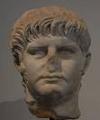

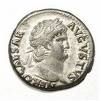
On Oct. 13, 54 C.E. emperor (since Jan. 24, 41) Claudius (b. -10) dies of mushroom poisoning by his wife Agrippina Minor, and her Hellenophile hooligan son Lucius Domitius Ahenobarbus, who changed his name in 50 to Nero (37-68) becomes Roman emperor #5 (last of the Caesars) (until June 9, 68) after mommy gets Praetorian Prefect Sextus Afranius Burrus (1-62) to present him to his cohorts and declare him emperor instead of Claudius' son Britannicus, getting the Senate and provinces to accept the choice; Burrus becomes Nero's advisor, along with philosopher Seneca Minor, beginning the Five Golden Years of Nero (Quinquennium Neronis), in which Nero takes advice and rules with moderation, lowering taxes and govt. regulation and giving the Romans more bread and circuses while cultivating his love for poetry, music, painting, sculpture, and horseracing and snubbing the army, becoming the first emperor to never visit them; these years are called by Trajan "the best of the imperial era"; Nero renames Caesarea Philippi to Neronias, and gives Tiberias and Taricheae in Galilee, and Julias in Perea to pro-Flavian puppet Herod Agrippa II, who now rules the lands of his great-grandfather Herod I the Great from fabled Jerusalem without title, carrying on an incestuous relationship with his sister Bernice, former queen of Cilicia, while trying to get the dazed Jews over the idea of Jewish independence?
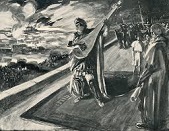
You keep saying you got something for me, something they call love? On July 18/19, 64 C.E. (Fri.-Sat.) (night) (the day before the dog star Sirius rises) the Great Fire of Rome begins (ends July 24), burning the city to the ground, letting Nero build a magnificent new city as a memorial to himself, just like he wanted; since the violin isn't invented until the 16th cent. C.E., he doesn't stand on top of a tower and fiddle, or sing "The Fall of Troy" while dressed in a costume and playing a lyre, but according to Tacitus is 50 mi. away at his villa in his birthplace of Antium, and rushes back to try and stop the blaze? (aw shucks, forgot to bring some water?) (admired the spectacle from a distance while reciting verses about the burning of Troy?) (not responsible, but glad it happened?); "Of the fourteen regions or quarters into which Rome was divided, four only subsisted entire, three were levelled with the ground, and the remaining seven, which had experienced the fury of the flames, displayed a melancholy prospect of ruin and desolation" - Gibbon, Ch. 16; after being himself accused of doing it, pudgy mother and wife killer Nero blames it on the pernicious new underground sect of Christians (actually Chrestians?) (suspected of witchcraft), and begins the vicious First (Neronian) Persecution of the Christians; alleged firestarter Apostle St. Paul is arrested (in Nicopolis of Epirus?) and sent to Rome for execution; "But all human efforts, all the lavish gifts of the emperor, and the propitiations of the gods, did not banish the sinister belief that the conflagration was the result of an order [by Nero]. Consequently, to get rid of the report, Nero fastened the guilt and inflicted the most exquisite tortures on a class hated for their abominations, called Chrestians by the populace. Chrestus, from whom the name had its origin, suffered the extreme penalty during the reign of Tiberius at the hands of one of our procurators, Pontius Pilatus, and a most mischievous superstition, thus checked for the moment, again broke out not only in Judæa, the first source of the evil, but even in Rome, where all things hideous and shameful from every part of the world find their center and become popular. Accordingly, an arrest was first made of all who pleaded guilty; then, upon their information, an immense multitude was convicted, not so much of the crime of firing the city, as of hatred against mankind. Mockery of every sort was added to their deaths. Covered with the skins of beasts, they were torn by dogs and perished, or were nailed to crosses, or were doomed to the flames and burnt, to serve as a nightly illumination, when daylight had expired. Nero offered his gardens for the spectacle, and was exhibiting a show in the circus, while he mingled with the people in the dress of a charioteer or stood aloft on a car. Hence, even for criminals who deserved extreme and exemplary punishment, there arose a feeling of compassion; for it was not, as it seemed, for the public good, but to glut one man's cruelty, that they were being destroyed. - Tacitus, Annals, 15.44.
In 64 C.E. the problem of making room neatly solved, after passing preventive regulations Nero begins the Golden House (Domus Aurea), a 200-acre villa-garden in the center of Rome, incl. the entire Palatine Hill, extending to the slopes of the Esquiline Hill, seizing land belonging to the Laterani family, which in the 4th cent. is donated by Constantine the Great to the Church and becomes the site of the Lateran; meanwhile he begins plundering Italy and the provinces to pay for it all, while pacifying the pop. of Rome with free grain distributions and expensive spectacles - it's the future of real estate?




In 68 C.E. on his return from Greece, Nero hears that Gaius Julius Vindex (37-69), legate of Gallia Lugdunensis (C France) is leading a revolt; Lucius Verginius Rufus (14-97), legate of Upper Germany puts down the revolt, and Vindex is killed; Rufus refuses to be saluted as imperator (emperor) by his troops; meanwhile in Mar. 72-y.-o. Spaniard Servius Sulpicius Galba (-3 to 69) is saluted as emperor by the two legions in Hispania Tarraconensis (Spain), and marches on Rome, where the Praetorian Guard under Praetorian prefect (since 62) Gaius Nymphidius Sabinus (35-68) forces the resignation of the other prefect Tigellinus and recognizes him, causing the Senate to reject Nero and declare him a public enemy. In May more troops revolt under Lucius Clodius Macer, propraetor of Africa, cutting off Rome's food supply, but after Galba, who put him up to it, gets suspicious that he's trying to become emperor when he raises a second legion, he has him killed in Oct. by procurator Trebonius Garutianus with the help of Macer's own centurion Papirus. On June 9, after fleeing his Golden House, Roman emperor (since 54) Nero (b. 37) commits suicide in a villa outside Rome by having his servant stab him (last words: "What an artist is lost", "Too late! This is fidelity"); meanwhile in Oct.-Nov. after Nymphidius hears about the assassination of Macer in Africa and gets nervous, he attempts to have himself declared emperor, claiming to be the illegitimate son of Caligula and first cousin of Nero, but is killed by his own soldiers when they hear of the approach of Galba, who becomes Roman emperor #6; the dynasty of Augustus (Julio-Claudian line) comes to an end, slowing the Roman attack on Israel down; Vespasian sends his son Flavius Sabinus Vespasianus Titus (39-81) to Rome to congratulate the new emperor, and Herod Agrippa II accompanies him; the orator Quintilian accompanies Galba to Rome from Spain (where he had returned after the death of his teacher Afer in 59), becoming famous and working his way into the hearts of the emperors; on his way to Rome, Galba has former British gov. Publius Petronius Turpilianus summarily executed as a Nero man.



In 69 C.E. the Year of the Four Emperors sees the Roman Empire eat itself alive; on Jan. 1 the eight Roman legions on the Rhine refuse allegiance to Galba, and on Jan. 3 the four in lower Germany salute legate Aulus Vitellius (15-69) as emperor, followed by the other four; on Jan. 1 Galba adopts as his successor and deputy emperor the handsome, well-bred aristocrat Lucius Calpurnius Piso Frugi Piso Licinianus (38-69), passing over Nero's friend from Lusitania (SW Spain) Marcus Salvius Otho (32-69) for having as bad a character as Nero, which pisses him off, causing him to gain the support of the Praetorian Guard and have Galba hacked to death in the street by scores of soldiers on Jan. 15, after which the helpless Senate recognizes him as Roman emperor #7; Piso escapes to the temple of the Vestal Virgins, but is discovered, dragged outside and killed on Jan. 15, after which Otho ransoms his severed head to his widow Verania for a large sum, and 120 people claim credit for killing Galba and/or Licinianus, ending up with their names on a list that gets discovered by Vitellius, who has them all executed; meanwhile the 70K troops of rival emperor Vitellius (gov. of Germania Inferior) march on Italy in two divs. under Fabius Valens (-69) (cmdr. of Legio I Germanica in Germania Inferior, who incited Vitellius to revolt) and Aulus Caecina Alienus (-79) (a former supporter of Galba, known for his good looks and oratorial skills, who switched to Vitellius after being caught embezzling public funds); on Apr. 16 after Otho's chief gen. Gaius Suetonius Paulinus (the dude who kicked Boudica's butt in 61) defeats Caecina near Cremona, Caecina and Valens hook up and defeat Otho at the First Battle of Bedriacum (20 mi. from Cremona in N Italy), causing him to commit suicide, and the Senate to immediately recognize (notice the new title) Aulus Vitellius Germanicus (15-69) as Roman emperor #8; Titus returns to his father Vespasian in Israel, and Herod Agrippa II continues to Italy to meet the new emperor or emperors; on July 1 Vitellius enters Rome, and the same day Judean legate (son of an Italian tax collector) Vespasian is saluted as emperor by the Roman legions in Egypt under the command of Egyptian prefect Tiberius Julius Alexander, a rich Jew from Alexandria (brother of Philo Judaeus) (a Jew, and therefore a Jewish plot?), and his Judean legions support him, followed by the Syrian legions under legate Gaius Licinius Mucianus, and the Danubian legions led by Pannonian 7th legion cmdr. Marcus Antonius Primus; Caecina flops against Vitellian, and is imprisoned by his own soldiers when he tries to talk them into joining Vespasian, then taken into Vespasian's favor after he becomes emperor, only to end up being executed by Titus next year for conspiring against Vespasian; on Oct. 24 the Second Battle of Bedriacum is won by Vespasian's forces, who cream (sack) Cremona; as Primus' army approaches Rome, another army sent by Vitellius to fight them defects on Dec. 17, Vespasian's brother seizes the capitol, which gets burnt in the struggle, and on Dec. 22 Vitellius is slain in the bitter street battle (dragged through the streets and murdered by his own troops?), and the Senate immediately recognizes Vespasian (Titus Flavius Vespasianus) (9-79) as Roman emperor #9, who all this time runs the show from the sidelines in Judea, and now goes to Rome, leaving son Titus to finish off the rebel Jews at Jerusalem (and keep his promise to the music that he loves?; the Vitamin B and bioflavinoid-enriched Flavian Dynasty begins (ends 96).
"O Jerusalem, Jerusalem, killing the prophets and stoning those who are sent to you! How often would I have gathered your children together as a hen gathers her brood under her wings, and you would not! Behold, your house is forsaken and desolate. For I tell you, you will not see me again, until you say, 'Blessed is he who comes in the name of the Lord'... Truly, I say to you, there will not be left here one stone upon another, that will not be thrown down." - Matt. 23:37-9

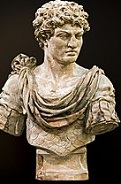




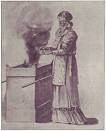

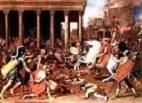
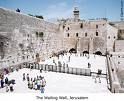
At the beginning of the year 70 C.E. the Jewish pop. in Judea is 2.5M, plus 4M outside Judea in the Jewish Diaspora, representing 15% of the pop. of the Roman Empire, with as high as 35% in some eastern cities; all still pay the annual Jerusalem Temple tax; an oracle that a Jew will become ruler of the world pumps them up? On Apr. 14 (Nisan 14) (right before Passover), 70 C.E. four Roman legions (80K soldiers) (V Macedonica, XII Fulminata, XV Apollinaris, X Fretensis) under Vespasian's son Titus Flavius Vespasianus (39-81) and his wily Alexandrian Jewish 2nd in command (procurator of Judea in 46-48 and prefect of Egypt in 66-9) Tiberius Julius Alexander, along with Jewish turncoat gen. Josephus arrive in Jerusalem, trapping the pop. inside the city along with the pilgrims and refugees after allowing them to enter to celebrate Passover; King Malichus II of Nabataea (-70) (S Jordan) sends 5K horse and 1K soldiers to help Titus; on Apr. 21 the Romans begin a full-scale assault concentrating on the Third Wall in the NW, which collapses on May 6 (Iyar 6); on May 11 (Iyar 12) they breach the Second Wall and begin circumvallating the city, cutting down all trees within 15 km (90 stadia) and build a 4.5-mi.-long wall of pointed stakes around the city, just like Jeezy allegedly predicted in Luke 19:43-44 ("Your enemies will build around you a fortification with pointed stakes and will encircle you and distress you from every side, and dash you to the ground, you and your children within your wombs, and they will not leave one stone upon another, all because you did not recognize the time of your visitation"); the siege strips all fruit trees, causing a famine, which is compounded by the scrappy Jews destroying each other in a civil war between the Zealots, led by Eleazar ben Simon (-70) (who occupy the inner court of the Temple), an opposing group of 6K led by John of Gischala (Johannes ben Levi), and the extremist dagger-wielding contract-killer Sicarii ("dagger-men"), led by Simon (Simeon) bar (ben) Giora ("son of a proselyte") (-70) (cmdr. of the Idumeans), who begin dressing in women's clothing and walking the streets to kill men for sport; Simon finally defeats John in a siege on the Temple, pulling some of his men out and forming a new faction, after which citizens have to climb over corpses in the Temple to offer their sacrifices; on May 20/21 a "certain prodigious and incredible phenomenon" is allegedly seen, consisting of chariots and troops in the clouds; on June 4 (Sivan 6) (Shavuot), priests in the Temple feel a quaking and hear "a sound of a great maltitude saying, 'Let us remove hence'"; on July 14 (Tammuz 17) sacrifices in the Temple cease forever; on July 20 the Romans capture the Fortress of Antonia N of the Temple, and set fire to a cloister, while the Zealots draw them into street fighting; meanwhile the Romans encircling the Holy City of Jehovah let it starve down to cannibalism, capturing any escapees and crucifying them for those inside the city to see, while letting others gorge until their stomachs burst? (a fulfillment of Deuteronomy 28:53-7)?); on Aug. 3 they break through into the inner courtyards, where 6K Jewish Zealots are waiting to fight to the death while being hamstrung by having to observe the purity laws and stay in their apprpriate places, leaving the priests to defend the Temple bldg.; finally on Aug. 4 after a 142-day siege (Nisan 14 to Elul 7) they storm it, batter down the N wall, work their way to the temple and massacre the desperate defenders, then set fire to it; Jerusalem falls in the summer; the Second Temple of Jehovah (Jerusalem) burns on the 10th day of the month Av (Aug. 4), then is torn apart stone by stone Roman soldiers of the 10th Legion Fretensis (of the Sea Strait) to get at melted gold and silver, who fail to find 50 tons of holy relics, incl. the temple's golden candelabrum et al., which remains a mystery until modern times; Herod Agrippa II returns from Rome just in time to see Jerusalem fall; the entire city is levelled by order of Titus, with the exception of the three great towers of Phasaelis, Hippicus, and Miramne; 1M-1.3M are killed (1.1M according to Josephus), and 97K Jewish POWs are taken (a fulfillment of Luke 21:23-24?), some being later used to build the Roman Colosseum and the Forum of Peace; Phannias den Samuel is killed during the destruction of the Temple; Simon bar Giora hides out in an underground cavern with his men, but when they fail to dig an escape passage and their supplies run out, he surfaces on the burned-out Temple Mount wearing a white frock and purple cloak, hoping to wow the supersititous Romans and walk away, only to be captured by Temple Mount capt. Terentius (Titus Arinius) Rufus, and later hurled down the Tarpeian Rock in Rome; Rufus has a plough drawn over the former temple courts to signify that it will never be rebuilt but will only be used for agricultural purposes; pesky John of Giscala is taken to Rome and sentenced to life in priz, with some modern scholars claiming he is the author of the Book of Revelation; Judea is depopulated of Jews, the worst tragedy in Jewish history until ?; the original Jewish religion ceases to exist, as there is no longer a temple or priesthood with sacrifices, and the genealogical records used to prove eligibility are destroyed, causing the remaining Jews to dummy-up a makeshift version, and mourn the loss of the Temple by wearing black, breaking a glass at weddings, and other tokens, while hoping, dreaming and plotting to rebuild it, meanwhile living in a zonked state of mind since they are all technically dying in their sins, unable to get the BBQ pits going at the Holy Golden Arches and sacrifice bulls, goats, etc.; meanwhile the Christian cult experiences a giant boost, since it can now claim that Jehovah had the Temple destroyed to punish the Jews for rejecting his son Jesus 40 years earlier, and has therefore done an Ahnuld and "called it a divorce" and given the Jewish birthright to Christians in their place (like when Esau sold his birthright for a pot of lentil stew?), and that all "gentiles" (originally the descendants of the Roman gens, but coming to mean anybody) can become the new chosen people ("spiritual Jews") if they accept Jesus as their savior and sacrificial lamb presented in a spiritual temple for their sins, the physical one no longer being needed any more than the obsolete Jewish Law and its impossible rules and regulations; in Jehovah's cosmic poetic justice, the ignorant Romans, in killing off the Jewish people and religion and quelling the pesky Christians, have actually opened their empire to takeover by the new improved spiritual Jews that can use the roads, Pax Romana, common Greek Koine language et al. to their advantage (what a heady feeling?)


On June 23, 79 C.E. Roman emperor (since 69) Vespasian (b. 9) dies of diarrhea (his last words: "Oh my, I must be turning into a god") (something to do with a gay anus?), and his son Titus (Lat. "Defender") Flavius Sabianus Vespasianus 39-81) (Titus Junior) (tight flavorful anus?) becomes the 2nd Flavor of the Day (Flavian) Roman emperor #10; after Vespasian is deified, Titus mends his bridges with the Senate, and wins popularity through largesses and lavish enterainments, and discontinues all prosecutions for laesa majesta, decreeing heavy punishments for informers; having kicked the Jews' butts personally, it's no surprise that he assumes the title of pontifex maximus (Lat. "maximum bridge-builder [to Heaven]"). On Aug. 24 (lunchtime) (Nov. 3-23, or after Oct. 17?) an earthquake is caused by Mt. Vesuvius on the Bay of Naples, causing most people in Pompeii to flee to late, with only 2K of 20K not getting buried in 20 ft. of lava, going on to destroy the other wealthy Roman seaside summer resort cities of Stabiae, Oplontis, and Herculaneum with volcanic ash, killing 20K; in the 1960s discover human brain tissue at Herculaneum turned into glass; Pliny the Elder (b. 23) is a victim, and his nephew Pliny the Younger writes an eyewitness account to Tacitus; it erupts over 50x more by the year 2000; the next big one is in 1631; Herculaneum is rediscovered in 1706, and excavations start in 1738; Pompeii is rediscovered in 1748; hundreds of bodies of victims who died at the seashore in Herculaneum are discovered in 1980; the Jews believe that the eruptions are retribution from Jehovah for detroying his temple in 70?; archeologists examining the site find that the Romans had perfect teeth caused by their sugar-free Mediterranean diets?, although the water pipes carried toxic antimony; ink in papyri discovered in Pompeii contains lead.





In 81 C.E. the Arch of Titus is erected in Rome W of the Colosseum, bragging about kicking the Jews' butts and showing Jewish captives and loot (incl. a menorah) from the Temple of Jehovah, announcing how Titus and his god Jupiter are boss and Jehovah (no he couldn't be but yes he could?) is a whimp and loser; too bad, not only did his temple of Jupiter burn down the year before, but on Sept. 13 Roman emperor (since 79) Titus (b. 39) dies prematurely in Campania of brain fever, and on Sept. 14 his 12-year-younger brother (who caused his death for having an affair with his wife Domitia Longina?) Titus Flavius Domitianus (Domitian) (51-96) becomes (Flavian) Roman #11 emperor (until 96), with his wife (since 71) Domitia Longina (53-130) (youngest daughter of consul Gnaeus Domitius Corbulo) as empress; Titus is immediately deified like his father, and Domitian decides to top them, becoming the first Roman emperor to command that he be worshiped as Dominus et Deus (Lord and God) during his lifetime; he revives the official persecution of the pesky Christians while ruling Rome like a tight ship, lavishly spending money on public displays of his majesty, instituting a reign of terror (making him the 2nd Nero), and ignoring and alienating the Senate, causing them to begin plotting against him, which only backfires when he catches them.
In 93 C.E. Domitian returns to Rome and begins a series of treason trials in the Senate, forcing the accused to condemn their colleagues, and launches the Domitian Persecution of the Christians (#2) (ends 96) to snuff out the pesky backstreet Christians. Homo lupus homini? In 95 C.E. former Roman consul (91) Manius Acilius Glabrio, who was forced by Domitian to fight a lion and two bears in his private amphitheater in Albanum is put to death for being a "contriver of novelty" (a Christian?); Domitian also executes consul Titus Flavius Clemens (his 2nd cousin and grand-nephew of Vespasian) for practicing "the customs and persuasions of the Jews" (after he is converted by Rabbi Akiba, gets circumcised and changes his name to Shalom Ketiah, or because he becomes a Christian?); the bloodbath of prominent nobles and relatives causes Domitian's enemies to reach critical mass, and Clemens' servant Stephanus becomes the Senate's designated hit man; later the Greek Orthodox Church makes Clemens a saint, with feast day on June 22; Pope Clement I is Clemens' freedman?







In 96 C.E. the Age of the Antonines begins in Rome (ends 180); "In the second century of the Christian era, the Empire of Rome comprehended the fairest part of the earth, and the most civilised portion of mankind... During a happy period... the public administration was conducted by the virtue and abilities of Nerva, Trajan, Hadrian, and the two Antonines" (Gibbon, Ch. 1). On Sept. 18, 96 C.E. at the 5th hour 45-y.-o. Roman emperor (since 81) Domitian (b. 51) is assassinated by Titus Flavius Clemens' servant Stephanus with help of the Roman Senate and his own wife, ending the Flavian Dynasty (begun 69); even though astrologers had warned him that he would die at that hour, the conspirators fool him by telling him it was the sixth hour, so that he lets down his guard, permitting Stephanus, steward of his niece into his bedchamber to show him a list of conspirators, whereupon he stabs him in the groin and calls in four helpers to finish him off; elderly noble senator Marcus Cocceius Nerva (35-98) becomes Roman emperor #12 (until 98), first of the Five Good Emperors (each sonless, adopting the succeeding one); he goes on to annul many of Domitian's acts incl. the one against Christians, and his perhaps too-clean policy incurs the hostility of many, incl. the Praetorian Guards?; Nerva is hailed as pater patriae, and he limits the games and corn doles - but not the corn holes?






In 96 St. Paul writes the First Epistle to the Corinthian Church, which alludes to his Epistle to the Hebrews. I'm so smart that I thought you were my son? About 96 (before or after Domitian dies?) aged Christian apostle St. John the Evangelist (1-100), son of Zebedee and younger brother of James the Greater, former disciple of John the Baptist, called Boanerges ("sons of thunder") by Jesus along with James for their zeal, now pastor (bishop?) of Ephesus, exiled by Domitian to the 13-sq.-mi. rocky goat isle of Patmos in the Dodecanese off the SW coast of Asia Minor dicates the ultimate Millennium Feverist handbook The Revelation (Apocalypse) of (St.) John to his scribe Prochoros from the Holy Grotto (Cave of the Apocalypse) of Patmos, where Christ allegedly visits and/or sends an angel to visit his last surviving apostle and tries to explain why he isn't coming back as soon as they all thought, and in fact he himself doesn't know, only God?; the Seven Churches of Asia (Minor) in W Turkey are addressed, incl. the Church of Ephesus, the lukewarm Church of Laodicea;, the Church of Pergamum, the Church of Philadelphia, the Church of Smyrna, the Church of Thyatira (Thyateira), and the Church of Sardis; Ch. 20 starts up Millennium Fever (MF) among Christians, the belief that Christ one day will return to Earth, conquer the "Beast", cast Satan and his followers into the abyss for 1K years, and reign as king with the resurrected faithful becoming princes and priests; but that's not all; the test is repeated, and at the end of the 1K years Satan is let loose again for a short time to recruit new followers, then put they are all put in the Lake of Fire (the second death) forever, and by now all the dead are resurrected and judged, either to eternal life or the second death along with Big S; Rev. 13:18 starts 666 Fear (hexakosioihexekontahexaphobia), the horrible-but-cool hangup that there's just something beastly about the Roman number DCLXVI (the first six Roman numerals written from largest to smallest), the idea of man (6) striving to become God, or create a trinity (666), and falling short of perfection (7), which requires the final Roman numeral M (messiah)?; some claim that Roman emperor Nero ("Neron Qesar") is meant because some mss. have 616 instead of 666; believers in the coming Chilling Millennium become known as Chiliasts; after too many of these false alarms cause all hope to be placed on the year 1000, and it proves a bust too, they switch to 1000 plus permutations of 6, 66, and 666, even using month #6 June as one of the magic keys to the big date, even though it said name not date, and some ancient mss. have 616 not 666, which not coincidentally is all the Roman numerals in order MDCLXVI, oops, no M, that's reserved for the real Messiah; call it a coincidence, but the Arabic Symbol for Allah looks a lot like the Greek letters for 666; (after returning to Ephesus?) John also writes the Gospel Accordin to John and the Three Epistles of John about this time; actually John's name is never mentioned in the Gospel According to John, but it gets attributed to him by tradition; in the Gospel of John Jesus never utters parables, but instead performs signs, and never casts out demons; in contrast to the Synoptic Gospels, which concentrate on Jesus' doings in Galilee, it concentrates on his doings in Judea and Jerusalem, displaying a first-hand knowledge of the geography prior to the Jewish Revolt of 66, and seems to show a knowledge of an ancient tradition independent of the other gospels, leading many scholars to consider it the most reliable of the four; the only gospel to describe Jesus' turning of water into wine at the wedding in Cana (2:1-11), his conversations with Nicodemus (3:1-21) and the Samaritan woman (4:1-42), and the raising of Lazarus in Bethany (ch. 11), along with the Holy Lance of Christ (spear stuck in his side to prove that he's dead after only three hours on the Cross, when most last a day or more, and despite a corpse being unable to pump blood out with a dead heart) (19:34); the only one to describe the role of Nicodemus in Jesus' burial (19:39); the only one with vocabulary not used in the rest, esp. the Gnostic-like talk in the Logos Passage (John 1:1-18): "In the beginning was the Word, and the Word was with God, and the Word was [a?] God. He was in the beginning with God. All things were made through Him, and without Him nothing was made that was made...", creating the eternal Arian vs. Athanasius Controversy: in the beginning of God's Creation did he first create the Word AKA Christ (Love?), then use him to create all else, hence Christ is a created being not God, or was the Word there in the beginning with God, thus is God, even though God has no beginning, and is eternal and uncreated?; so, as the 1st cent. ends, despite the skimpiness of history, God spoke and laid out the complete Plan of the Man in the New Testament; the whole point of Christ is to suspend God's judgment of eternal death on truly repentant sinners (Mk. 2:17, Acts 17:30) by coming the first time to save them (John 3:15-18, John 12:47) and the second time to judge them (Acts 17:31, Heb. 9:28), which is why he tells everybody that his blood will pay for their sins prior to conversion (Heb. 9:11-28), but afterwards to sin no more (John 5:14, 8:11), because sin (violating the Ten Commandments incl. having other gods, taking the Lord's name in vain, lying, stealing, coveting, murdering, committing adultery even with the eyes, etc.) is voluntary, and Christians will be sent the Holy Spirit to keep them from temptation and never sin again (1 John 3:1-10), but those who fall away are out of luck because Christ can't be crucified a second time (Heb. 6:4-6), and blasphemy against the Holy Spirit is unforgivable (Matt. 12:31-32); too bad, some Christian sects have the idea that they can get "saved" and continue sinning, when actually nobody is saved yet, because only at the End of Days will Judge Christ AKA God in Human Form open his court to judge us (Heb. 9:27), and going around claiming to be saved is sinful, taking the Lord's name in vain and lying?; the ultimate Supreme Court, the judgment is either entrance into the Kingdom of Heaven (Mt. 5:19-21, 8:11), or being cast by angels into the Lake of Fire (Rev. 20:15); maybe it's all a fairy tale, but the punchline is that nobody can be sure until they're dead, what a sales pitch.

On Jan. 27, 98 C.E. Roman emperor (since 96) Nerva (b. 35) dies from apoplexy after ruling only a year and a half, and his hand-picked Spanish-born heir (#2 of the Five Good Emperors) Marcus Ulpius Trajanus (Trajan) (53-117) becomes lucky (to the Romans, but tragic to the Christians, Jews et al.?) Roman emperor #13 (until 117) at Colonia Agrippina (Cologne) in W Germany on the Rhine, the first non-Italian-born (born in the provinces) Roman emperor; he had already been picked by Nerva, so succession was smooth for a change; Nerva becomes the last Roman emperor to be buried in the Mausoleum of Augustus - no one else has the nerva?



In 117 Roman emperor (since 98) Trajan (b. 53) conquers Parthian territory incl. Armenia, and annexes the province of Assyria, ending the Parthian War (begun -113), then marches to the Persian Gulf, but is recalled by a widespread revolt of the Jews and of the newly conquered areas, suppressing both with great severity, and being repulsed from the Iraqi desert town of Hatra; on June 22 (July 9?) he dies in Selinus in Cilicia after naming as his successor on his deathbed his ward and 2nd cousin (legate of Syria) (not really - his wife Plotina makes it up after he pays the troops off?) (#3 of the Five Good Emperors) Hadrian (Publius Aelius Traianus Hadrianus) (75-138), who is met at the gates of Rome following a triumphal return from Syria (by a bunch of beard-wearing admirers?), and on Aug. 11 becomes Roman emperor #14 (until 138); the Roman Empire reaches its maximum territory, incl. most of Europe, the Middle East, and the N coast of Africa; Hadrian is a big fan of ancient Greek culture, and is called Graeculus (Little Greek), sparking a renaissance of Greek culture led by wealthy Greek scholar Herodes Atticus (101-77); Hadrian beautifies Athens and restores many ruined Greek cities, which bask until the Goths crush them in 267-8; first Roman emperor to wear a beard (making him the Roman Abraham Lincoln?); although married he is childless, and bi; the Beard proves one of the most able emperors, instituting a just system of taxation, ameliorating the lot of the slaves, and enforcing military discipline, issuing an edict forbidding Roman officials to pay attention to public denunciations against Christians unless they are accused of a real crime (a gay emperor originated the Don't Ask Don't Tell Policy for Christians?); he hires historian Suetonius (69-140) as his private secy., then spends most of his reign (121-6, 128-34) travelling through the provinces, digging up its past and writing about it, and erecting many bldgs. - the Historyscoper Emperor?


In 132-6 C.E. after years of groaning and moaning, Jerusalem once again became the capital of Judea during the last-ditch Bar Kokhba ("Son of a Star") Revolt, which started when bearded bi Roman emperor (117-38) Hadrian (76-138) began the construction of a temple to Jupiter Capitolinus in Jerusalem on the site of the Jewish Temple, complete with a dangly statue of a naked uncircumcised man-god showing everything Jehovah detests, pissing-off the religious Jewish minority bigtime and making them begin an all-out war to expel the hated Romans. Too bad, Hadrian was one of Rome's greatest emperors, the kind who never lost a battle, and he sent in 12 divisions from as far away as Britain with the mission of wiping the Jews out of Judea completely, led by troubleshooter gen. Sextus Julius Severus (gov. of Britain from 131-3), who kicked the Jews' butts bigtime, killing 600K, and destroying 900 villages, plowing Jerusalem with oxen. After winning, whooping and hollering Hadrian finished Romanizing Big J, renaming it in 137 to Aelia Capitolina in honor of himself and Jupiter, banning the pesky Jews from entering it, then covering Golgotha with dirt and building a temple to Venus in an attempt to squelch the pesky Christian religion. The same year the bishop of Rome (pope) declared that Christ's birthday be celebrated as a solemn fast which was later called Christ-mass or Christmas, although it wasn't ordered to be observed on Dec. 25 until 350 in order to take over the celebration of the Brumalis winter solstice celebration from the worshipers of Mithra and the celebration of Saturnalia (rebirth of the Sun) from the cootie-queen pagans. Hadrian renamed the entire Iudaea Province to Syria Palaestina, after the Phoenicians or Philistines, as originally coined by ancient Greek historian Herodotus, in an attempt to de-Judaize the country permanently, which is now used by Saudi-financed anti-Israel propagandists to actually deny that Jews ever lived there. Too bad he didn't know that Jews don't get mad they get even, so maybe he doomed the Roman Empire right there, inducing them to finally launch the wildass Arabs at it after inventing a new nutso killer religion for them, see my Islam Historyscope. Call it a coincidence that Hadrian, the Jews' most hated emperor, was the first to wear a beard, imagine their mixed feelings at Abe Lincoln later. Hadrian also issued an edict ordering the Jews permanently expelled from Israel (only permitted to enter Jerusalem once a year), completing the Jewish Diaspora (Heb. "Tefutzah" = scattered), the dispersion of the pesky oddball square-peg-in-a-round-hole Jews throughout the empire, creating the veritable Wandering Jew of fact and fiction. Not that it hurt the new Christian religion, rather, the way was now clear for the spreading of the name Jah-Zeus (Jehovah-Zeus) (Jesus) by the empire-wide Catholic (get all the pagans to join the Church no matter how the original faith has to be diluted) conspiracy, his real name was Yeshua, and being too Jewish it's now un-PC, drum roll please. As to Judaism, Rabbi Akiva ben Joseph (50-135) of Judea was executed by the Romans after teaching the Torah in public after the revolt. The Ebionites (Heb. "ebyon" = poor) sect of Jewish Christians who deny the divinity of Christ and consider St. Paul an apostate for declaring the supremacy of Christian teaching over the Mosaic Law headed W across the Jordan River into Peraea (modern-day Jordan), isolating themselves from the main body of Christians and adopting a conservative Pharisaic creed that evolved into a combo of Christianity, Gnosticism and Essenism, and split into groups who believe or reject the Virgin Birth. Too bad, they died out by the 5th cent. In 1960-1 Yigael Yadin (1917-84) excavated the Cave of Letters in the desert W of the Dead Sea, discovering a basket at the bottom of a privy containing 19 bronze items, which are now housed in the Shrine of the Book near Givat Ram in W Jerusalem, incl. patera (libation dish) with an engraving of the Greek-Roman goddess Thetis, mother of Achilles, causing speculation as to whether these are sacred objects from the Temple of Jehovah destroyed in 70. A purse containing the 35 Papers of Babatha, a woman who owned a date orchard in En-Geddi on the W shore of the Dead Sea was found, including dated orders by Bar Kokhba, showing him as a meany who threatened and ordered the arrest of fellow Jews. Comparison of C-14 dates caused Magen Broshi to propose Broshi's Law that the oldest extreme of the C-14 date range is the most accurate. Bones of starved women and children were later found, along with remnants of a Roman army outpost on top of the mountain. For the perfect burger with fries, Cochin (Malabar) in SW India became a haven for Jews until modern times.

On July 10, 138 Roman emperor (since 117) Hadrian (b. 75), after having kicked dirt in the faces of Jehovah and the pope, and seeing his first choice for successor Lucius Ceionius Commodus die, kicks the bucket himself, and is succeeded as Roman emperor #15 (until 161) by hand-picked (Feb. 25) (#4 of the Five Good Emperors) Antoninus Pius (Titus Aurelius Fulvius Boionius Arrius Antoninus Pius) (86-161), who takes the imperial name Imperator Titus Aelius Caesar Antoninus; he adopts the young son of Lucius Ceionius Commodus, Lucius Aelius Aurelius Commodus (henceforth called Lucius Aurelius Verus), along with philosophic Marcus Annius Verus (henceforth called Marcus Aurelius Verus Antoninus).


On Mar. 7, 161 Roman emperor (since July 11, 138) Antoninus Pius (b. 86) dies, and is succeeded by hand-picked Marcus Aurelius (Marcus Annius Aurelius Verus) (121-180) as Roman emperor #16 (until 180) (last of the Five Good Emperors, #12-#16); in 177 loyal to Hadrian's wishes, he promotes his adopted brother Lucius Aurelius Verus (Lucius Ceionius Commodus Verus) (Vero) (130-69) (eldest son of Lucius Aelius Caesar, first adopted son and heir to Hadrian) to co-emperor as Roman emperor #17 (until 169) (first time two Roman emperors share power?); during his reign Rome reaches its maximum extent of 3.5M sq. mi. with a pop. of 55M; too bad his reign is marred by natural disasters, insurrections, wars of conquest, and the gosh-darned plague?

In 164/5 C.E. the Great (Antonine) Plague Era (named after a Greek physician in Rome) (smallpox?) (measles?) begins in the Roman Empire (ends 180) when soldiers returning from the Parthian War bring it with them, killing 4M-7M, and depopulating towns from Persia to the Rhine River, becoming a turning point in the empire's fortunes; Greek physician (in Rome) Galen (Claudius Galenus) (Gk. "healer") (129-201), who moved from Pergamum to Rome in 162 becomes emperor Marcus Aurelius' physician, and coins the term "tumor" for cancer, from the Latin word "tymbos" for sepulchral mound; "The ancient world never recovered from the blow inflicted on it by the plague which visited it in the reign of M. Aurelius." (Barthold Georg Niebuhr)
In early 169 Roman emperor (since Mar. 7, 161) Lucius Verus (b. 130) dies of an illness in Altinum (food poisoning? smallpox?) after wintering in Aquileia, and Golden Mark Marcus Aurelius raises his 8-y.-o. son Commodus to the rank of co-emperor; they go N to engage the Quadi and the (Suebian?) Marcomanni, suffering a major defeat as Pannonia is overrun, Rhaetia (Raetia), Noricum and Moesia are invaded, and Aquileia in Italy is sieged.


In 180 the 200-year Pax Romana (begun -30) ends with a quiet flushing sound, the creepy 666 thang, and an attempt to launder bad guy Judas Iscariot? On Mar. 17, 180 Roman emperor (since 169) Marcus Aurelius (b. 121) dies (assassinated?) in his military HQ in Vindobona (Vienna) , and is succeeded by his unworthy son Lucius Aelius Marcus Aurelius Antoninus Commodus (161-92) (born to the purple and pampered all his life) as Roman emperor #18 (until 192) (the 18th in 180?), the first of a line of weak, dissolute emperors plagued by barbarians and political dissension who undermine and send the eroding empire down the commode for the next cent. until Diocletian.

She loves you, yah yah yah yah? About 180 C.E. Smyrna-born Bishop Irenaeus of Lyons (130-202) writes Against (the) Heresies (Refutation and Overthrow of Gnosis, Falsely So Called) (5 vols.), which accuses Marcion of Sinope, Valentinus and other heretics of the One Gospel Fallacy, i.e., sticking to just one gospel to justify their misguided doctrines, the Jewish Christians sticking to Matthew, the Marcionists to Luke, the Christ-denying Gnostics to Mark, and the Valentinians to John, using Ezek. 1 to solve the equation, with the immortal soundbyte: "It is not possible that the Gospels can be either more or fewer in number than they are, for since there are four courners on the Earth in which we live, and four principal winds, while the Church is scattered throughout the world, and the pillar and ground of the Church is the Gospel... it is fitting that she should have four pillars" (3.11.7); Irenaeus then stokes Millennium Fever with the suggestion that since 6 precedes the perfect number 7, the number 666 embodies the original, present, and final revolts against God, while Jesus' number in Greek is 888 (5.28.2); Irenaeus also becomes the first writer to name the Four Evangelists (me, myself and Irenaeus?), causing later Christian paintings to show the four Gospel writers in the four corners (of the painting) as an angel (Matthew), lion (Mark), bull (Luke) and eagle (John); he denounces the 13-page papyrus Gnostic Coptic Gospel of Judas, "The secret account of the revelation that Jesus spoke in conversation with Judas Iscariot", which claims that Judas was the only disciple who understood and followed Christ (who mocks the others), and that Jesus actually asked Judas to betray him, and that therefore he's one cool dude; "Step away from the others and I shall tell you the mysteries of the kingdom"; "Look, you have been told everything. Lift up your eyes and look at the cloud and the light within it and the stars surrounding it. The star that leads the way is your star"; "You will be greater than all the others, Judas. You will sacrifice the man that clothes me"; "You will be cursed by the other generations - and you will come to rule over them"; a Coptic language copy dated to 280 is lost in the 4th cent., discovered in 1970 in a cave near El Minya, Egypt, put in a safe deposit box until it begins to deteriorate, and finally pub. in English trans. by the Nat. Geographic Society in Apr. 2006; written at a time when the Romans were killing Christians while the Christian bishops actually encouraged martyrdom, the whole thing is aimed at stopping their own bishops by guilt-tripping them?
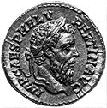
On Dec. 31, 192 Roman emperor (since 180) Commodus (b. 161), who is fond of dressing in lion skins and carrying a club like Hercules is drugged by his concubine Marcia, then strangled in his bath in the gladiator school by a wrestler named Narcissus working for impertinent prefect of the city of Rome Publius Helvius Pertinax (126-93) (son of a timber merchant in NW Italy who works his way up from centurion to prefect of a cohort, Rhine fleet cmdr., procurator of Dacia, senator, consul, and proconsul), who declares himself Roman emperor #19 (until 193) after fooling the Praetorians to think that Commodus had died of apoplexy after elevating him to the throne?

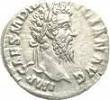

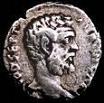
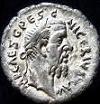
On Jan. 1, 193 the Senate ratifies the election of experienced, strict and frugal Roman emperor (since 192) Pertinax (b. 126), and flushes, er, brands the memory of Commodus with eternal infamy, taking away his honors and erasing his titles from public monuments, demolishing his statues, and dragging his body with a hook into the dressing room of the gladiators, but Pertinax insists on giving him the last rites, with Commodus' brother-in-law Claudius Pompeianus giving the oration; Pertinax gives his personal fortune to his wife and son, refuses to elevate them to Augusta and Caesar, rights the wrongs caused by Commodus (who leaves 8K pounds in the treasury, compared to 22M left by Pius), and holds frugal banquets which are ridiculed by those who are used to the elaborate shindigs of his predecessor; too bad, when they find he's going to reform them, the Pretorian Guards, led by Laetus begin to plot against him, and on Jan. 3 attempt to acclaim a senator as emperor, but he chickens out, then try again with consul Sosius Falco, whom Pertinax pardons; on Mar. 28 200-300 Praetorian Guards break into his palace and murder him, carrying his head back to camp on a lance; on Mar. 28 he is succeeded by Roman Sen. Marcus Didius Salvius Julianus Severus (Didius Julianus) (137-93) (relative of Antonine jurist Salvius Julianus), who is declared Roman emperor #20 after winning an auction at the Praetorian camp (25K sesterces per soldier) (6250 drachms) (200 pounds sterling), outbidding Sulpicius, father-in-law of Pertinax, who sees the latter's head carried into the camp on a lance; when the news spreads to the legions, civil war results, with Didius Clodius Albinus (150-97), gov. of Britain (since 192), Lucius Septimius Severus (146-211), gov. of upper Pannonia (Apr. 9) (the winner), and Gaius Pescennius Niger (140-94), gov. of Syria (Apr. 19) all declaring themselves emperor; Severus marches on Rome, causing Didius Julianus to be executed on June 1 by order of the Senate as he approaches within 50 mi.; Severus then strikes a deal with Albinus promising to make him Caesar, then begins the siege of Byzantium in autumn, meanwhile defeating Niger in the Battle of Cyzicus and Battle of Nicaea in Dec. In spring 194 Pescennius Niger (b. 140) is defeated by Lucius Septimius Severus at the Battle of the Cilician Gates in Issus (near modern-day Alexandretta, Syria), retreats S to Antioch, and is executed in Apr.; the Senate declares Septimius Severus as Roman emperor #21 (until 211), and he graciously has his Caesar Clodius Albinus made consul, dissolving the all-Italian Praetorian Guard and recomposing it with legionary veterans.

On Feb. 4, 211 Roman emperor (since 194) Septimius Severus (b. 146) dies in Eboracum (York) in Britain after doing a great job of increasing the influence of lawyers in the Roman admin., and is succeeded by his eldest son and Augustus Caracalla (Caracallus) (Marcus Aurelius Antoninus) (188-217) (nicknamed for the long Gallic cloak he wears) as Roman emperor #22 (until 217), beginning "six years under the Gallic cloak"; Severus' dying words to his sons: "Enrich the soldiers, despise everyone else"; upon his accession Caracalla gets his younger brother Geta (b. 189) elevated to Roman co-emperor #23, then gets him killed on Dec. 26, along with the jurist Papinian and 20K of his followers, and increases soldiers' pay, issuing a new coin, the Antoninianus, with a face value of two denarii but a weight of only 1-2/3 denarii to pay the difference.
***
On Apr. 8, 217 speaking of commode, Roman emperor (since 211) Caracalla (b. 188) is assassinated (in his cloak?) by a group of his officers while taking a shit en route to the temple of the Moon god of Harran in Carrhae (ancient Harran) in Mesopotamia outside the walls of Edessa, and is succeeded by Praetorian Prefect (a Mauretanian) Marcus Opelius (Severus) Macrinus (165-218) as Roman emperor #24 (until 218), who is suspected of his murder, becoming the first equestrian emperor, soon surrendering Caracalla's eastern gains and seeking to cut soldiers' pay, pissing them off.
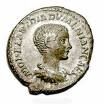

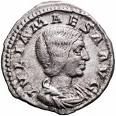

I quote in elegiacs all the crimes of Heliogabalus? On May 16, 218 rebel troops set up Varius Avitus Bassianus (b. 203) (grandnephew of Julia Domna, the Syrian wife of Septimius Severus) as a rival emperor in Emesa, Syria; on June 8 Roman emperor (since 217) Macrinus (b. 165) and his son Diadumenianus (-218) are KIA in Cappadocia by the rebel army, and teenie-bopper Sun god priest Elegabalus (Heliogabalus) (Varius Avitus Bassianus) (Marcus Aurelius Antoninus) (203-22), the last of the Antonines becomes Roman emperor #25 (until 222), changing his name to Marcus Aurelius to legitimize his rule, claiming to be Caracalla's son, going on to marry famous male athlete Zoticus, along with his slave Hierocles; he soon begins promoting the licentious cult of El-Gabal (Elagabalus) (Heliogabalus) ("El of the Mountain"), Sun god of his hometown (whose priest he has been since early youth), while his iron lady grandmother Julia Maesa (-226) really rules things, making him adopt his cousin Marcus Julius Gessius Bassianus Alexianus (Alexander Severus) (208-35), son of her sister Julia Avita Mamaea (181-235) - hey, king Tut did it? Elagabalus orders the built on the E side of the Palatine Hill to house the black conical meteorite holy to the faith, supposedly sent from Heaven and containing a rough picture of the Sun in its markings, incorporating the Roman Sun god Sol Invictus (Lat. "Unconquered Sun"); he forces senators to watch him dance around the altar to the sound of cymbals and drums, leading a big festival each summer solstice where he distributes food; too bad, he tries to place his god above Jupiter, and incorporate all other religions, even Judaism and Christianity, causing everybody to detest him? - the original Islam?



On Mar. 11, 222 Roman emperor (since 218) Elagabalus (b. 203) is murdered along with his mother Julia Soaemias (180-222) by the Praetorian Guards, and on Mar. 13 his 14-y.-o. cousin and adopted son Maurcus Aurelius Severus Alexander (208-35) becomes Roman emperor #26 (until 235) (youngest) with the help of his iron lady grandmother Julia Maesa and his mother Julia Mamaea, who establish a regency committee of senators, with jurists Paulus and Ulpian giving advice; he abandons the Palatine Hill as the official residence of the Roman emperors.

My horse is named Stinky, ain't he a beauty, mom? In Mar. 235 after he is forced to buy peace from the Alamanni on the Rhine, Roman emperor (since 222) Alexander Severus (b. 208) and his mother Julia Mamaea are assassinated by disgruntled soldiers in Mainz; the Severan Dynasty comes to an end, beginning the Imperial Crisis of the Third Cent. (ends 284), a period of military anarchy marked by internal civil war, external invasion, and economic near-collapse, causing institutional changes that end the Classical World and begin the Medieval World; the Roman Empire becomes unstable until 284, with would-be emperors coming mainly from the martial Danubian provinces, while the govt. is bankrupt, currency is worthless, and inflation rages, along with plagues, causing depop. and the decline of cities and the urban elite; after the Rhine legions acclaim him, giant Thracian peasant Gaius Julius Verus Maximinus Thrax (the Thracian) (173-238) becomes Roman emperor #27 (until 238), the first "barracks" (soldier) emperor, who never sets foot in Rome, and begins the Thraxian Persecution of the Christian Church directed at its heads - like spraying Raid on stag cockroaches while the egg nests are safe behind the walls?





Five in one is for oil not emperors? On Mar. 22, 238 Maximinus' procurator is assassinated, and Marcus Antonius Gordianus (Gordian) I (159-238) and his son Gordian II (192-238) are proclaimed Roman co-emperors #28 and #29 in Africa; on Apr. 2 the Senate recognizes them, but they are killed on Apr. 12 by the army of Capelianus, gov. of Numidia (prefect of Mauretania), loyal to Maximinus; on Apr. 22 with the invasion of Maximinus Thrax imminent, a group of 20 senators elects two more emperors, Marcus Clodius Pupienus Maximus (164-238) (Roman emperor #30) and Decimus Caelius Calvinus Balbinus (165-238) (Roman emperor #31), and under public pressure they name the future Gordian III (son of Gordian I's daughter) as Caesar; Pupienus heads for Ravenna to meet the invading army of Maximinus, whose own soldiers murder him and his son on June 24 while sieging Aquileia, presenting their heads to Pupienus, who returns to Rome, finding a civil war brewing; too bad, Balbinus and Pupienus become distrustful of each other, and are murdered on July 29 by the Praetorian Guards after they refuse to let their own German guard come to their aid; the Praetorians proclaim teenie Gordian (Gordianus) III (225-44) as Roman emperor #32 (until 244). The Romans are in turmoil, so you all go thataway and we'll go thisaway? In 238 the first major Gothic invasion of Roman territory occurs at the city of Histria (Istros) (Sinoe) on the Black Sea coast at the mouth of the Danube River, spreading into Asia Minor and the Balkans; the Romans begin paying tribute to them (until 245); at this point the Goths divide along the Dniester River into the Visigoths (Thervings) (Western Goths) and Ostrogoths (Greutungs) (Eastern Goths).


On Feb. 11, 244 after driving the Persians out of Syria and invading Iraq, Gordian III is defeated and KIA by the Persians at the Battle of Misiche 40 mi. W of Baghdad (modern-day Fallujah), renaming the city Peroz-Shapur ("victorious is Shapur"); the Romans try to cover it up by claiming that he died near Circesium on the Euphrates River 250 mi. upstream, and that they built a cenotaph nearby in Zaitha; Roman emperor (since 238) Gordian III (b. 225) is succeeded as Roman emperor #33 by Marcus Julius Severus Philippus (Philip I the Arab) (204-249) (who is suspected of engineering Gordian III's death by cutting off supplies and/or fomenting discontent), and negotiates a peace treaty with the Persians, paying them 50M sesterces and ending the Second Roman-Persian War (begun 241); he makes his 7-y.-o. son Philip II (237-49) nominal co-ruler.

In 249 Pacatianus and Iotapianus are defeated and KIA, and Roman emperor (since 244) Philip the Arab (b. 204) sends Danube native and suffect consul Decius (Gaius Messius Quintus Traianus Decius) (201-51) to restore discipline among the Danubian troops, but they revolt again in the spring, proclaiming Decius emperor; in June Decius defeats and kills Philip the Arab in Verona, and becomes Roman emperor #34 (until 251), the first from Illyricum; Philip's son Philip II (b. 237) is murdered by the Praetorian Guards in Rome after they learn the good news; Iotapianus' body is delivered to Decius in the summer in Rome.
In 250 Decius elevates his sons Quintus Herennius Etruscus Messius Decius (227-51) and Hostilian (Gaius Valens Hostilianus Messius Quintus) (-251) to Caesars (Roman emperors #35, #36). In 250 Decius defeats Gothic king Kniva, then is defeated at the Battle of Beroea, and is forced to flee for safety; meanwhile Julius Valens Licinianus proclaims himself emperor at Rome, but is executed within a few days.

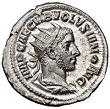
In Jan. 251 the 15-year Cyprian Plague (ends 266) begins, killing up to 5K a day in Rome, pissing off Roman emperor (since 249) Decius (b. 201), and causing him to blame the Christians for failing to recognize him as divine and incurring the wrath of the gods, launching the Decian Christian Persecution, the first gen. empire-wide persecution in their history, incl. all who will not sacrifice to him; the "persecution" is a law requiring all citizens to sacrifice to the state gods and to be in possession of a libellus, a certificate from a temple confirming the act; some claim this proves that his hated enemy Emperor Philip I the Arab must have been the first Christian emperor - you have to carry a libel around with you that says you're a pagan doomed to Hell or you die? In 251 Decius pushes the Carpi out of Dacia, then the Ostrogoths under king Cniva invade Moesia Inferior (S of the Danube River), where Decius' son Herennius is killed outside Philippopolis; Decius proclaims that the death of one soldier is not a great loss to the republic, then chases conniving Cniva, who is making off with his spoils, and is defeated and KIA along with his son Herennius Etruscus on July 1 at the Battle of Abrittus (Forum Terebronii) in the Dobruja (Moesia Inferior) about 60 mi. NE of Philippopolis after being tricked in June into fighting from an inferior position before relief can arrive, the Goths pretending to be defeated and surrounded but refusing to surrender, causing the Romans to have to stage a final attack, which backfires; Christian-persecuting Decius becomes the first Roman emperor to be killed in a battle with foreign invaders (guess who celebrates?); his entire Roman field army is wiped out along with him; St. Cyprian notes that the gen. opinion of the pop. of Rome is that the collapse of the Roman Empire is nigh. Titus Julius Priscus, gov. of Macedon proclaims himself Augustus at Philippopolis towards the end of the year, with Gothic support, but the Senate declares him a public enemy, and Gaius Vibius Trebonianus Gallus (206-53) becomes Roman emperor #37 (until 253) after the army of Moesia proclaims him, and names Decius' son Hostilian as co-emperor, while raising his own son Gaius Vibius Volusianus (-253) to Caesar (Roman emperor #38); he then signs an unpopular peace treaty with the Goths, letting them get away with their loot so that he can more quickly return to Rome and solidify his power; he finds Rome suffering from the plague, and Hostilian dies in July, causing Gallus to make his son Volusianus co-emperor.


In 252 the Persians under Shapur I attack the E frontier in a dispute over control of Armenia, defeating the Romans at the Battle of Barbalissos, and capturing Nisibis. Marcus Aemilius Aemilianus (207-53), gov. of Moesia (a Moor) refuses to pay tribute to the Goths as agreed by Gallus, then defeats them, and is proclaimed emperor by his troops - the Roman Barack Obama?


In July 253 Roman emperor (since 251) Gallus (b. 206) and his son Volusianus are defeated by Aemilianus at the Battle of Interamna Nahars on the Flaminian Way; after they flee, they are murdered by their own guards at Forum Flaminii by Aug.; Aemilianus becomes Roman emperor #39, and marches to Rome, where the Senate grudgingly recognizes him; in Sept. Valerian, cmdr. of Roman forces beyond the Alps (Rhaetia) comes to Rome with his army, causing Aemilianus' spooked troops to murder him, and Valerian I (Gaius Publius Licinius Valerianus) (193-260) becomes Roman emperor #40 (until 260), with his son Publius Licinius Egnatius Gallienus (218-68) as co-Augustus (Roman emperor #41) (until 268); Valerian I then decides to split the Empire, remaining emperor of the valuable East, with Gallienus as emperor of the chickenshit West, ruling from Treves with his infant son Salonius.
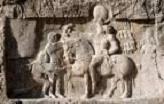


In 259 after Roman emperor (since 253) Valerian I (b. 193) and his 70K-man army reclaim the Syrian provinces and close in on precious Edessa, the Battle of Edessa sees the entire Roman force captured or killed by the Persians under king Sapor (Shapur) I, who suffer minimal casualties of their own; Valerian I is captured, and Sapor I gets his jollies by publicly humiliating and using him as a stepping-stone to mount his horse, after which he is killed by next year, then skinned and stuffed with manure and mounted in a Persian temple as a trophy; the Roman POWs are used in engineering projects around Susa; the Mandylion (Gr. "towel") of Edessa, the alleged Shroud of Christ is allegedly carried into battle by the Persians, who give it the credit for their incredible V; in 944 it is captured by the Byzantines in Muslim-ruled Edessa and taken to Constantinople with a big parade on Aug. 15, where it remains until 1204?; Gallienus continues to reign alone, completing the process of substituting equestrians for senators as legion cmdrs. and govs; meanwhile the Period of the Thirty Tyrants (ends 268) begins as Roman legions throughout the empire crown their own emperors; Roman gen. Marcus Posthumus revolts, and forms his own empire out of the Gallic provinces (Gaul, Britain, Spain); the success of the barbarian incursions cause cities in the Roman Empire to reverse cents. of arrogance and begin building walls and sink into a siege mentality; nervous emperor Gallienus issues an edict of toleration of the Christians, giving the Church a legal existence and establishing a peace with it that lasts 40+ years (until 303).

In Sept. 268 Roman emperor (since 253) Gallienus (b. 218) is assassinated by his own troops outside Mediolanum (Milan) as he is sieging the pretender (one of the Thirty Tyrants) Aureolus (Gallienus' cavalry cmdr. stationed in Milan), who in turn is slain by Illyrian pretender Claudius II (Marcus Aurelius Valerius Claudius II Gothicus) (214-70), who becomes Roman emperor #42 (until 270); in Sept. he defeats the Ostrogoths at the Battle of Naissus (Nisch) (Nish) in Serbia, gaining the title Gothicus; meanwhile 100K Alamanni break through the Roman frontier at the Brenner Pass, and in Nov. Claudius II's 35K-man Roman army defeats them at the Battle of Lake Benacus (Garda) in N Italy, killing or capturing more than half of them and chasing the rest back over the Alps; he then defeats more Goths at the Battle of Marcianopolis on the right bank of the Danube River in Lower Moesia, and defeats the S Gauls, bringing the Iberian provinces back into the empire, all of which gain him the title Gothicus; meanwhile more Romans repulse more Goths from Asia Minor and Greece, allowing Athens to recover its stature as the intellectual center of the empire and the seat of pagan culture (until 395).



In Sept. 270 after plague breaks out among the Goths and spreads to the Romans; Roman emperor (since 268) Claudius II (b. 218) dies of the plague, and his brother Marcus Aurelius Claudius Quintillus (-270) becomes Roman emperor #43, but his soldiers in Sirmium revolt and declare Claudius II's associate Aurelian (Lucius Domitius Aurelianus) (214-75) as Roman emperor #44 (until 275), inheriting an empire facing the sudden loss of many provinces plus major damage done to others; Quintillus is deserted by his troops and defeated, and commits suicide in Sept. after reigning 17 days; Claudius II's associate Gen. Domitianus (-271) is proclaimed rival emperor, but is killed next year. Sell your house fast, call Ugh? By 270 despite the recent Vs against the pesky Goths, the Roman frontier begins to break down completely, causing Singidunum (modern-day Belgrade) to find itself on the limes, one of the last remaining major strongholds, causing Aurelian to order new walls constructed in the Po River Valley to defend the formerly open city of Rome for the first time; the 12-mi. 54-ft. Aurelian Wall is built circling Rome to the E, eventually enclosing the Baths of Diocletian on the N, and the Lateran and the Baths of Caracalla on the S, with 14 gates (finished 275) - the neverending pasta bowl?

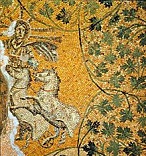
In Feb.-Mar. 274 C.E. Roman emperor #44 (since 270) Aurelian (Lucius Domitius Aurelianus) (214-75) defeats pretenders Tetricus I and Tetricus II at the Battle of Chalons-sur-Marne in Gaul, sparing their lives and setting daddy up as gov. of S Italy, and reintegrates Gallia (Gaul) and Britannia (Britain) into the Roman Empire, then celebrates a 2nd triumph in Rome, adorned by his trophies Zenobia and Tetricus; on Dec. 25 he orders the cult of Sol Invictus (Lat. "Unconquered Sun") made official, and inaugurates the Temple of Sol Invictus in Rome; all emperors go on to celebrate his birthday until Constantine, who goes Christian, after which the cult lasts until the 5th cent.; the last inscription referring to Sol Invictus is made in 387; Aurelian eestablishes trust in the monetary system, single-handedly restoring the Roman Empire while making Dec. 25 a commercial holiday, giving the Christians a burning desire to steal the day for their Son-god's b-day?

In Sept. 275 after suppressing revolts in Gaul, fighting invading barbarians in Vindelicia in S Germany, and marching to fight the Persians, Roman emperor (since 270) Aurelian (b. 214) is assassinated in Caenophrurium en route to Byzantium after a plot by corrupt officials he was trying to purge turns the Praetorian Guard against him; coincidentally or not, he was about to begin a persecution of the Christians, which never happens; on Sept. 25 former consul (273) Marcus Claudius Tacitus (200-76) is appointed Roman emperor #45 (until 276) against his will by the swash, er, buckling Senate; meanwhile what's left of Dacia collapses after the distraction of its defenses to Moesia and Thrace.
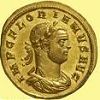

In spring 276 after the Goths, Alans, and Heruli, who had been gathered by Aurelian for his Eastern campaign mutiny at the news of his death and begin plundering Asia Minor, Roman emperor (since 275) Tacitus (b. 200) defeats them, gaining the title of Gothicus Maximus, but he dies in June in Cappadocia, and his half-brother, Praetorian prefect Marcus Annius Florianus (-276) assumes the purple as Roman emperor #46, but rival Marcus Aurelius Equitius Probus (232-82) (an Illyrian), is proclaimed Roman emperor #47 by the Eastern armies (until 282), and after reigning 88 days Florid Anus is murdered by his own troops near Tarsus when they see how Big Probe's force is and how hot the heat is (didn't I see that porno flick?) (a prophesy is circulated that Florianus' descendant will one day restore the Roman Senate and rule as far as Ceylon?); Probus then goes to Rome to be confirmed by the Senate and hunt down and execute the murderers of his benefactor Aurelian; meanwhile the Goths raid Pontus, and are forced by Probus along with the Franks and Alamanni back over the Rhine after doing a lot of damage.

You know the rules but don't care? In spring 282 after strengthening the Danube frontier, quieting Asia Minor, and suppressing pretenders in Gaul, Probus heads for Sirmium on the Danube River to prepare a campaign against the Persians, whom he think he can now take on; too bad, his troops in Rhaetia and Noricum on the Upper Danube balk at being made to do civil engineering and agricultural work to repair the damage to the empire, and in Sept. proclaim Praetorian prefect Marcus Aurelius Carus (230-83) (an Illyrian?) as Roman emperor #48 (until 283), and in late Sept. Roman emperor (since 276) Probus (b. 232) is murdered by his own troops near Sirmium; carefree Carus tells the happy troops to quit planting vines and begins a successful campaign against Persian Shah Bahram (Varahan) II, causing him to abort his Eastern campaign against the Sakae.


In July-Aug. 283 after starting the Fourth Roman-Persian War and conquering Mesopotamia and taking Ctesiphon, Roman emperor (since 282) Carus (b. 230) dies mysteriously beyond the Tigris River one day after a violent storm (hit by lightning?), ending the Persian campaign, and his son and co-Augustus Numerian (Marcus Aurelius Numerius Numerianus) (-284) becomes Roman emperor #49 of the East (until 284), while his other son and co-Augustus Marcus Aurelius Carinus (-285) becomes Roman emperor #50 of the West (until 285).

In fall 284 after ambitious Flavius Constantius Chlorus backs Diocletian in a coup, Roman emperor (since 283) Numerian is murdered, and the Eastern army proclaims Diocletian (Gaius Aurelius Valerius Diocletianus) (Diocles) (244-312), cmdr. of the imperial bodyguard (since 283) and former Dux Moesiae (cmdr. of the Lower Danube) (an Illyrian of low birth), who in Nov. becomes Roman emperor #51 (until 313), ruling from Nicomedia in Bithynia (Asia Minor), adopting the pomp and ceremony of the Persian court, insisting on being called dominus (lord), with everything surrounding him deemed sacred, and dressing in purple and gold robes with jeweled slippers and a diadem on his head, while subjects prostrate themselves in his august presence; of course he persecutes the pesky Christus-only Christians; the Imperial Crisis of the Third Cent. (begun 235) ends; the imperial court (comitatus) incl. a domestic staff headed by a eunuch, a magister memoriae (master of records) and other officials supervised by the magister officiorum; the imperial guard (scholae) furnishes 40 hand-picked candidati (white uniforms) for the emperor's bodyguard; the officer training corps (protectores) furnishes new high officials - shove that old slum Rome?
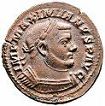
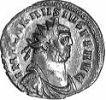
In 286 after determining that it is too large for one man to run, Diocletian partitions the Roman Empire, choosing as his colleague the Illyrian Maximian (Marcus Aurelius Valerius Maximianus) (250-310) as Caesar of the West (Roman emperor #52); Maximian is then kept from being made jealous by being elevated to Augustus on Apr. 1 (until May 1, 305), ruling from Mediolanum (Milan), while Diocletian assumes the title Jovius, and Maximian the title Herculius - Happy and Well-Hung? The Bagaudae (vagrant rebel German pirates) under Amandus and Aelianus are defeated by Maximian in Gaul with the help of Roman fleet cmdr. (based in Gessoriacum, modern-day Boulogne) Mausaeus Carausius (Carasius) (-293) (a German), who is caught stealing their spoil, hears of a death warrant out on him, lets it go to his head, and seizes Britain, declaring himself Augustus, hoping for help from Germans settled in England, and severs Britain from the Roman Empire for seven years.




In 293 Diocletian attempts to reform the admin. of the empire, dividing it into E and W parts, each with two prefectures or divisions (Gaul and Italy in the W, Illyricum and the East in the E), each with its own praetorian prefect, further divided into several dioceses under vicars (vicarii); he appoints Serbian-born Constantius I Chlorus (the Pale) (Flavius Valerius Constantius Chlorus) (250-306) (father of Constantine I the Great) as 2nd Caesar of the West, and Galerius (Gaius Galerius Valerius Maximianus) (250-311) as 2nd Caesar of the East, beginning the Roman Tetrarchy; both Caesars have to marry one of Diocletian's daughters, and Constantius I has to divorce his sure-to-get-gas wife (St.) Helena (248-329) (alleging non-patrician origin) before marrying candy-pants Theodora Augusta; Galerius governs most of the Balkan provinces, while Constantius I governs Gaul, immediately going after Carausius and driving him back to Britain, where he is murdered by his minister Alectus (-296), who dons his purple - give it to me momma?

On Feb. 23, 303 the Diocletian (10th) Christian Persecution, the last and most terrible (to hear them talk?) is officially declared by Roman emperor (284-305) Gaius Aurelius Valerius Diocletianus (Diocletian) (Diocles) (244-312) (by Galerius?); too bad for pagans, Constantius slacks off in his Western prefecture, finally stopping in 306, although it continues in the East until 313; wealthy Christians in N Africa merely have to surrender their scriptures, causing the poorer Christians to call them traitors and lobby to have them permanently excommunicated; St. Pantaleon (b. 275) (Gr. "all compassionate") is allegedly martyred in Nicomedia, Bithynia.


On May 1, 305 Roman emperor (since 284) Diocletian (b. 245) resigns, along with (at Diocletian's behest) Maximilian, and Constantius I Chlorus (the Pale) (250-306) (father of Constantine I the Great) and Galerius Maximianus (250-311) become Augusti (Roman emperors #53, #54); Diocletian and Galerius select new Caesar Flavius Valerius Severus II (d. 307) (Roman emperor #55) under Constantius, receiving the prefecture of Italy, and Galerius Valerius Maximinus Daia (270-313) (Roman emperor #56) (308-13) under Galerius (whose half-sister is Daia's mommy), who receives Syria and Egypt; Maximian's son Maxentius and Constantius' son Constantine are passed over.


On July 25, 306 Roman emperor (since 305) Constantius I Chlorus (b. 250) dies in Eburacum (York), Britain, and his soldiers proclaim his son Constantine I (the Great) (Flavius Valerius Aurelius Constantinus) (271-337) as Augustus (Roman emperor #57) at Eboracum, where he had earlier fled from Galerius to his father, but makes an agreement with Galerius to become Caesar, while Galerius raises Severus II to Augustus; Severus II announces plans to abolish the Praetorian Guards; on Oct. 28 Maximian's son Marcus Aurelius Valerius Maxentius (279-312), with the support of the Senate, Praetorians, and people of Rome is hailed as princeps (Roman emperor #58) (until 312), and he calls his father out of retirement to resume as Augustus with himself as Caesar; Severus II marches on Rome, his troops are bribed and rebel, he surrenders to Maximian, and is later executed by Maxentius; Maximian seeks refuge from Galerius in Constantine's court in Gaul, where the latter recognizes him as senior Augustus and plans to marry his daughter Fausta.

In early summer 307 Galerius marches on Italy, but is forced to withdraw after his troops prove disloyal. Constantine I relocates to Augusta Treverorum (Trier), and marries the prime heifer flavor of the month Flavia Maxima Fausta (293-326), daughter of Maximian, putting away Minervina, mother of his 1st son Crispus.


In 308 Maxentius takes the title of Augustus, rulng in Italy for the next four years, and Maximian flees to Constantine again; in Nov. at the insistence of Galerius, the Roman emperors meet in the Conference of Carnuntum, presided over by Diocletian, where Maximian is forced to abdicate; Valerius Licinianus Licinius (265-325) is appointed Augustus of the West (Roman emperor #59) in Severus' place, and Constantine is ordered to return to the rank of Caesar, but refuses, causing Galerius to give him and Daia the rank of fili Augustorum, which doesn't satisfy them; Maxentius' Praetorian African prefect Lucius Domitius Alexander (-311) rebels and cuts off the grain supply to Rome, and Maxentius is declared a public enemy.
In July 310 after attempting another revolt, Maximian (b. 250) is killed by Constantine in Massilia (Marseille), and Daia and Constantine are finally given the rank of Augustus - they'll do better in school now?
On May 5, 311 Roman emperor (since 305) Galerius Maximianus (b. 250) dies of disease near Serdica, and Daia seizes Asia Minor, leaving the Balkans to Licinius, with whom Constantine I makes an alliance; Daia begins a war on the Christian church of Armenia.
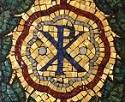
In 312 Constantine I declares himself Augustus, invades Italy from Gaul, and on ? defeats Maxentius' general at the Battle of Augusta Torinorum (Verona). --it happens again, or, If you want them hippie dropouts to work for the system, give them a vested interest and they'll line up to get haircuts and helmets? On Oct. 27 the night before Saxa Rubra (really sometime later and backdated as part of a govt. coverup?), while praying to Sol Invictus, Constantine I allegedly has a Vision of Christ, who tells him to put the letters chi and rho (the Christian cross) on his soldiers' shields, saying "Hoc signo victo eris" (By this sign you will conquer), or "In hoc signo vinces", initials IHS, a contraction of the Greek spelling of Jesus with E changed to H, also the initials of Iesus Hominum Salvator (Jesus, Savior of Men); on Oct. 28 (Saxa Rubra) the Battle of the Milvian Bridge (Ponte Milvio) (Saxa Rubra) on the Tiber River near Rome sees Maxentius defeated and drowned by the heavily-outnumbered chi-rho-wearing soldiers of Constantine (who carries the Spear of Christ passed down from Roman soldier martyr St. Maurice?), after which the Roman Senate declares Constantine to be Augustus and pontifex maximus; in 315 the Arch of Constantine is erected between the Colosseum and the Palatine Hill in honor of the V, which is later celebrated by an annual horserace on July 5-7 called L'Ardia Di San Constantino; after this new voodoo causes his armies to be victorious, never mind the contradiction in killing for Christ, it's pagans killing pagans this time, Constantine I becomes sole ruler of the Western Roman Empire, and begins making Christianity its official religion, with the Church as an organ of the state and himself as pagan pontifex maximus, what a politician, converting his mother Helena and breaking with previous emperors by adopting a youthful civilian image in official portraits; he disbands the Praetorian Guards and transfers all military functions from the prefects and their vicars to a magister militum, then divides the dioceses into halves, and subdivides them into provinces, putting them under control of praesides (equestrian govs.); Italy becomes a province, with districts supervised by senatorial correctores; Crete becomes a prefecture of Illyria; the Roman army numbers 500K-730K total.
In Jan. 313 Constantine I and Licinius issue the Edict of Milan (Edict of Toleration), ending the Great Persecution, and making Christians eligible for public office, with allegedly neutral language such as "whence any divinity whatsoever in the seat of the heavens may be propitious and kindly disposed to us and all who are placed under our rule" and "we thought to arrange that no one whatsoever should be denied the opportunity to give his heart to the observance of the Christian or any religion which he should think best for himself", but in reality establishing Christianity as the de facto official religion of the Roman Empire, which is only 15%-20% Christian, but has a highly organized Church nursing centuries of grudges, and besides, the old emperor worship has failed miserably and is dying out, and the old glue that held Rome together was that all people, whatever other gods they worshiped, also worshiped the emperor, and them pesky Christians never would, so why not legalize it to get them into the system? (how else to get them tons of Christian hippies to quit protesting and dropping out, get that butch cut and join the military to fight for Rome than to stamp a big Red Cross on it and tell them to conquer in this sign?); at first the empire remains officially multireligious, and the bad habits of Christians are merely decriminalized, but the fanatical, intolerant Crucifixians are never satisfied, and once they get on the playing field they never stop working to get the tables turned on the pagans, and ultimately destroy them without mercy, but in stages, starting with the official Christian State Church granting them equal (but not really?) rights, and Constantine shifting imperial largess to Christian churches and favoring Christians in the govt., wooing the upper classes (if you know what's good for you, you will go with the new system?); now that the Christians are on the government dole, filthy lucre corrupts them like anybody else, and as a taste of the future there is at once a fight between the rigorist sanctimonious Donatists, followers of bishop Donatus (-355) of Carthage, and the moderates over the lapsi, those who had lapsed during the years of persecution and want rebaptism in the faith; the Synod of Rome in the Lateran Palace rules in favor of the moderates, but the Donatists appeal to Constantine to keep his donations coming? In Feb. Constantine I and Licinius meet in Milan; Lucinus marries Constantine's half-sister Constantina; Maximinus Daia leaves Syria and attacks Licinius' troops at Byzantium in Apr., captures it, then moves to Heraclea near Adrianople (Adrianopolis), where Licinius defeats him on Apr. 30 at the Battle of Campus Ergenus; Daia flees to Nicomedia, then to Tarsus, where he dies in July. Now that Christianity is PC, Greek-speaking Eusebius Pamphili of Caesarea (264-340) is released from prison and elected bishop of Caesarea, where he develops into a heck of a historian, establishing the tradition of Christian chronography.
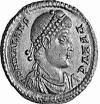
On Oct. 8, 316 after Constantine I grows jealous of Licinius and they go to war, Constantine I gets the better of Licinius at the Battle of Cibalae in Pannonia, after which on ? the Battle of Campus Ardiensis in Thrace is a pure D for Licinius; in Dec. needing a new team, Licinius appoints Aurelius Valerius Valens (-317) as his fellow Augustus.



On Mar. 1, 317 a truce is declared at Serdia (Sofia), and Licinius cedes all of his European provinces and all of the Balkans except Thrace to Constantine I; Licinius is forced to execute Valens; Constantine I announces the appointment of three new Caesars: Constantine I's eldest son Flavius Julius Valerius Crispus (305-26) (Roman emperor #60) (Gaul), Licinius' son Licinius II (314-24) (Roman emperor #61), and Constantine I's newborn son Flavius Julius Constantius Junior (Constantius II) (317-61) (Roman emperor #62).
In 321 Archbishop Alexander of Alexandria convenes a council which condemns and excommunicates his bishop Arius, who takes refuge with Arian bishop Eusebius of Nicomedia (-341), a distant relation of Constantine I the Great, who had used his connections to get his promotions to bishop of Berytus (Beirut), Nicomedia, and later (338) Constantinople; Pope Silvester, who allegedly cured him of leprosy gets Constantine I to make Sunday, the day of the Sun god Sol Invictus (official symbol the cross) the official Christian sabbath, exempted from being judicial, with its observance made a legal duty, becoming the first big step toward making Christianity the Hoover Vacuum Cleaner of the Roman Empire, absorbing all other pagan religions to get everybody to join and thus become "catholic" (Gr. "universal"); meanwhile pesky Bible-thumpers quote the Bible as proclaiming Saturday as the sabbath, but learned Catholics reply that Christ's resurrection changes it forever for Christians.
On ?, 324 Constantine I defeats Licinius at the Battle of Adrianopolis (Adrianople) in Thrace (130 mi. NW of Constantinople), and again on Sept. 18 at the Battle of Chrysopolis on the Bosphorus; his son Crispus commands Constantine I's fleet; Constantine I breaks his vow and executes both Licinius (b. 265) and his son Licinius II by next spring. On Nov. 8, 324 after getting pissed-off at the opposition of the Roman Senate to his courtship of Christianity, Constantine I announces his decision to transform the Greek city of Byzantium into the new crackalackin' mamajama holy Christian capital city of New Rome, AKA Constantinople, which is already laid out on seven hills, just like Rome; construction begins on the W wall. On Nov. 13, 324 Constantine I's darling boy Constantine Junior (b. 317) is made Caesar in Nicomedia.



We come to the big year 325, the Tribus Unum (From Three, One) Year, which starts off with a shoe-banging Khrushchev type at the Catholic U.N. General Assembly, and turns into the biggest year in the history of Church doctrine. After trying in vain to get the warring parties to rise above their bitter Athanasius-Arius Controversy over the pre-existence of Christ and the Trinity (ultimately a theological dispute over homoousion vs. heterousion) by citing the example of the wise Greek philosophers in a Letter to the Catholic Hotheads, Roman Emperor Constantine I, with the official title of pontifex maximus (maximum bridge-builder for the people to God and therefore equal to the apostles, giving him the right) convokes the first ecumenical (universal) (authority second only to Scripture) Nicene Council (Council of Nicaea) in Nicaea (modern-day Iznik) in Bithynia (NW Asia across the Bosphorus Straits from his under-construction city of New Rome AKA Constantinople), presided over by his favorite (pro-Trinity) bishop Osius of Cordova in Spain to decide the issue, with the Trinity side championed by archdeacon Athanasius (296-373) of Alexandria, and the anti-Trinity side by way older and higher-ranking presbyter Arius (250-336) of Alexandria, and Eusebius of Nicomedia (-341); James of Nisibis and a bishop from Persia attend; only about one-third (318) of the episcopoi (bishops) in the Roman Empire show up, with the attendants and servants beefing up the assembly to 1.5K-2K, which is conducted in Greek and presided over by the emperor, complete with his Roman bodyguard (although he is not a baptized Christian yet); the Church only sends seven official delegates, incl. two presbyters representing the bishop of Rome (pope); the debate goes on for two mo., with Arius uttering the immortal soundbyte "The Son of God was a creature, made from nothing; there was a time when he had no existence; he was capable of his own free will of right and wrong; were he in the truest sense a son, he must have come after the Father, therefore the time obviously was when he was not, and hence he was a finite being", causing many to stick their fingers in their ears and run out, while St. Nicholas of Myra (270-346) hits him in the kisser; Eustathius the Great of Antioch (270-360) gives a great anti-Arian speech; finally Osius gets big-fish-in-a-small-pond layman (still really pagan and faking it?) Constantine in a back room and talks him into backing the T-side, and Der Fuhrer publicly announces that the bishops are free to vote any way their conscience dictates, only face deposition and exile to the butthole of the empire if they vote Arian; no surprise, Arius and his "Ariomanites" (Arians) are condemned by a 316-2 vote, which incl. 15 flip-flopping Arians, and 100+ Semi-Arians (who believe in a "similar" substance, homoiousion, and slide by for the time being under the don't-ask-don't tell policy?); there is actually no official vote, only a document called the Nicene Creed, the first official test of Christian orthodoxy, which makes the Trinity (Consubstantialism) (Homoousion) an official article of faith for good Roman Catholics, and which all bishops must sign or else pack their toothbrush and lose their official govt. position and income and face exile; as there is no Holy Inquisition, Arians aren't burned at the stake but allowed to run loose making converts, incl. Constantine's son and future emperor Constantius II, further fragmenting into 18 different flavors; for not signing the Nicene Creed, Arius and Eusebius of Nicomedia are exiled to a remote province of Illyricum (Illyria), and labeled as Porphyrians, their writings burned, and a death penalty proclaimed for possessing them; meanwhile Constantine's favorite sister secretly supports the Arians and works on his mind, eventually turning him into an Arian; after the council ends, Constantine issues a Letter to the Churches, declaring that all churches are to observe Easter as well as the sabbath on his pet pagan Sunday; the Quartodecimans (14th Day Christians) (observing Easter on the Jewish Passover of Nisan 14, citing Leviticus 23:5) are declared heretical, and their numbers begin to decline; the Council pub. the soundbyte: "For it is unbecoming beyond measure that on this holiest of festivals we should follow the customs of the Jews. Henceforth let us have nothing in common with this odious people... We ought not, therefore, to have anything in common with the Jews... We desire our dearest brethren to separate ourselves from the detestable company of the Jews. How, then, could we follow these Jews, who are almost certainly blinded?"; Canon 17 of the council forbids the clergy from engaging in usury, defined as charging interest higher than 1% per mo; the Nicene Council causes the Paulicians to flee to Armenia in the Taurus Mts., where they practice beliefs resembling primitive 1st cent. Jewish Christianity, rejecting many Catholic dogmas, incl. worship of the cross, the Virgin Mary, the Mass, and confession - the first Protestants?
In 326 Constantine I orders the execution of his eldest son Crispus and his wife Fausta by means of suffocation in an overheated bath after they are accused of hooking up; Constantine II is put in charge of Gaul. Constantine I's mother James Cameron, er, St. Helena makes a 2-year pilgrimage to the Holy Land, and recovers the True Cross of Christ, allegedly found in a cave on May 3 and distinguished from several others because of an alleged miracle; Constantine and Helena raze the Roman bldgs. in Jerusalem and build the Church of the Holy Sepulchre (Sepulcher); the Finding of the Holy Cross Festival is later celebrated each May 3. After most Christian documents were destroyed in the 303 Diocletian Persecution, Constantine I orders orders confiscation and destruction of all works challenging Christian orthodoxy, incl. pagan works referring to Jesus; he orders a fixed income to be allocated to the Church, and installs the bishop of Rome in the Lateran Palace.
In 327 Eusebius of Nicomedia writes to Constantine I asking him to let him and Arius return from exile, and unbaptized-but-Arian-leaning Constantine I allows it, making Eusebius his chief spiritual advisor, learning how to be a good Arian.
On Nov. 26, 329 Constantine I lays the foundations of New Rome (Roma Nova), later called Constantinople; meanwhile his real capital is in Nicomedia until the plaster and paint dry; Constantine, who detests Jews and calls their religion a bestial sect ("sect nefaria") gets laws passed restricting Jewish rights, forbidding them from performing the rite of circumcision on slaves or to own Christian slaves, with the death penalty for converting to Judaism or for Jews who aid them, and forbidding marriages between Jews and Christians, with a death penalty for the Jew partner; other laws protect a Jewish convert to Christianity; the law prohibiting Jews from entering Jerusalem is also renewed?
Lucy and Ricky ditch run-down New York for bright sunny L.A.? On May 11, 330 after using the spoils from pagan temples in Greece and Asia to pay for it, the new improved city of Byzantium commanding the strategic Bosphorus Straits, renamed New Rome is formally dedicated by Roman Emperor Constantine I as a new Rome 800 mi. E of the old Rome; it becomes known as Constantinople (Constantine's town), and becomes the foundation of the busy-bee Byzantine Empire, which lasts 1123 years (until 1453); the city's longtime crescent symbol, of Diana, goddess of the hunt (Hecate, goddess of the crossroads?) is kept, with the star symbol added; the myth that Constantine I Da Great was divinely appointed by God to found the city causes it to develop a mythical aura which is later used to scare off invaders, and it is usually referred to as Great City (megalopolis), Queen City (basileuousa), or simply The City (polis); located at the crossroads of the trade routes between Europe and Asia at the hub of the great eastern trade centers of Ephesus, Antioch and Alexandria, it is within striking distance of the Danube and the eastern front, and close to the Balkans where the finest soldiers come from, plus it's at the entrance to the Bosphorus on a point of land jutting out from Europe separating the Sea of Marmora on the W from the long natural Golden Horn harbor on the east, which is a natural defense point; after finally being conquered by the Muslims in 1453, it is later (1930) renamed Istanbul (Gr. "eis ten polin" = "into the city"); Constantine founds a new Roman govt. in Constantinople complete with a Roman-style Senate (although both are limited to governing the city) and two annual consuls, and lures leading Roman citizens to move in by offering them exact reproductions of their homes and palaces back in Rome; to attract the hoi poloi he begins offering free circuses and 80K loaves of bread a day; he issues the new gold solidus coin, which reestablishes monetary stability and remains the standard coinage of the Eastern Empire until 1070; there are 72 coins per lb. of gold, compared to 60 in Diocletia's aureus; intending New Rome to be the Christian capital of the world, binding people of all nationalities with a common religion, Constantine I orders the building of the finest churches ever, incl. the Church of Holy Wisdom (Hagia Sophia), Church of the Holy Apostles (Imperial Polyandreion)), and the Church of the Holy Peace (Hagia Irene or Eirene); he gives the bishop of Byzantium the title of patriarch; a few large pagan temples are closed, and the others are looted for gold; he allegedly prohibits the making of sacrifices to "false gods", and makes Latin the official language of the city; he loots Greece and Asia Minor for art treasures and places them about the city, turning it into a giant museum, incl. 400 statues in front of the Hagia Sophia; he orders libraries built and filled with Greek manuscripts; the churches in the East lose their independence and come under state control; the armies of the empire are restationed so as to protect the new capital and the eastern borders, leaving the West and its old capital poorly defended, which dooms it in the coming cent.
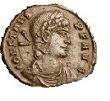
On Dec. 25, 333 Constantine I's son Flavius Julius Constans (320-50) is made Caesar - what do you think?

On Sept. 19, 335 Flavius Dalmatius (-337) is raised to the rank of Caesar by his uncle Constantine I, and given Thrace, Macedonia, and Achaea.

I went sky-diving, how do you like me now? In 335 Constantine I the Great, who flopped and became an Arian gets his brother Dalmatius, censor of Antioch to convene the First Synod of Tyre, presided over by Eusebius of Caesarea (264-340), and attended by Athanasius with 48 Egyptian bishops, with the bishops not allowed to leave to consecrate the new Church of the Resurrection containing the Sepulchre of Christ in nearby Jerusalem until they earn it by reversing the 325 Nicene Council and approving Arianism; after doing that, they deposed and exiled Athanasius on trumped-up charges of breaking a chalice in a church in Maraeotis, whipping or imprisoning six bishops, and murdering a 7th, Arsenius, even though Athanasius claimed that the church doesn't exist, and produced Arsenius alive at the synod, which got him cleared of those charges, but then backfired as a charge of threatening to cut off the grain supply from Egypt to Constantinople was not thrown out; Athanasius then boldly went to Constantinople and confronted the emperor as he passed on his horse in the street, causing him to reconsider and let him go to Gaul to the court of Treves (Trier) for the next 28 mo. until the emperor died, while refusing to fill his vacant seat in Alexandria; Arianism now had the upper hand in the Roman Empire, pass the martyr applications.




Early in 337 Constantinople archbishop (since 313) St. Alexander (b. 240), who had shut himself up in the Church of Hagia Irene to go on strike dies suggesting two candidates for his job on his deathbed, his secy. (St.) Paul (Paulinus) I the Confessor (-350) (an Athanasian from Thessalonica) and Macedonius (an Arian), who start a war over the vacant throne, which Paul wins in a railroad election at the Church of Peace near the Hagia Sophia. On Apr. 3, 337 (Easter Sun.) Constantine I (b. 271) falls ill (poisoned by the Athanasians with a Trinity treat?), travels to Helenopolis, then Nicomedia, is baptized by Arian (yes!) bishop Eusebius of Nicomedia (-341), and dies on May 21/22, wearing the white robes of a Christian neophyte (no shamrocks in sight?); the still mainly pagan Roman Senate places him among the pagan gods, while his sarcophagus is placed in the Church of the Apostles in an effort to make him the 13th Apostle (his birth was the most miraculous event since the Resurrection?); as soon as he grows cold, the "massacre princes" purged many of his relatives, and in late summer his nephews Flavius Dalmatius Caesar and Annibalianus Caesar are murdered by the army; on Sept. 9 Constantine I's three sons Constantius II (Flavius Valerius Julius Constantius) (317-61) (Arian), Constantine (Constantinus) II (Flavius Valerius Claudius Constantinus) (317-40) (Athanasian), and Constans I (Flavius Valerius Julius Constans) (320-50) (Athanasian and gay?) meet in Pannonia, and each assumes the rank of Augustus (Roman emperor #63, #64, #65), and divide the empire: Athanasian Constantine II rules the West (prefectures of Italy, Gaul and Egypt); Arian Constantius II rules the East except for Macedon, Thrace, and Achaea, which go to Athanasian Constans I, who also gets Illyricum and part of Africa; Constantius II promulgates a law making the marriage of a Jewish man to a Christian woman punishable by death, and in 339 ups it to making conversion to Judaism itself a criminal offence subject to confiscation of all their property; Persian shah Shapur II invades Mesopotamia to take on Constantius II, beginning the Sixth Roman-Persian War (ends 363).
In 338 pissed-off Constantius II (who didn't give his permission) summons a synod of Arian bishops which deposes and banishes pesky St. Paul I the Confessor, and translates Eusebius of Nicomedia to Constantinople as the new archbishop (until 341); Trinitarian bishop Eustathius the Great of Antioch is deposed and exiled to Trajanopolis in Thrace, and Athanasius is exiled to Gaul - where in the hell did the tigers come from? In 339 Constantius II permits exiled Athanasius to return to his see of Alexandria, but the synod elects their own Arian archbishop of Alexandria, Pistus (Gregory?), causing prefect Philadrius to drive Athanasius into his 2nd exile (until 346), and he stays in Rome for three years, where he learns Latin and teaches the Egyptian monastic life; meanwhile Constantinus II and Constans I become co-consuls, forming a bridge locking out black sheep Arian Constantius II to give them time to think and maneuver?
In 340 former co-consuls Constantine II and Constans I start a catfight in Aquileia, and Roman emperor (since 337) Constantine II (b. 317) is killed, after which Constans I absorbs his brother's territory, keeping it nice and Athanasian; meanwhile Pope Julius I summons the Synod of Rome of 50 bishops, which decides that Athanasius should be restored as archbishop of Alexandria, and Athanasian Constans I then summons him to Milan.
In 340 Greek Arian bishop Eusebius Pamphili of Caesarea (b. 264) dies, leaving Life of Constantine (which claims that Christ's birth during the reign of Roman emperor #1 Augustus proves that the Church and the Roman Empire were meant to be partners until the Second Coming, and that Constantine I and his army saw the flaming cross in the sky with the inscription "By this sign thou shalt conquer" before crossing the Alps into Italy), and In Praise of Constantine (which promotes the political monotheist Christian sacred monarchy Caesaropapist Doctrine that a Christian Roman emperor is elevated by God to a position higher than the Church, and is a king-priest, both caesar and pope, which unites the pop., but is too late to save the West, and is ditched in the 5th cent., but after the West falls is adopted by the Byzantines in the 6th cent. with success, while the belief that the ruler was appointed by God's will lasts in the West until the 20th cent.) - Christianity is now totally legit., but the Trinity is still on the ropes?
Also in 340 Roman "Christian Cicero" writer Lactantius Firmianus (260-340) dies, leaving Divinae Institutiones, predicting that Rome will fall in 410 (in the fall?), with the soundbyte "The fall and ruin of the world will soon take place, but it seems that nothing of the kind is to be feared as long as the city of Rome stands intact."
In 341 after eunuchs, slaves, and palace girls turn Constantius II into a rabid anti-Nicene Creed Semi-Arian (homoiousion) ("the eunuchs are the natural enemies of the Son" - Gibbon, Ch. 21), he convokes the Synod of Antioch of 95+ bishops, led by Eusebiuis of Caesarea (264-340), which composes a Semi-Arian creed and 25 canons which are later recognized by the Greek Orthodox Church but snubbed by the Roman Catholic Church; meanwhile Constans I and Constantius II drop their Catholic catfight long enough to issue a law prohibiting pagan sacrifices (or compose it without publishing it, or publish it without executing it, as pagan sacrifices go on throughout their reigns?); meanwhile Arian champ Eusebius of Nicomedia dies, causing St. Paul to return to his episcopal throne in Constantinople, but Constantius II's fervent Arianism causes him to withdraw govt. support for Athanasian churches, become indifferent to attacks on them, and close them and confiscate their lands; meanwhile Constans I backs the Athanasians, threatening his brother with a war if he doesn't let Athanasius return to his episcopal throne in Alexandria, causing the latter to beg the archbishop 3x by letter to return before he finally does, in a triumphal manner, with all his adherents, expelling the Arian airheads with a bum shove.
In 342 the first bloodshed in New Rome (Constantinople) over religion begins when, at the orders of Constantius II, praetorian prefect Philip lures archbishop Paul I the Confessor into the Baths of Zeuxippus, then kidnaps and ships him back to Thessalonica, while rabid Arian Macedonius is driven in Philip's chariot surrounded by soldiers to the cathedral, causing a street war that kills 3,150; George of Laodicea (the Cappadocian) becomes Arian archbishop of Alexandria (until 361); Hermogenes, master-gen. of the cavalry is dragged by his heels from his palace by the Athanasians and murdered in the streets, and his body desecrated, causing Constantius to have two Athanasians beheaded for the murder at the gates of Constantinople, and to issue an edict depriving Christian ecclesiastics of their immunities if they don't accept the Arian archbishop, while banning Athanasian churches throughout the empire, beginning a persecution which incl. forcing holy bread down Athanasians' throats, and female breast torture with hot egg shells and heavy boards.
In 343 at the urgent request of Pope Julius I, Constans and Constantius II convene the Synod (Council) of Sardica (Sofia) in Dacia (ends 344) over the pesky Arian controversy, attended by Athanasius plus 94 Western (Hosius of Cordova, Servatius of Maastricht et al.) and 76 Eastern bishops (Marcellus of Ancyra, Asclepas, Perigorius of Skopje et al.); too bad, while deciding to act as a body and support the Arian views of their emperor, the Eastern bishops split and move to a new Synod (Council) of Philippopolis in Thrace, condemning Athanasius as a criminal, while the Western bishops proclaim him a saint and censure the Eastern bishops, deposing and excommunicating several of them and passing 21 canons, most about dos and don'ts for bishops; Athanasius begins his 3rd exile, hiking for Rome to the protection of Pope Julius I, where St. Paul I soon joins him - the beginning of the East-West Church Schism?
On Oct. 31, 346 Athanasius returns from his 3nd exile (begun 343) to Alexandria, taking advantage of the Persian War and civil war against Maxentius.

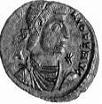
On Jan. 18, 350 Flavius Magnus Magnentius
(-353) is declared Roman emperor #66 at a banquet (until 353),
and in Jan. Roman emperor (since 337) Constans I (b. 320) is killed
by Magnentius' assassins in Helena (Pyrenees), causing his
big bad Arian brother Constantius II, now sole emperor of East
and West to begin a 3-year civil war with Magnentius, while
Athanasius knows his days in the Sun are running out; Constantius'
sister Constantina persuades the old man
Vetranio (-356)
to assume the title of Caesar on Mar. 1 (Roman emperor #67), and
he allies with Magnentius, but Constantius forces him into
retirement on Dec. 25.
On June 3 Julius Nepotian (-350),
son of Eutropia the half-sister of Constantine I declares
himself Roman emperor #68 in Rome, but is killed on June 30 by Magnentius'
generals; meanwhile Athanasius makes the mistake of communicating with
Magnentius, causing Constantius II to declare that he is more eager to kill
him than the rebel emperor; speaking of eager to kill, Constantius II
takes care of some dirty laundy by having pesky St. Paul I the Confessor
captured in Mesopotamia, dragged to the town of Cucusus in Armenia
on Mt. Taurus, starved, then strangled by his own episcopal omophorion
while celebrating the divine liturgy - happy holidays to all?
After Julian's brother Gallus taxes them so heavily that many sell their
children to pay, the Jews of Palestine stage the
Jewish Revolt Against Constantius Gallus
(ends 352), ending up losing thousands killed or enslaved and seeing Sephoris burned
to the ground, with partial destruction of Tiberias and other cities - talk
about a losing cause?


Early in 351 Magnentius proclaims his brother Magnus Decentius (-353) as Caesar (Roman emperor #69); on Mar. 15 Constantius II proclaims his cousin Gallus (Flavius Julius Constantius Gallus) (325-54) as Caesar (Roman emperor #70) after he brutally suppresses the Jewish revolt, then sends him E to keep the Persians in check after giving him Constantina, daughter of Constantine I and Fausta as his wife. On Sept. 28, 351 Constantius II defeats Magnentius at the Battle of Mursa on the Drava River in modern-day Croatia, becoming the bloodiest battle of the cent., with losses of 54K men. The last time when a Roman royal can throw off the sickly Christ Son of God B.S. and revert to the healthy Sun God of the old days in good conscience? Meanwhile as soon as Gallus obtains the purple, his half-brother Julian goes pagan, studying with the Platonic school of Aedesius and his disciples Chrysantes and Eusebius in Pergamus, the Theurgic school of Maximus in Ephesus (where he is secretly initiated), and the Eleusinian Mystery School of Athens, and comes to believe that the poems of Homer are divinely inspired by Apollo and the Muses (love that Posthomerica, #1 on the Roman bestseller list?); he also touts the Ancilia (holy shields) which dropped from heaven onto the Quirinal hill of Rome as superior to Christ's cross as a celestial trophy?
On Aug. 13, 353 Constantius II defeats Roman emperor (since 350) Magnentius at the Battle of Mons Seleuci (Mount Seleucus), causing him to flee to Lugdunum and magnanimously commit suicide; on Aug. 18 Decentius does the decent thing and follows suit.
In 354 Roman emperor (since 351) Gallus (b. 325) is executed by order of his cousin Constantius II after Gallus' wife Constantina influences him to challenge his authority; Constantina dies en route to Constantius II to plead her husband's case - money can't buy me love? In 354 now that he's sole emperor of East and West, rabid Arian Constantius II sees his chance and sends an army of 5K led by Duke Syrianus of Egypt to Alexandria to crush pesky Athanasius and his followers, and they lay siege to the city for 4 mo., pillaging and raping, while the Arians their support to George of Cappadocia (the real St. George of dragon fame?), who is placed on Athanasius' episcopal throne by Count Sebastian of Egypt, and then presides over the rape of 90 episcopal Egyptian pro-Athanasius cities; meanwhile Athanasius slips away from the Church of St. Theonas as the soldiers storm it during a service and get blocked by his sheep long enough, and goes into hiding for the next six years, while roid-raging Constantius II puts an all-out hit on him; "The doors were at length burst open: a cloud of arrows was discharged among the people; the soldiers, with drawn swords, rushed forwards into the sanctuary; and the dreadful gleam of their armour was reflected by the holy luminaries which burnt round the altar. Athanasius still rejected the pious importunity of the monks and presbythers who were attached to his person; and nobly refused to desert his episcopal station till he had dismissed in safety the last of the congregation. The darkness and tumult of the night favoured the retreat of the archbishop; and though he was oppressed by the waves of an agitated multitude, though he was thrown to the ground, and left without sense or motion, he still recovered his undaunted courage, and eluded the eager search of the soldiers, who were instructed by their Arian guides that the head of Athanasius would be the most acceptable present to the emperor. From that moment the primate of Egypt disappeared from the eyes of his enemies, and remained above six years concealed in impenetrable obscurity" (Gibbon, Ch. 21); both the Arians and Athanasians hire street singers to inculcate their beliefs, the Arian refrain being, "To the Father, by the Son, and in the Holy Ghost" - meanwhile will the real Christ please stand up?
On Aug. 11, 355 Silvanus, a victim of intrigue, is maneuvered into declaring himself emperor at Colonia Agrippa, and is murdered by his own men on Sept. 7. On Nov. 6, 355 Constantius II appoints Gallus' short brainy closet pagan half-brother Flavius Claudius Julianus (Julian the Apostate) (331-63) as Caesar, and dispatches him to Gaul to kick Alamanni and Frankish butt. In 355 the 300-bishop Synod of Milan, called by Athanasius' sworn enemy Constantius II confirms the 353 Council of Arles, and condemns Athanasius, with all dissidents required to sign under threat of exile; strongly Trinitarian bishop Eusebius of Vercelli (Vercellae) (283-371), bishop Liberius of Rome, bishop Osius of Cordova (100 years old?) (Constantine I's favorite and the father of the Nicene Creed), bishop Paulinus of Treves, bishop (since 351) St. Dionysius of Milan (-359), bishop Lucifer of Cagliari (-371), bishop (St.) Hilary of Poitiers (Pictavium) (300-68) et al. refuse to go along, and Eusebius and Dionysius are banished to Cappadocia, Lucifer to Syria, Osius to Beraea in Thrace, Liberius to Thrace, Hilary to Phrygia, while the rest end up in the armpits of the empire (Arabia, Thebais, Mt. Taurus, Amblada); too bad, feeble Osius soon flip-flops to be allowed to return, causing Arians to crow in triumph that Athanasians are yellow chicken whimps?; Arian Felix II (-365) becomes the 3rd antipope in Rome (until 358) after the exile of Liberius, and a church assembly in Rome of Liberius' followers vows never to accept him; Cappadocian-born Arian Auxentius of Milan (-374) becomes bishop of Milan (until 374), even though he can't speak Latin; in exile, St. Hilary of Poitiers writes History of Constantine, in which he complains about finding few homoousian bishops; "The Homoousion is rejected, and received, and explained away by successive synods... We condemn either the doctrine of others in ourselves, or our own in that of others; and, reciprocally tearing one another to pieces, we have been the cause of each other's ruin." According to some Bible-thumpers, this year marks the start of the "1,260 days" that the woman hides in the wilderness (Rev. 12:6) until Protestantism comes to save the world from Catholicism.
In 356 Julian the Apostate invites the Athenian Eleusinian mysteries pontiff to his court in Gaul, and consummates their mystic rites and sacrifices in a cave at night, freaking out at the visions and momentarily lapsing by making the sign of the cross to scare away the demons, causing the priest to explain that they weren't scared just indignant; Julian then claims to receive divine illumination and devotes his life to the service of the gods Jupiter, Apollo, Minerva, Hercules, Pan, Mercury, Hecate et al., abstaining from different foods on certain days to receive visions, but publicly pretending to remain a Christian for fear of Constantius II.
In summer 357 the Third (3rd) Council of Sirmium issues the Seventh (7th) Arian Confession, declaring that both homoousios and homoiousios are unbiblical, and that the Father is greater than the Son like the Bible says; the Trinitarians call it the Blasphemy of Sirmium - stop embarrassing yourself, crybaby? In 357 Constantius II visits Rome, and is accosted by the followers of exiled Athanasian bishop Liberius, demanding his return, and caves in after a delegation of Roman noblewomen threaten to go into exile with him, allowing both him and his Arian rival Felix to remain in Rome, but thousands of protesters in the Circus crying "One God, One Christ, One Bishop!" start a bloody sedition, causing Constantius to exile Felix, after which his Arian followers are murdered by their Christian brother Athanasians - from the newsboys on K-love?
In 358 the Germanic Salian Franks (Salii) in N Gaul (N of the Roman limes along the Ijssel River in the Netherlands, who settled earlier this cent.) are subdued by the Romans under Julian the Apostate, and allowed to settle in Belgium as an ally of Rome, bringing their male-ruler-only Salic Law (Lex Salica) with them; Emperor Constantius II begins to get jealous of Julian, and his palace buffoons begin calling him a "hairy savage... an ape invested with the purple" who at the same time is a "loquacious Greek, a speculative soldier, who had studied the art of war amidst the groves of the Academy." - Gibbon, Ch. 22. Meanwhile Roman Christians are turned into savage beasts over incomprehensible theological arguments about the Prince of Peace? In 358 Arian archbishop Macedonius of Constantinople sends four legions of soldiers to exterminate the Athanasian Novatians of Mantinium in Paphlagonia, but they fight back with farm implements, killing 4K soldiers; meanwhile "Many were imprisoned, persecuted and driven into exile. Whole troops of those who are styled heretics were massacred, particularly at Cyzicus and Samosata. In Paphlagonia, Bithynia, Galatia, and in many other provinces, towns and villages were laid waste and utterly destroyed" (Emperor Julian the Apostate). In 358 the Council of Ancyra, chaired by Semi-Arian bishop Basil of Ancyra (Ankara) goes back to the homoousios formula; meanwhile the Fourth (4th) Council of Sirmium (1st in 347) backs a new compromise homoios ("like the Father") formula; meanwhile the Synod of Antioch, run by Arian bishop Eudoxius of Antioch (-370) goes for the Anomoean (Eunomian) (unlike substances) formula, which is condemned by the Council of Ancyra, causing their leaders to be exiled for a short time to Pepuza. Another cross on the side of the road? Also in 358 the radical Donatist Circumcellions (Agonistici) of Numidia and Mauritania in N Africa flee to the Gaetulian Desert and become Robin Hood type rebels, carrying huge clubs that they call "Israelites", and wield in battle with the cry "Praise be to God!" (almost like the later Islamic cry of "Allahu akbar"?); after taking on the Roman cavalry in the Battle of Bagai, they decide that they must be killed for their religion or else, and begin suicide attacks on pagans, and even stop travelers on the highways and order them to kill them so that they can die happy, finally throwing themselves over cliffs; "In the actions of these desperate enthusiasts, who were admired by one party as the martyrs of God, and abhorred by the other as the victims of Satan, an impartial philosopher may discover the influence and the last abuse of that inflexible spirit which was originally derived from the character and principals of the Jewish nation... The experience of [pagan historian] Ammianus had convinced him that the enmity of the Christians towards each other surpassed the fury of savage beasts against man; and Gregory Nazianzen most pathetically laments that the kingdom of heaven was converted by discord into the image of chaos, of a nocturnal tempest, and of hell itself." - Gibbon, Ch. 21.
In July 359 after Constantius II tries to impose the 358 Fourth Council of Sirmium's homoi formula, the Synod of Rimini in Ariminum (Rimini) (good name for Arians?), attended by 300-400 Western bishops contains only 80 Arian bishops, incl. bishops Auxtenius of Milan, and Valens and Ursacius of Illyricum, but even after a good show put up by Trinitarian bishop Phoebadius (-393) of Aginnum (Agen) (73 mi. SE of Bordeau), they somehow chisel an Arian meaning into the creed (the Son was like the Father, but only "according to the Scriptures", bypassing the Homo-Heteroousian language), which later causes Jerome to complain that "the whole world groaned in astonishment to find itself Arian"; the Homoousian (Trinitarian) bishops get back home, find out about the trick, reject the creed, and get back into control in the West, hardening feelings even more?; meanwhile in Sept. at Constantius II's orders the Eastern bishops meet in the Semi-Arian Synod of Seleucia in Seleucia Isauria, and by this time who cares what they did?; okay, the Anomoeans, freshly returned from exile end up getting the boot after Bishop Acacius of Caesarea (disciple of historian Eusebius of Caesaria), and exiled again to Mopsuestia in Cilicia, and later to Amblada in Pisidia, which pretty much finishes this left-wing splinter group off; not really, they make a comeback when Julian the Apostate lets them return; to give the other side a chance, Bishop Hilary of Poitiers is specially invited to attend, and furnished with post horses for his journey, and represents the Trinitarian side, engaging in bitter debates which only leave the two camps more hardened, causing Constantius II to listen to the spoilsport Anomoeans and send him packing home, where he gets Arian bishop Saturninus of Arles deposed, and becomes a hero, but gets a bad rap of trying to reconcile the Arian and Trinitarian camps with hardhead Bishop Lucifer of Cagliari and his followers; meanwhile Bishop Eudoxius of Antioch is deposed for being too heretical (?), and flees to Constantinople, and the remaining bishops sign the Creed of the Dedication.
On Jan. 27, 360 after disinterring the body of emperor Constantine I the Great without permission, causing a bloody fight between between the Arians and anti-Arians, Macedonius is deposed by Constantius, and Arian bishop Eudoxius of Antioch becomes archbishop of Constantinople (until 370) in the presence of 72 bishops, uttering the immortal soundbyte "The Father is asebes, the Son is eusebes", which causes a nonplussed reaction, causing him to explain "The Father is asebes because he honors nobody, and the Son is eusebes because he honors the Father", causing the bishops to ROFL, which later causes Greek historian Socrates of Constantinople (380-450) to comment that holy ignoramuses like him tear the Church to pieces with their captious subtilties; on Feb. 1 the Hagia Sophia (St. Sophia) Church in Constantinople (begun in 342) is dedicated by the new archbishop and holy comedian. In Jan. Julian's German troops proclaim him Augustus in Paris after balking at a request from Constantius II to march E to fight the Persians and leave him without an army, crowning him with a military collar after first trying a female necklace and/or a horse collar; meanwhile Persia captures Singara and Bezabde, and Constantius II tries in vain to recapture Bezabde; Julian sends messengers to Constantius II in Antioch trying to explain the impulsive actions of his troops, and offering to remain as the emperor of Gaul only; meanwhile Julian gets his ducks in a row by pardoning the Constantius-hating outlaw followers of Magnentius and recruiting them into his army, defeating the Attuarii Franks at the Rhine River near Cleves, strengthening his Rhine fortifications from Cleves to Basel, and wintering at Vienne, tricking Alamanni prince Vadomair to a party and having him taken POW and shipped to Spain to get him out of the way, then blitzing the Alamanni to make them back off.

The Roman Don't Ask Don't Tell? In 360 the First (Zeroeth?) Council of Constantinople, called by Constantius II is attended by 50 Eastern bishops and ? Western bishops; Arian bishop to the Goths Ulfilas (311-81), who works at the foot of Mt. Haemus in Lower Moesia visits Constantinople to lobby for the Arians; the heteroousians start out with the upper hand, but after Constantius II banishes Aetius, the homoousians prevail, and they overturn the 335 pro-Arian Synod of Tyre, rejecting the very use of the term "ousia" (substance), whether it be homo, hetero, or homoi, with the Creed of Constantinople, which begins: "We believe in one God the Father Almighty, of whom are all things, and in the only begotten Son of God, begotten of God before all ages, and before every beginning, through whom all things visible and invisible were made, who is the only begotten born of the Father, the only of the only, God of God, like to the Father who begat him, according to the Scriptures, and whose generation no one knows but the Father only that begat him"; semi-Arian bishop Macedonius is deposed, causing him to found the sect of the Pneumatomachi ("fighters against the Holy Spirit"), which declares that the Holy Ghost (Spirit) is a divine energy diffused throughout the Universe and not a person, denying its divinity - the original Jedi Knights?
 '
'
Speaking of Jedi Knights? In 361 with the Creed of Constantinople simmering things down, just when maybe, Constantius II replies to Julian's messengers that he must step down and surrender to Gallic Arian bishop Epictetus, with the promise of a pardon, and Julian sees through this and sends Constantius' ambassador, questor Leonas back with a declaration of war, and publicly renounces the whole blasted confounded Christian religion weeks after celebrating the Christian festival of the Epiphany, declaring himself the implacable enemy of both his uncle Constantius (who murdered his family and inexplicably spared him, and which he now suddenly remembers?) and Christ, and lamenting the long years when he had to put up the pretend act; his praetorian prefect Nebridius brashly stands up for Constantinus, and a soldier cuts off one of his hands, causing him to fall at Julian's feet, who protects him with his purple mantle, but replaces him with Sallust (Saturninus Secundus Sallustius), who promises to cut taxes, after which Nebridius marries rich Constantinople babe St. Olympias (360-408) and does okay for himself; Julian then sends an army of 10K under cavalry Gen. Nevitta to Rhaetia and Noricum in Illyricum, hoping to rally the people to his side and capture their gold and silver mines, and a 2nd army under Gens. Jovius and Jovinus through the Alps to N Italy; Julian then makes a secret supermarch wih 3K soldiers through the Black (Marcian) Forest, captures a fleet of ships and sails down the Danube, arriving at Sirmium before his opponent even knows he has left the Rhine, and is received as a conquering hero, celebrating the games at the circus, then takes the narrow Succi Pass on Mt. Haemus which separates Thrace and Dacia; the Roman Senate smells the roses and recognizes him as emperor; meanwhile Sapor retreats from Syria, and Constantius II gives a speech in his camp in Hierapolis how he will soon have his rival's head adorning the city gates; as he prepares to march against him he sends Gaudentius to Africa to stop grain shipments to Rome, which puts a dent in Julius' plans; meanwhile some Sirmium legions whom Julian had coopted turn on him and hole up at Aquileia, causing Julian to send Gen. Jovian to siege them, where they prove the place virtually impregnable, giving Julian another worry, but on Nov. 3 (the gods be praised?) 45-y.-o. Roman emperor (since 337) Constantius II (b. 317), last surviving son of Constantine I dies of a fever in the town of Mopsucrene 25 mi. from Tarsus after magnanimously naming Julian as his successor, and after a little commotion caused by eunuch Eusebius trying to get another emperor elected at Constantinople, Julian the Apostate (Flavius Claudius Julianus) (331-63) becomes Roman emperor #71 (until 363), and is met at Heraclea (60 mi. away) by the pop. of Constantinople, who conduct him triumphantly to the capital, where he attends the funeral of Constantius without his diadem dressed in mourning and shedding tears; he pardons the Aquileia rebels after they kill their leaders, publicly renounces the Christianity his elders had tried to brainwash him into, proclaims his belief in Mithraism and Neo-Platonism, but instead of taking advantage of the situation and stamping out the pesky Christians (still in a minority) with a new persecution, the tolerant Emperor Julian issues an edict of toleration, permitting all religions, even intolerant Christianity freedom of worship, while unsuccessfully attempting to reinstitute a tolerant paganism with himself as an ascetic, vegetarian, razor-spurning, bath-despising, floor-sleeping philosopher-king, who is head of a polytheistic church, where "one should diligently study the systems of Pythagoras, of Plato, and of the Stoics, which unanimously teach that there are gods; that the world is governed by their providence; that their goodness is the source of every temporal blessing; and that they have prepared for the human soul a future state of reward or punishment"; he dismisses the herd of palace eunuchs, slaves, and parasites, tries and executes the eunuch chamberlain Eusebius and other ministers in Chalcedon (under Sallust Secundus, prefect of the East), revokes govt. support of Christian clergy, shifts imperial funding to the old pagan cults, forbids Christians to teach Greek and Latin lit., and allows all banished Christian clergy of every stripe to return, incl. Athanasians, Donatists, Novatians, Macedonians, and Eunomians, inviting them all into his palace to argue with each other before trying in vain to convert them to paganism with eloquent speeches; "Hear me! The Franks have heard me, and the Alamanni!"; "And though he exerted the powers of oratory to persuade them to live in concord, or at least in peace, he was perfectly satisfied, before he dismissed them from his presence, that he had nothing to dread from the union of the Christians"; he restores pagan sacrifices, and insists on slaughtering animals and reading their hearts and livers himself; nobody's perfect, so he does passively condone attacks on Christian churches? Julian appoints Sixtus Aurelius Victor as prefect of the Second Pannonia, and executes Gaudentius, praetorian viceregent of Africa, and Duke Artemius of Egypt in Antioch. Roman philosopher Gaius Marius Victorinus (280-365), who had become such a star as a teacher of rhetoric that a statue was erected to him in the Forum of Trajan in 353 converts to Christianity via a study of the Bible, causing his popularity with the regime to plummet, and next year he loses his job and retires. During his long poontang-free winter nights in Constantinople this year and Antioch next year, Julian writes The Misopogon (Beard-Hater) (satirical essay on philosophers), The Caesars, and the bestseller Twenty Years a Christian Slave and Ten More a Christian Hypocrite, or, Why the Christian Religion Sucks and Paganism Rocks, an elaborate refutation of Christianity beloved of pagans, which is later suppressed and only survives in quotations in a polemic by St. Cyril of Alexandria; too bad, all this only causes the Nicene party of the West to harden around their homoousios position? Emperor Julian the Apostate allows the Jews to return to Jerusalem, calling it "holy Jerusalem, which you have for many years longed to see rebuilt."
In 362 Emperor Julian closes the teaching profession to the pesky Christians, and wows the people by refusing the title of Dominus (Lord), and marching on foot on the calends of January with his new consuls Mamertinus and Nevitta from the palace to the senate, then declaring that the senate of Constantinople is equal to the Roman senate, and claiming himself to be a senator, which all later emperors copy; he restores the "soul" of the expiring cities of the empire (Libanius), incl. Nicopolis, Athens, Corinth, Argos, and the cities of Epirus and the Peloponnesus, and reinstates the Actiac games of Augustus. Emperor Julian underwrites reconstruction of the Temple of Jerusalem (destroyed in 70 C.E.) for the super-intolerant Jews, and allows the exiled super-intolerant Athanasius and his super-intolerant adherents Eusebius of Vercelli (Vercellae) et al. to return to Alexandria, where they convene the Synod of Alexandria, which supports the, guess, yes, the Athanasian creed and condemns the erring Arians; meanwhile he foils an assassination plot at Antioch, and executes the son of coward Gen. Marcellus for another plot; let's not count the Anomoeans (Eunomians) out yet, they get their creed restored by the Synod of Antioch, which decrees that "The Son is in all things unlike the Father, as well in will as in substance" - maybe they should switch from abstract algebra to topology?
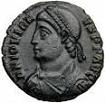
In spring 363 pagan philosopher-king Roman emperor (since 361) Julian the Apostate (b. 331) invades Persia, forces a passage over the Tigris River, and in May sieges the Persian city of Ctesiphon, pushing Persian forces back S into the city without capturing it, concluding a peace by which Rome returns the territories W of the Tigris River, ending the Sixth Roman-Persian War (begun 337); on June 26 on his way back home he is KIA in a battle on the Persian frontier near Samarra by a Persian cavalryman's lance, ending the line of Constantine, and the next day Jovian (Flavius Jovianus) (331-64), a Christian is elected Roman emperor #72 (until 364) by the army; Jovian copies Julian and issues an edict of gen. toleration; too bad that Christanity has penetrated the army so fully that all future emperors are Christians, although it takes almost 30 years before official persecution begins again; meanwhile the Persians take over Mesopotamia, and recapture Nisibis without a fight despite pleas from the pop. to emperor Jovian that they are willing to fight, causing the Roman pop. to move to Amida and the Christian School of Nisibis led by Ephrem the Syrian to flee to Edessa; Roman historian Ammianus Marcellinus, who is in Nisibis at the time later disses Jovian in his writings. The reconstruction of the Temple of Jerusalem is halted by Julian's death, opposition by the rabbis, and an earthquake on May 19, which also destroys half of the ancient city of Petra - where Indiana Jones finds the Holy Grail?
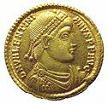
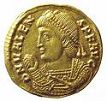
On Feb. 17, 364 after making a humiliating peace with the Persians under Shapur II the Great, who recover their Mesopotamian territories ceded by Narses in 298, as well as Nisibis and Singara, Roman emperor (since 363) Jovian (b. 331) dies under suspicious circumstances, and on Feb. 26 Valentinian I (Flavius Valentinianus) (321-75) is proclaimed Roman emperor #73 of the West by the army; on Mar. 28 he appoints his pagan brother Flavius Valens (328-78) as Roman emperor #74 of the East (until 378); Valentinian and Valens renew Jovian's edict of gen. toleration, but begin confiscating non-Christian temple lands while leaving the temples open.
In 365 the term "pagan" (Lat. "rustic") is first used in the Valentinian Code to refer to civilians who refuse a military oath of Christian baptism needed to join the military; previously the term meant people of the country (pagus), derived from the Doric word for fountain; later, after the only place the old religion is still practiced is out in the country, the word comes full circle? In 365 the Semi-Arians, who now call themselves the Macedonians hold the Synod of Lampsacus, and sign the 341 Creed of the Dedication, and condemn Arian patriarch Eudoxius of Antioch, but Valens refuses to confirm their proceedings.
In 366 the 5th and last exile of Athanasius ends after only 4 mo.

In 367 the Alamanni capture Mainz, but are defeated at the Battle of Solicinium by Valentinian I, who while campaigning in Gaul is stricken with a mysterious illness and almost dies; meanwhile a power struggle ensues, and to ensure a smooth succession he names his 8-y.-o. son Flavius Gratianus (Gratian) (359-83) as co-Augustus (Roman emperor #75) of the Wild, Wild (but not yet Wild, Wild, Wild, Wild?) West; Gratian becomes the first Roman emperor who refuses to wear the pagan pontifical robe in rites and sacrifices in Rome, and ends up prohibiting pagan worship in Rome entirely; prior to this "The title, the ensigns, the prerogatives, of sovereign pontiff, which had been instituted by Numa, and assumed by Augustus, were accepted, without hesitation, by seven Christian emperors, who were invested with a more absolute authority over the religion which they had deserted than over that which they professed." - Gibbon, Ch. 21. After his wife pussy-whips him, pagan Roman emperor Valens goes Christian, and is baptized in Constantinople by Arian patriarch Eudoxius, splitting with his Trinitarian bro' Valentinian over the big issue dividing Christians; now that Eudoxius is calling his theological shots, Valens orders the re-exiling of bishops banished by Constantius II and allowed to return by Julian the Apostate, causing the true blue Catholics to point to every bad thing that happens as a portent showing the anger of Heaven at them; meanwhile Valentinian I recognizes Damasus and banishes Ursinus, who dies in Nov., and Damasus becomes undisputed bishop of Rome over the dead bodies of over 100 opponents? - the price of official sanction is official meddling?
In 370 is the first record of Infant Baptism, which considers that the act of baptism rather than the person's faith is what saves, which spawns a long series of protesters variously called Anabaptists, Baptists, etc., who face persecution for rebaptizing adults; the Roman Catholic Doctrine of Complete Regeneration and Washing of All Sins by Baptism regards all those who have been washed in the baptismal font as becoming pure as the virgin snow, along with Christ popularly being called the Ichthys (Fish).
Also in 370 the Huns arrive in Scythia from the region of Meotis (Sea of Azov) near Persia, and overpower the Alani (Alans), after which they and the remaining Alans attack the Ostrogoths in the Ukraine, who make a stand at the Dniester River, but are forced SW by the thousands, many of them forced to join the Huns, later ending up fighting their Visigoth kinsmen in Chalons in 451; by now the Ostrogoths and Visigoths have permanently split, with the Ostrogoths inhabiting the shores of the Black Sea, and the Visigoths inhabiting the region from the Dniester River to the Danube River. In 372 the Huns, who have already subjugated the Alani and made the Ostrogoths tributary attack the Visigoths to the W of the Carpathians, forcing them to move W over the Danube River into Roman lands, and Emperor Valens makes a big mistake in allowing them to cross the Danube to save themselves? In 373 the Huns begin a migration W from Asia across the Ural River N of the Caspian Sea. In 373 the Visigoths (from N of the Carpathians to S of the Dnieper) attack along the Roman limes on the Danube River in N Moesia.

In 374 Aurelius Ambrosius, son of a praetorian prefect and consul of Aemilia is elected (St.) Ambrose (340-97), bishop of Milan, showing how the upper echelon of the powerful are rising in the Church; he begins ingratiating himself with Gratian, prodding him to revoke the edict of toleration and scotch the pagans completely, which only takes two years.
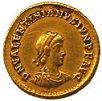
On Nov. 17, 375 Roman emperor (since 364) Valentinian I (b. 321) dies of apoplexy in Brigetio in Illyricum on the Danube River while parleying with the Quadi and Sarmatians; his oldest son Gratian being considered unfit, the Roman army proclaims his other son, 4-y.-o. Valentinian II (371-92) as Roman emperor #76 (until 392); his half-brother Gratian acquiesces next year, remaining co-Augustus of the West. In 375 the Huns attack the Visigoths on the Pontiac Steppes, then crush the Alani (Alans) and the Ostrogoths in the Ukraine, causing King Ermanaric of the Ostrogoths to commit suicide as his empire between the Dneister and Don Rivers is being overrun; in the fall emperor Valens grants thousands of starving fleeing Visigoths a feodus - is that like a freeloafus?
In 376 the Huns defeat the Visigoths under Athanaric, and advance onto the plains of Dacia and the Russian steppes (which is nice for their horses?); meanwhile Emperor Valens requests Gratian's help in defeating the Visigoths in Thrace, then after they ask for protection from the Huns he accepts them as allies, orders them disarmed, and allows them to cross the Danube River to settle Lower Moesia (modern-day Bulgaria and SE Yugoslavia); Athanaric bugs out and moves with part of his people to the W (Transylvania).
In 376 after prodding by Bishop Ambrose, 17-y.-o. Emperor Gratian withdraws the edict of toleration, removes the Altar of Victory from the Senate Forum, and withdraws state subsidies of pagan activities, confiscating the revenues of the Vestal Virgins and other pagan priesthoods; this causes a split with the Senate, and Gratian retaliates by rejecting and abolishing the title and robes of pontifex maximus, again at Ambrose's urging; the imperial edict is respected throughout the empire except in the city of Rome, where "The image and altar of Victory were indeed removed from the Senate-house; but the Emperor yet spared the statues of the gods which were exposed to public view; four hundred and twenty-four temples or chapels still remained to satisfy the devotion of the people, and in every quarter of Rome the delicacy of the Christians was offended by the fumes of idolatrous sacrifice." - Gibbon, Ch. 28.
In 377 after the Romans try to install an Arian bishop, pissing her people off?, widowed Tanukhid Saracen queen Mavia stages a revolt against the Roman Empire in S Syria, destroying Roman territories in Arabia, S Jordan, and modern-day Israel as far as Egypt; after Rome sues for peace, she demands that Trinitarian Christian monk Moses be made bishop of her people, freeing Valens to deal with the Goth uprising and deploy troops in Thrace; too bad, Valens doesn't wait for the reinforcements and attacks the superior Goth force under Fritigern, frittering away the Romans' advantage?
In Feb. 378 the Alamanni invade Gaul, and the Romans win a V at the Battle of Argentia; after many Visigoths are allowed to enlist in the Roman army only to be mistreated by Roman officers, the Visigoths banish Athanaric, and Fritigern becomes their new leader, immediately standing up to the bungling imperial officials, refusing to disarm, and planning an attack on Constantinople; too late, the Romans belatedly decide to correct their mistake and renege on an agreement to let them cross the Danube River to the S and settle in Roman territory as good little boys and girls, but the Visigoths say stuff it and defeat and massacre two-thirds of the Roman army under Roman emperor (since 364) Valens (b. 328) on Aug. 9 at the Battle of Adrianople (Adrianopolis) (after he gets tired of waiting for reinforcements and goes ahead without them), becoming the worst Roman D since the 216 B.C.E. Battle of Cannae, as well as their first cavalry battle (during which the Roman cavalry flee); Valens is mortally wounded by an arrow, and retreats to a country house (small wooden hut?), which is set on fire by the Goths, killing him; after the Romans fortify it and hire Saracen cavalry as foederati, the Goths then give up on taking Constantinople and ravage Thrace; Western emperor Gratian appoints Spaniard (son of Valentinian I's magister equitum) Flavius Theodosius (Gr. "God's Gift") I "the Great" (347-95) to lead the Eastern Roman armies; the Western Roman Empire and its broken military can be stuck with a fork, and the Rhine-Danube frontier is broken for all time, with the barbarians able to invade at will, making it critical to absorb the *?*!* Goths and use them as a buffer, which doesn't end up working out?; Bishop Ambrose of Milan identifies the pesky Goths with Ezekiel's Gog, and calls the demise of pagan-protecting Valens a sign from God, issuing the soundbyte: "The End of the World is coming upon us."
A watershed is reached in Roman and Catholic history, when Rome becomes, er, Roman Catholic? In 378 Roman bishop (pope) (since 366) Damasus I is tried, convicted, and sentenced to death for adultery by a synod of 44 bishops, but that doesn't phase emperor Gratian, who next year gives him the recently-abolished pagan title of pontifex maximus (maximum bridgemaker to God), along with its secular powers (immunity from prosecution by the synod?), making him the first real pope, B.A. (bad attitude) Damasus, virtually an emperor in his own right, able to use the police power to crush religious opponents (thus insuring the complete takeover of the Roman Catholic Church by Satan, who slithers from one set of bridgemaker franchises to the other, taking the masses with him by creating the "man of lawlessness" - 2 Thess. 2:3?); the Roman Senate, starting with the Anician Family speedily announces its conversion, followed by the Roman pop., after which plain old-time paganism becomes virtually kaput by 395, with the favorite Greek pastime of pederasty punished by burning at the stake; "The ruin of paganism, in the age of Theodosius, is perhaps the only example of the total extirpation of any ancient and popular superstition; and may therefore deserve to be considered as a singular event in the history of the human mind. The edifying example of the Anician family was soon imitated by the rest of the nobility... The citizens who subsisted by their own industry, and the populace who were supported by the public liberalty, filled the churches of the Lateran and Vatican with an incessant throng of devout proselytes. The decrees of the senate, which proscribed the worship of idols, were ratified by the general consent of the Romans; the splendour of the capital was defaced, and and the solitary temples were abandoned to ruin and contempt. Rome submitted to the yoke of the Gospel... The generation that arose in the world, after the promulgation of the Imperial laws, was attracted within the pale of the Catholic Church, and so rapid, yet so gentle was the fall of Paganism, that only twenty-eight years after the death of Theodosius, the faint and minute vestiges were no longer visible to the eye of the legislator." - Gibbon, Ch. 28; too bad, to finish paganism off, the Church sells out to it?; "It must ingenuously be confessed, that the ministers of the Catholic Church imitated the profane model they were so impatient to destroy... As the objects of religion were gradually reduced to the standard of the imagination, the rites and cremonies were introduced that seemed most powerfully to effect the senses of the vulgar. If, in the beginning of the fifth century, Tertullian or Lactantius had been suddenly raised from the dead, to assist at the festival of some popular saint or martyr, he would have gazed with astonishment and indignation on the profane spectacle which had succeeded to the pure and spiritual worship of a Christian congregation. As soon as the doors of the church were thrown open, they must have been offended by the smoke of incense, the perfume of flowers, and the glare of lamps and tapers, which diffused at noon-day a gaudy, superfluous, and in their opinion, sacrilegious light." - Gibbon, Ch. 28; too bad, the few true Christians who don't sell-out to the system, such as Jovinian, Vigilantius, and the Waldenses end up fleeing to the mountains, where they can only last so long unless a miracle happens; therefore the Gothic revolt, which starts right at this time and ends up destroying the empire by 476 and keeps the pope from ruling a centrally-run Western world and finishing off the last true Christians fulfills Rev. 12:15-17 ("The dragon poured water like a river out of his mouth after the woman, to sweep her away with the flood. But the Earth came to the help of the woman, and opened its mouth and swallowed up the flood which the dragon cast out of its mouth. Then the dragon was angry with the woman, and went off to make war on the rest of her offspring, on those who keep the commandments of God and bear testimony to Jesus"), and is thus a good thing, or is this just a case of Protestant hindsight being 20-20?
A watershed is reached in Roman and Catholic history, when Rome becomes, er, Roman Catholic? In 378 Roman bishop (pope) (since 366) Damasus I is tried, convicted, and sentenced to death for adultery by a synod of 44 bishops, but that doesn't phase emperor Gratian, who next year gives him the recently-abolished pagan title of pontifex maximus (maximum bridgemaker to God), along with its secular powers (immunity from prosecution by the synod?), making him the first real pope, B.A. (bad attitude) Damasus, virtually an emperor in his own right, able to use the police power to crush religious opponents (thus insuring the complete takeover of the Roman Catholic Church by Satan, who slithers from one set of bridgemaker franchises to the other, taking the masses with him by creating the "man of lawlessness" - 2 Thess. 2:3?); the Roman Senate, starting with the Anician Family speedily announces its conversion, followed by the Roman pop., after which plain old-time paganism becomes virtually kaput by 395, with the favorite Greek pastime of pederasty punished by burning at the stake; "The ruin of paganism, in the age of Theodosius, is perhaps the only example of the total extirpation of any ancient and popular superstition; and may therefore deserve to be considered as a singular event in the history of the human mind. The edifying example of the Anician family was soon imitated by the rest of the nobility... The citizens who subsisted by their own industry, and the populace who were supported by the public liberalty, filled the churches of the Lateran and Vatican with an incessant throng of devout proselytes. The decrees of the senate, which proscribed the worship of idols, were ratified by the general consent of the Romans; the splendour of the capital was defaced, and and the solitary temples were abandoned to ruin and contempt. Rome submitted to the yoke of the Gospel... The generation that arose in the world, after the promulgation of the Imperial laws, was attracted within the pale of the Catholic Church, and so rapid, yet so gentle was the fall of Paganism, that only twenty-eight years after the death of Theodosius, the faint and minute vestiges were no longer visible to the eye of the legislator." - Gibbon, Ch. 28; too bad, to finish paganism off, the Church sells out to it?; "It must ingenuously be confessed, that the ministers of the Catholic Church imitated the profane model they were so impatient to destroy... As the objects of religion were gradually reduced to the standard of the imagination, the rites and cremonies were introduced that seemed most powerfully to effect the senses of the vulgar. If, in the beginning of the fifth century, Tertullian or Lactantius had been suddenly raised from the dead, to assist at the festival of some popular saint or martyr, he would have gazed with astonishment and indignation on the profane spectacle which had succeeded to the pure and spiritual worship of a Christian congregation. As soon as the doors of the church were thrown open, they must have been offended by the smoke of incense, the perfume of flowers, and the glare of lamps and tapers, which diffused at noon-day a gaudy, superfluous, and in their opinion, sacrilegious light." - Gibbon, Ch. 28; too bad, the few true Christians who don't sell-out to the system, such as Jovinian, Vigilantius, and the Waldenses end up fleeing to the mountains, where they can only last so long unless a miracle happens; therefore the Gothic revolt, which starts right at this time and ends up destroying the empire by 476 and keeps the pope from ruling a centrally-run Western world and finishing off the last true Christians fulfills Rev. 12:15-17 ("The dragon poured water like a river out of his mouth after the woman, to sweep her away with the flood. But the Earth came to the help of the woman, and opened its mouth and swallowed up the flood which the dragon cast out of its mouth. Then the dragon was angry with the woman, and went off to make war on the rest of her offspring, on those who keep the commandments of God and bear testimony to Jesus"), and is thus a good thing, or is this just a case of Protestant hindsight being 20-20?

On Jan. 19, 379 after some military successes, Gratian hails Flavius Theodosius (Gr. "God's gift") I (the Great) (346-95) as his co-Augustus of the East (Roman emperor #77) (until 395) in succession to Valens in Sirmium; ever since Adrianople last year the Roman army is seen as out of date, and Theodosius I attempts to recruit more cross-kissing baptized cavalry units.
On Feb. 27, 380 Theodosius I issues an Epistula on the Nicene Creed, declaring Nicene Creed "Catholic Christianity" as the only legal imperial religion, ending state support of paganism; all heretical variations of Christianity, esp. Arianism are to be punished as crimes against the state, reversing Constantine I the Great's 313 Edict of Toleration, and ending the theological debate by fiat; religious freedom and toleration become kaput in Europe for the next thousand years. In 380 concern for the increasing number of Greek-speaking Christian churches causes Latin to be adopted as the official language for the Roman Catholic Mass, whose name comes from the words "Ite, missa est" with which the priest dismisses the congregation. In 380 Bishop St. Ambrose of Milan orders the burning of a synagogue, calling it "an act pleasing to God".
In May-July 9, 381 the First (Second Ecumenical) Council of Constantinople (2nd universal council since Nicaea in 325) of 150 Eastern Orthodox bishops, called by Gratian and Theodosius I condemns Constantinople patriarch (since 380) Maximus the Cynic, replacing him with his rival Gregory of Nazianzus, who is ousted in favor of Nectarius, then censures the council; it supports the 230 Synod of Iconium, and reaffirms and standardizes the various versions floating around of the "Faith of the 150 Fathers", AKA the Nicene Creed, rounding it out more fully to make them pesky *!?! criminal heretic Arians shut the f--- up, as well as the pesky Pneumatomachians, and clearly proclaim the Enanthropesis (taking of humanity) of the Word; it also declares Chiliasm (Millennialism) (Millennium Fever) (MF) to be a heresy; on July 30 Theodosius I ratifies its four canons (condemning Arius, setting fixed jurisdictional limits for bishops, ranking Rome as #1 and Constantinople as #2 in honor and dignity, and condemning Maximus and his followers), after which three more are framed next year; Bishop Ulfilas attends for the Arian side, and leaves wanting to get not mad but even, which he does by the conversion of the Goths?; just when the Church is on the brink of greatness, Constantinople bishop Nectarius is nominated as patriarch #1 of Constantinople, and declared 2nd in rank to the bishop of Rome (leaving the bishop of Alexandria out in the cold desert?), starting the East-West Schism in the Church as #2 tries harder?
In 382 Emperor Theodosius I makes a treaty with the new-improved-PC Visigoths, making them the first independent barbarian nation within the Roman Empire, allowing them to settle in the Balkans in Moesia, with their army nominally a Roman army (federates) but with their own chiefs, and they become farmers known as Moeso-Goths; the Roman Empire is now fully "barbarized", and the Christianized Visigoths become useful servants of the crumbling empire in its last days, despite being Arian heretics, which ultimately leads to Rome's nasty fall in 476?


In 383 the Romans in Gaul under Roman emperor (since 367) Gratian (b. 359) fight the Alamanni; meanwhile Spanish-born Roman gen. Magnus Maximus (Maximianus) (335-88), cmdr. of the Roman army in Britain is proclaimed Roman emperor #78 (until 388) by his troops, and crosses into Gaul to confront Gratian, who is betrayed, flees, and is killed in Lugdunum (Lyons) on Aug. 25, after which Magnus Maximus seizes Gaul, becoming the last really powerful emperor of the West, ruling Britain, Gaul, Spain, and Africa; Theodosius I recognizes him, and names his 6-y.-o. Spanish-born son Flavius Arcadius (377-408) as Augustus of the East (Roman emperor #79) (until 408).
In 385 Theodosius I prohibits ritual sacrifice in pagan temples, and requires the clergy to abstain from meat and practice celibacy (like the pagan clergy?).

In 387 Magnus Maximus invades Italy, and Valentinian II flees to the protection of Theodosius I. In 387 Theodosius I makes a treaty with Persia, pacifying the E front, and allowing him to play Santa Claus to pagan-hating Christians; he gives up trying to rebuild his army with Romans, and begins recruiting whole tribes of barbarian horsemen serving under their own leadership; he makes super-tall Vandal (son of a Pannonian Vandal father and Roman mother) Gen. Flavius Stilicho (359-408) (Stilicho the Stilt?) (who had helped ratify the Persian treaty) his utriusque militae (field marshal of both services) after marrying him to his daughter Serena (adopted daughter of his brother Honorius) and promoting him through the ranks - loose cannon on deck? On July 28, 388 after regrouping, Valentinian II marches W and defeats and executes Roman emperor (since 383) Magnus Maximus (b. 355) in Aquileia; since his British garrisons are never restored to their full complement, Roman power in Britain is weakened.
In 390 riots in the Roman Empire kill Germans out of hatred, incl. Goth cmdr. Thessalonica. In 390 the Huns (the original Hell's Angels?) settle in Pannonia (modern-day Hungary) - Hun-gary, get it? In 390 Emperor Theodosius I massacres 7K citizens in Thessalonica, causing St. Ambrose to refuse him entrance to the Church until he does 8 mo. of penance - 1 month for each 1K killed, plus one for himself?
In 391 Theodosius I bans the Olympic Games (founded in 776 B.C.E.), and orders the Temple of Zeus in Olympia, Greece closed - no more dangly daylight shin-kicking fun around guilt-tripped filthy unwashed Christians?

On May 15, 392 after Theodosius I at the urging of Christian supremacist Bishop Ambrose of Milan makes Roman Catholicism the one and only official state religion of the Roman Empire, labelling as heretics all non-orthodox Christians, Jews, and pagans, and making belief in the faith the price of citizenship, banning private pagan worship even in private, the pagans stage a last ditch comeback, and Roman emperor (since 375) Valentinian II (b. 371) is murdered (suicide?) in Vienne by Frankish barbarian magister militium Arbogastes (Arbogast) (-394), who proclaims pagan grammar-rhetoric teacher Flavius Eugenius (-394) as Roman emperor #80 (until 394) on Aug. 22, causing Theodosius I to step in and take control of the West, for the last time in history ruling the entire empire; from now on the center of Roman power is in Constantinople not Rome; Theodosius I closes all pagan temples, incl. the Oracle at Delphi; meanwhile, the Church makes it easier for the pagans to join by absorbing many pagan religious beliefs and practices, while the Jews hastily skedaddle?; too bad, Theodosius I began putting the Church out of reach of the state, not only exempting the clergy from taxes like Constantine I did, but relieving them of all fiscal obligations to the state, weakening the tax system; he also allowed the Church to develop canon law with its own tribunals, and tolerated bishops mitigating sentences via the right of sanctuary; no wonder when Rome fell the Church had a state within the state ready to take over.

In 393 Theodosius I's youngest son Flavius Honorius (384-423) is proclaimed flavor of the day Augustus of the West (Roman emperor #81) (until 423).
In 394 the Visigoths ally with Rome and march against the Huns (who had been attacking their rear and driving them to the W) as auxiliary mercenary troops. On Sept. 5-6, 394 Roman emperor (since 392) Eugenius and Arbogast, backed by the remaining pagan wing of the Roman Senate are defeated by Theodosius I in the Battle of Frigidus (Wippach) River E of Aquileia in a battle in which both sides use lots of barbarian mercenaries; Eugenius is captured and executed, and Arbogast escapes to the mountains, then commits suicide on Sept. 8; paganism as a force in the Western Roman Empire is kaput; Theodosius I causes a law to be passed enforcing the keeping of Sunday.



On Jan. 17, 395 Roman emperor (since 379) Theodosius I (b. 346) dies in Milan, becoming the last to rule over both halves of the empire, and his 18-y.-o. son Flavius Arcadius (377-408) succeeds to the more important Eastern throne in Constantinople as Roman emperor #79 (until 408), while 11-y.-o. son Flavius Honorius (384-423) succeeds to the less important Western throne in Ravenna as Roman emperor #81 (until 423); Arles in S Gaul becomes the seat of the praefecture of Gaul, also governing Spain and Armorica (Brittany); "The genius of Rome expired with Theodosius, the last of the successors of Augustus and Constantine who appeared in the field at the head of their armies, and whose authority was universally acknowledged" (Gibbon, Ch. 29); Gen. Stilicho is made guardian of his sons Arcadius and Honorius by Theodosius I on his deathbed, virtually ruling the West; Dacia and Macedonia are split off from Illyricum and become part of the Eastern Roman Empire, along with Syria and the no-longer-great learning center of Rhodes, leaving Noricum, Pannonia, and Dalmatia to Honorius; Singidunum (modern-day Belgrade) ends up on the NW border of the Eastern Roman Empire; Albania begins to be ruled by the Byzantines (until 1204); "The boundary in Europe was not very different from the line which now separates the Germans and the Turks; and the respective advantages of territory, riches, populousness, and military strength, were fairly balanced and compensated in this final and permanent division of the Roman Empire" (Gibbon, Ch. 29); cruel crafty Gaul-born ultra-religious-acting Rufinus, master of the offices under Theodosius I becomes prefect of the East, dominating over the young Arcadius while getting rich and plotting to marry his daughter to him, and plotting against Stilicho; "His avarice, which seems to have prevailed in his corrupt mind over every other sentiment, attracted the wealth of the East by the various arts of partial and general extortion" (Gibbon, Ch. 29); early in the year Stilcho crosses the Alps, revives the Roman garrisons on the Rhine, and suppresses the Germans, obtaining a "firm and honorable peace", then returns to Milan; Alaric I (370-410), who had hoped for a career in the Roman service gets pissed off at Theodosius' death and Stilicho's promotion in his place, is declared king of the Visigoths (until 410), and, conspiring with Rufinus, immediately renounces his allegiance to Rome, claiming an interruption of the subsidy; in late winter "The barriers of the Danube were thrown open; the savage warriors of Scythia issued from their forests; and the uncommon severity of the winter allowed the poet [Claudian] to remark 'that they rolled their ponderous wagons over the broad and icy back of the indignant river'" (Gibbon, Ch. 30), crossing to Thrace, then Dalmatia, then to the gates of Constantinople, which they can't take, then W across Macedonia and Thessaly into Greece, which had last seen Gothic hordes in 267-8, while Rufinus plots to let him conquer it by having his proconsul Antiochus recall the troops guarding the Pass of Thermopylae ("a road capable of admitting only a single carriage" - Gibbon); the lucky (with Greek women) Visigoths sack Phocis and Boeotia, bypass 7-gated Thebes in their haste, and spare Athens in exchange for a heavy ransom, plus a free bath and banquet for Alaric; they then continue on to ravage Corinth, Argos, and Sparta, raping Greek women and stealing vases and statues, and wiping out the last remains of paganism with the help of happy monks who follow along; the Eleusinian Mysteries at the Temple of Eleusis are no longer celebrated after this; meanwhile Arcadius gets Stilicho to come to Greece with Western troops in ships which land near the ruins of Corinth, where they take on Alaric I in Arcadia (home to Pan and the Dryads), causing him to retreat to the mountains of Pholoe, where he is sieged and starved, the Alphaeus River being diverted to take away the water supply; too bad, instead of sticking around, half-barbarian Stilicho goes off to enjoy Greek poontang and theater, leaving his soldiers free to rape the land themselves, and allowing Alaric and his host to sneak away and escape over the Gulf of Corinth, then conclude a treaty with Constantinople which orders Stilcho to get out of "their" empire, and makes Alaric master-gen. (prefect) of Illyricum, becoming the ruler of the cities he had just raped; this example encourages other barbarians to get their own piece? - give a mouse a cookie and he'll ask for a glass of milk?

In 396 Roman Gen. Stilicho marches from trashed Greece up the Adriatic coast, and is stopped by an order from Arcadius (really Rufinus), who declares that closer approach to Constantinople will be considered treason; obeying the order, he gets Gainas (a Goth), cmdr. of the eastern army to take over the troops, which march to Constantinople, and trick Rufinus into believing they will support him as the new emperor, then murder him in front of the emperor in front of the Palace of Hebdomon with a sword in the chest, letting the delighted crowds trample the corpse of the cruel SOB and cut off his right hand and carry it through the streets mocking his extensive prior use of it to receive baksheesh, and carry his head around on a lance; Rufinus' wife, daughter, and sister (Sylvania) flee to Jerusalem, where they are given religious sanctuary; Greece goes from the intellectual center of classical pagan culture to a manure hole, and the world Roman Empire is permanently halved, with the E half, incl. the Aegean region becoming the Byzantine Empire, AKA the Greek Empire even though it substitutes an Oriental culture in the place of classic Hellenism; Sylvania (from Latin for nurse, tutor, aunt, or mother?) goes on to become a famous nun, reading 5M lines of Bible commentary and boasting that by age 60 she had never washed any part of her body except the tips of her fingers to receive Communion?; Arcadius makes the eunuch Eutropius the new praetorian prefect, and makes the "perfidious Goth" (Gibbon) Gainas the master-gen. of the East, who flip-flops on Stilcho, plotting with Arcadius and Eutropius to undermine him, getting him declared an enemy of the republic, and his possessions in the eastern provinces confiscated while sending assassins; instead of uniting against the barbarian threat, Arcadius and Honorius start a feud, each trying to get the barbarians to attack the other, while reviving the ancient Greek-Roman hatreds - the beginning of the Great Schism? Claudius Claudianus (-404) of Alexandria becomes the poet laureate of Honorius (until 404), singing the praises of Gen. Stilicho; "If Stilicho had not possessed the external advantages of strength and stature, the most flattering bard, in the presence of so many thousand spectators, would have hestitated to affirm that he surpassed the measure of the demi-gods of antiquity; and that, whenever he moved, with lofty steps, through the streets of the capital, the astonished crowd made room for the stranger, who displayed, in a private condition, the awful majesty of a hero." - Gibbon, Ch. 29.

In 397 the Third (3rd) Council of Carthage compiles an official Bible canon, accepting the Big 27 Books of the modern-day New Testament, but incorporating the Apocrypha; the Eastern churches reject the latter. Where does depression hurt, everywhere, take Cyrenebalta? In 397 Synesius of Cyrene (360-415) becomes Cyrenian deputy to Arcadius in Constantinople (until 400), presenting him with a gold crown, and giving the oration De Regno, which exhorts him in vain to quit letting the empire go to ruin and shape up; meanwhile Alaric I gets the Eastern Roman Empire to supply his troops with large numbers of fresh-made weapons, and plots to invade Italy after a voice in a dream tells him he will plant his standard on the walls of Rome.
In 398 14-y.-o. Honorius marries Stilicho's and Serena's daughter (his own cousin) Maria, making Stilicho Honorius' virtual father; thanks to her mommy Serena she is still a virgin when she dies ten years later, while the original Mister Peanut takes up poultry raising, and Stilicho runs things (into the ground?); "The son of Theodosius passed the slumber of his life a captive in his palace, a stranger in his country, and the patient, almost the indifferent, spectator of the ruin of the Western empire, which was repeatedly attacked, and finally subverted, by the arms of the barbarians." - Gibbon, Ch. 29.
In 399 as another Millennium Fever date approaches, epidemics and social upheavals along with real and imagined Goth invasions rock the Roman Empire, incl. cannibalism, mass suicide, noble ladies begging in the streets, oh my?
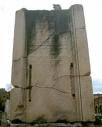
Early in 401 a group of barbaric Germans, incl. Ostrogoths, Alans, Suevi, Vandals, and Burgundians under pagan Ostrogoth king Radagaisus (350-406) cross the Danube River and invade Rhaetia (N of Cisalpine Gaul) and Noricum. In Oct. 401 after an anti-German faction triumphs in Constantinople, the Visigoths under Alaric I (370-410) turn on their former allies, cross the Alps, and invade Italy in Nov., sieging Aquileia, ravaging Istria and Venetia, and conquering N Italy up to Piacenza, threatening Milan, but half-Vandal orthodox Trinitarian Gen. Flavius Stilicho (359-408) soon is on their case, sending word to whimp emperor Honorius not to abandon Milan for Gaul; meanwhile the panicked citizens of Rome attempt to rebuild their walls.
In 402 Roman Gen. Stilicho, finding that Italy doesn't have enough troops any more to defend itself, urgently rounds up every Roman soldier from the Rhine he can get, leaving it unguarded, then recruits some select German Alamanni youths and non-German Alani cavalry, and even sends for the remaining troops on Hadrian's Wall in Britain (even though they don't have enough time to arrive before it's over?); meanwhile Alaric I and his tall long-haired fur-wrapped Visigoths siege Milan, and whimp emperor Honorius, "accompanied by a feeble train of statesmen and eunuchs, hastily retreated towards the Alps, with a design of securing his person in the city of Arles, which had often been the royal residence of his predecessors" - (Gibbon, Ch. 30); pursued by the Goth cavalry, he ends holed up in Asta in Liguria (Piemont) on the Tanarus River, and is about to be captured when Stilicho suddenly arrives John Wayne style with the cavalry, and the Goths hold a pow-wow in which Alaric changes their minds about retreating by declaring that he is resolved to find in Italy either a kingdom or a grave; on Apr. 6 (Mar. 29 Old Style) (Sun.) the orthodox Christian Romans surprise the Arian Visigoth camp while celebrating Easter at the Battle of Pollentia in modern-day Pollenza near Asti on the left bank of the Tanaro River in the Alps pocket WNW of Genoa (25 mi. SE of Turin), getting around the sacrilege by having the Roman cavalry charge be led by pagan barbarian (Alanii) Gen. Saul, but it almost backfires when the pissed-off Goths think God will help them win; the chieftain of the Alans dies fighting on the Roman side, causing his cavalry troops to flee, but Stilicho fills the gap, and the Goths retreat by evening, and the Romans raid their camp, slaughtering them and recovering much of the booty taken (capturing Alaric's wife?); Stilicho's wife Serena pays for a new floor in the Basilica of the Apostles to celebrate the big V; Marcus Aurelius Prudentius Clemens (348-413) of Tarraconensis (N Spain) (the first Roman Christian poet) writes Contra Symmachum, touting the Roman V, comparing it to Marius' 101 B.C.E. V over the Cimbri 60 mi. away.
In 403 after agreeing to return to Illyricum in exchange for his captured men, Alaric I, his infantry gone, retreats with his cavalry over the Apennines, causing the Romans to celebrate a triumph in Rome with a bust of him in chains; he then ravages Tuscany and conquers Istria early in the year, continuing to cling to his dream of taking Rome, but his independent chieftains accept a secret deal with the ministers of Honorius (who believes that war with the Eastern Roman Empire is inevitable) to leave Italy and receive a pension in return for joining forces with him in an attack on the Easterners; too bad, on the way out he double-crosses Honorius, decides to attack Verona (which commands the passage to the Rhaetian Alps), then recruits more Germans and sacks Gaul, but the same chieftains betray him and spill the beans, and he is ambushed and defeated near Verona by the Romans under Gen. Stilicho, causing him to hole up on some rocks until he is forced by starvation, disease and desertions to leave Italy and head E back to Epirus (Dalmatia), still considering the deal to help with the attack on the Eastern Roman Empire to be valid.

On Jan. 1, 404 Honorius and Stilicho celebrate a triumph in Rome, only the 4th in the last cent. (Constantine, Theodosius); an arch is erected claiming the total destruction of the Gothic nation, which will never rise again; Honorius spends several mo. in Rome, trying to make everybody feel good again by visiting the clergy on the one hand and attending the Dec. games on the other, the latter featuring not only chariot races but wild beast hunts and a military dance along with gladiator fights, which are interrupted by Christian poet Aurelius Prudentius Clemens, who gives a speech denouncing them, followed by Asian monk St. Telemachus (a myth?) rushing into the arena to tell them to make somebody stop the fight and being stoned to death by angry spectators, causing whimpy Honorius to pass laws prohibiting human sacrifices; grumblers predict that the martial spirit of the Romans, their obliviousness to the sight of blood and their contempt of death will evaporate, making them easy prey for the bloody barber-arians - and they were right? Also in 404 Honorius decides to find a safer royal palace, and chooses lagoon-filled Ravenna on the Adriatic coast of E Italy in Umbria, 10 mi. from the southermost of the seven mouths of the Po River, digging a harbor for 250 warships and the naval station of Classis, then building the artificial Via Caesaris causway connecting the marshy country to an island city made up of a a series of Venice-like canals with houses built on wooden piles in three quarters; it eventually becomes one of the most populous cities of Italy, and the capital of Italy until the middle of the 8th cent.

On Oct. 8, 405 after crossing the Alps, Radagaisus and his Ostrogoth hordes begin sieging Florence (its first siege in 500 years), and attempt to starve it into submission, but Bishop Zenobius leads the pop. into resisting and waiting for Roman relief troops; after their prophesies disturb him, Gen. Stilicho orders the destruction of the pagan Sibylline Books; seeing his chance, Pope (since 401) (St.) Innocent I (-417) issues the first Index Prohibitorum (List of Prohibited Books); all remaining pagan libraries are served notice that everything they've got is on the list?
On Aug. 23, 406 Gen. Stilicho, assisted by some Alans and some Huns under Uldin ambushes Radagaisus' mixed force of Vandals and Suevi on their way down the Mugnone Valley from Faesulae (Fiesole) in Tuscany at Montereggi, and kills Radagaisus, then incorporates the survivors into the Roman army. Godigisel is killed in battle before his people force a crossing of the Rhine River into Roman territory, and his eldest son Gunderic (379-428) becomes king of the E Germanic Arian Vandals (until 428), who take advantage of the vacuum of Roman troops on the Rhine frontier caused by the need to defend Italy and have the gall to invade Gaul along with thousands of other E Germans (Suevi, Alamanni, Burgundians), plus non-German Alani (Alans), crossing the frozen Rhine near the Main River on Dec. 31 looking for Lebensreim, er, Lebensraum, and capturing and sacking Reims (Rheims).

In 407 the Vandals et al. follow the Moselle and Aisne as they sack Amiens, Arras and Tournai, then turn S into Aquitania, reaching the Mediterranean - I'm going to need towels and three volunteers? Constantine III (Bendigeit Custennin) (-411) leads a revolt in Britain, claiming the purple as Roman emperor #82 (until 411), and going to Gaul with most of the remaining regular forces, deciding to permanently abandon Britain and let Picts from the N, and Angles, Saxons, and Jutes from Germany (originally hired as mercenaries by the Brythons) fight it out; Visigoth king Alaric I in Noricum is paid a huge sum of gold by the Roman Senate to take on the usurper; meanwhile barbarian Gen. Stilicho falls out of favor in Constantinople, and his head is on the chopping block.


In 408 the pop. of Rome riots and kills all the assimilated Visigoth families living in the area. On May 1, 408 Roman emperor (since 395) Arcadius (b. 377) dies, causing the planned Western Roman attack on the Eastern Roman Empire to be abandoned, pissing off Alaric I, causing him to demand two tons of gold as an indemnity; Arcadius' 7-y.-o. son Theodosius II (the Calligrapher) (401-50) becomes Roman emperor #83 of the East (until 450), with his eldest sister (a dedicated virgin) Pulcheria (399-453) as regent and real ruler, and Praetorian Prefect Anthemius as co-regent (until 414), who has the Theodosian Walls built, incl. a new W wall for Constantinople to protect the rapidly-growing suburbs, and a connecting seawall; Constantine III makes Arles in S Gaul his capital. Thanks for saving my life, sucka? On Aug. 22 Flavius Stilicho (b. 365) is decapitated by Count Heraclian in a churchyard in Ravenna on treason charges on orders of Emperor Honorius, who fears that he is plotting to put his own son Eucherius on the throne, and wants to renege on the 2 ton gold payment which Stilicho had insisted on being paid; Eucherius is murdered a few mo. later, followed by Stilcho's wife Serena, then the families of the barbarian auxiliaries in Italy, causing 30K of them to go over to madder-then-hell Alaric I in Noricum, who plans a revenge tour on Rome, sieging it and demanding and receiving a huge ransom.

In 409 the last Romans are expelled by the Britons, kissing Londinium (once 30K in pop.) and all the rest goodbye, and giving the starving Angles, Saxons, and Jutes of NW Europe a green light, with 200K eventually arriving just as the beleaguered Celts (Picts) begin raiding S while the new-kid-on-the-block Saxons mass for an attack up the Shit, er, Thames River; the line of Roman duces (defending generals) of Britain ends, and Coel Hen (350-420) (later known as Old King Cole) becomes the first Celtic high king of N Britain, ruling from Eburacum (York); Hadrian's Wall is abandoned, and local builders begin scavenging its cut stones, leaving only a remnant by modern times; despite the true owners of the island, the Celts coming out of hiding to take the island back, they are crippled by generations of being barred from carrying weapons, causing them to be poor soldiers who lose every battle and get pushed back to their hiding places, while those who are captured become servants to the nouveau riche Anglo-Saxons, who set up an apartheid with six social levels for the underclass Britons, five of which are slave classes, causing the birthrate of the Britons to dwindle while that of the Anglo-Saxons zooms, so that eventually every other man on the island carries the "Friesian gene"; Anglo-Saxon kings begin to be crowned on a coronation stone at Kingston on Thames (AKA Chingestone, Chingetune), 12 mi. upriver from London near an easy ford in Surrey.


In 409 Constans II (-411) is raised to the rank of Augustus (Roman emperor #84) (until 411) by usurper Constantine III to deal with the Vandals, who, led by Gunderic's brother Genseric, leave Toulouse and overrun Aquitaine, then break into Spain through the Pyrenees, along with the Suevi and Alans, causing a civil war; the Suevi end up with the NW corner N of the Douri River, the Alans the SW corner S of the Tagus River, and the Vandals hang on in the center. In 409 Gen. Gerontius (Lat. "old man") rebels against Constantine III, proclaims his son Maximus (-422) as Augustus (Roman emperor #85 of the West) (until 422), then marches to Gaul. In 409 the Visigoths under Alaric I siege Rome again, then force palace couch potato Honorius (hiding safe in Ravenna) to abdicate, and appoint his puppet, pagan Sen. (prefect of Rome) Priscus Attalus (-417) as Roman emperor #86 of the West, the last non-Christian Roman emperor, lasting only a few mo. until Alaric removes him for hampering his negotiations with Honorius, then restores him in Burdigala in 414 for a short time until the Visigoths ditch him and he is captured by Honorius' men, forced to participate in Honorius' triumph in Rome in 416, and exiled to the Aeolian Islands.
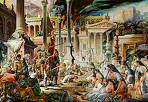


In 410 after deposed emperor Honorius regains power, Visigoth king Alaric I and his 40K-man army march down Italy yet one more time, depose and imprison puppet Attalus, then after a short siege marked by on-again-off-again negotiations enter through the Salarian Gate and sack Rome (say again?) on Aug. 24-27, leaving churches alone since they're still Christians, if heretic Arians, then after the emperor refuses to negotiate they head S towards Italy's granary in N Africa; Alaric I dies on the way to Sicily after losing his fleet and being turned back, and is buried in the bed of the Busento River; his brother-in-law Ataulf (Atawulf) (Athavulf) (Athaulf) (Ataulphus) (-415) succeeds him, vowing to destroy the very name of Rome (home of the heretic Nicean Council crowd of bishops?), causing head bishop Pope Innocent I to leave the city until 412; the woes of the prostrate city cause St. Augustine of Hippo (354-430) in North Africa to produce his 22-vol. escapist work (about a holy Augustus ruling an invincible holy city of Rome?) The City of God (De Civitate Dei Contra Paganos), as the real City of God is no longer able to protect what's left of the Roman Catholic Western Roman Empire from the heavy G.I. Joe and hairy Barbie-doll barbed Arians (barbarians)?; he at first claims "Behold, from Adam all the years have passed, and behold the 6,000 years are completed", but as the world shows no sign of ending he teaches that the Church should ditch the Book of Revelation because the Kingdom of God has actually arrived with its new political power, and imagines the Church as a worldwide empire acting as the instrument of the Holy Spirit to gradually transform the world, but preaches that the heavenly New Jerusalem should be the goal rather than the earthly one; he pushes the doctrine of "Totus Ubique" (the whole of God everywhere), invents the notion of the inner self, explores the inner relationship between the soul and God along with the idea of divine grace, and all with the cool language of a Roman-trained rhetorician, dissing the holier-than-thou Donatists by claiming that saints and sinners should all be part of the Catholic Church, and will be separated at the End of Time, with the mystical secret brotherhood of saints forming the City of God, and the sinners forming the Twin City of Hell; "That which man builds man destroys, but the city of God is built by God and cannot be destroyed by man", its role being "to inspire men and women to organize their communities in the image and likeness of the heavenly city"; the operational message is that Christians should get out and convert violent barbarians, with education relegated to survey courses on classical lit. (science and technology - fuggedaboutit), giving the Roman Catholic Church its Mission: Impossible for the next six cents.; too bad, his work is later used to justify persecution of heretics and Jews because membership in the Church is mandatory; in short, Da Dark Ages; Pope Innocent I laps it up and becomes a groupie? - duh, Jesus said be no part of this world (John 17:14-16)?

In 411 Roman emperor (since 409) Constans II is captured and executed in Vienne by Gen. Gerontius, who is defeated by Gen. Constantius (later Emperor Constantius III) in Arles; Maximus flees; Constantine III is defeated by Honorius' cmdr. Gen. Constantius (later Emperor Constantius III) and captured near Arles; meanwhile Roman gen. Jovinus (Jovinius) (-413) seizes power in Mainz, declaring himself Roman emperor #87 of the West (until 413).

In 412 Gen. Constantius expels Ataulf and his Visigoths from Italy, and they move N, ravage Etruria, cross the Alps, then ravage S Gaul, Genoa, Marseille, and Arles; meanwhile Jovinus proclaims his brother Sebastianus (-413) as Augustus (Roman emperor #88 of the West) (until 413). Meanwhile in 412 Pope Innocent I returns to Rome and takes the lead in the reconstruction of the city (the Catholic way?), insisting that all Western bishops recognize him as head in matters of worship.
On May 8, 413 Honorius signs an edict providing tax relief for provinces of Italy that have been plundered by the Visigoths. In 413 Jovinus permits the Burgundians under Gundar (Guntiar) (Gunther) to settle on the left bank of the Rhine River between the Lauter and Nahe Rivers, and they go on to found a kingdom with capital at Wurms (Worms), after which Ataulf sieges Jovinus in Valentia (Valence) in SE France, captures and hands him over to Postumus Dardanus for execution, then does ditto with Sebastianus, settling for a time in Toulouse.

In July 414 Theodosius II bestows on Pulcheria the title of Augusta of the East; under her vow of celibacy she virtually rules the East with no worry about a hubby? In 414 Ataulf proclaims imprisoned Roman Sen. Priscus Attalus as rival Augustus in Bordeaux for the 2nd time in a ploy to get Honorius to accept settlement of his Visigoths on Roman territory as federated troops; to twist Honorius' arm Ataulf captures and marries Honorius' pretty sister Aelia Galla Placidia (392-450) in Italy after the Roman ritual, but it doesn't work - he's still the wrong color, too white?

In Mar. 415 after Alexandrian bishop St. Cyril expels the Jews from Alexandria, Hypatia (b. 370), the Neoplatonist librarian of Alexandria, who supports Orestes, pagan prefect of Alexandria for opposing persecution of pagans and Jews is jumped in her chariot, stripped naked, and dragged through the streets to the newly-depaganized Caesareum Church, and murdered by a mob of Coptic Christian monks (from Nitria?) led by Peter (working for Archbishop Cyril under the influence of Pulcheria), ending the Hellenistic Age; her skin is scraped off with sharpened oyster shells and she is set on fire while still alive?; the first burning by Christians of a witch?; meanwhile St. Augustine writes "The true image of the Hebrew is Judas Iscariot, who sells the Lord for silver. The Jew can never understand the Scriptures and forever will bear the guilt for the death of Jesus." On Oct. 17, 415 after expelling the pesky Jews from Alexandria under his sister Pulcheria's influence, Emperor Theodosius II issues a decree prohibiting them from building new synagogues.
In 415 under Roman pressure the Visigoths under Ataulf invade Aquitania and burn Bordeaux, then cross the Pyrenees and invade the Iberian Peninsula, where the grateful Jews find protection under them from the Trinitarian Christians; Priscus Attalus is cut loose by the Visigoths, captured by gen. Constantius, then paraded, mutilated (forefinger and thumb cut off so he can't draw a bow), and exiled (he can still flog his bishop?); too bad, Ataulf is assassinated in Barcelona in his bath by a servant of his Gothic noble enemy Sarus, whom Ataulf had slain earlier; Sarus' clan of the Amali immediately elect Sarus' brother Sigeric (-415) as king of the Visigoths, who murders Ataulf's six children from an earlier marriage "whom he tore, without pity, from the feeble arms of a venerable bishop", then treats his widow Galla Placidia (daughter of emperor Theodosius) "with cruel and wanton insult" by making her march 12 mi. on foot in a crowd of captives, pissing off Ataulf's supporters, who assassinate him after only seven days and replace him with Ataulf's relative (member of the Balti clan) Wallia (Valia) (-419), who goes on to extend his domain over most of Spain and S Gaul (Aquitaine), and establish his capital in (don't say Holy) Toledo (Roman town of Toletum, "raised aloft") in very defensible C Spain, built on a hill and surrounded on three sides by the Tagus River, with the Roman praetorium called the Alcazar as fortress.
In 416 after the Romans blockade Spain, Wallia tries to cross the Fretum Herculaneum (Straits of Gibraltar) to the African granary, but loses his ships, and is forced to make terms with Honorius and restore Galla Placidia to him in exchange for supplies, agreeing to clear Spain of the other barbarians, destroying the Siling Vandals and decimating the Alani, who flee to the protection of Vandal king Gunderic.
On Jan. 1, 417 Constantius III marries Honorius' sister Galla Placidia, going on to have future emperor Valentinian III in 419; somewhen Galla Placidia becomes the last female pilgrim to set foot on Mt. Athos (until ?), but she is ordered by an icon of the Virgin to halt, and turns around and exeunts.

On Feb. 8, 421 Gen. Constantius, hubby of Galla Placidia becomes Roman emperor #89 of the West Constantius III, but dies of illness on Sept. 2. Also in 421 Moron, er, Mormon's son Moroni, last of the Nephite prophet-historians seals the sacred records known as the Book of Mormon (inscribed on gold plates) in a stone box and hides them "up unto the Lord" in a hole in the ground, then returns as an angel in 1823 to visit lucky prophet Joseph Smith in his bedroom on Sept. 21 and tell him where to dig them up on a hill near Manchester, Ontario County, N.Y., and after being prevented for four years by the angel, he finally does it on Sept. 22, 1827, and in just three more years (which makes seven years, natch) the great news is pub. to a grateful world - that, yes, right store, right price, just what you're looking for at a mighty nice price, the original Elvis and the golden record?
On Aug. 15, 423 Roman emperor (since 393) Honorius (b. 384) dies, and Ioannes (Johannes) (John) (-425) seizes power in Ravenna, becoming Roman emperor #90 of the West (until 425).

In 424 at the request of Roman gen. Flavius Aetius (396-454) in the name of Ioannes, 60K Huns march to Italy to support him; when they return, Aetius hates it, but lets them settle in Pannonia.

In 425 Theodosius II sends an expedition to Ravenna under Ardabur the Elder to install first-grader Valentinian as emperor of the West, and Ardabur is captured but persuades Ioannes' officials to betray him, and Ioannes is captured, mutilated, and executed; on Oct. 23 after the defeat of Ioannes, Valentinian III (Placidus Valentinianus) (419-55), son of Honorius's half-sister Galla Placidia and dead Augustus Constantius (d. 421) is proclaimed Roman emperor #91 of the West (until 455), and is recognized by Theodosius II. By 425 the Vandals from East Germany and the Alani from SE Russia settle in the S of sunny Spain; meanwhile the Huns hold Pannonia (Hungary W of the Danube), and the Goths hold Dalmatia. The last Nazi until the 20th century? In 425 after his sister Pulcheria puts him up to it for authorizing new synagogues to be built and adjudicating disputes between Jews and Christians, Theodosius II orders the destruction of Jewish synagogues and the execution of Jewish physician and patriarch (since 400) Gamaliel VI (Heb. "recompense of God"), who becomes the last Nasi (patriarch) of the Jewish Sanhedrin, abolishing his office in 429; the House of Hillel (Heb. "greatly praised") becomes extinct, along with the Semicha, the tradition of judicial authority in an unbroken line from Moses; Nasi is the Hebrew title of prince - the original Nazis were Jews? The title of papa is applied to all Christian bishops until 425, when it is limited to the top bishop in Rome?
In 429 after receiving an appeal from Roman gov. of North Africa Gen. Bonifacius (Bonifatius) (Boniface), who is in revolt against Empress Galla Placidia and wants to set himself up as an independent ruler of Africa, Genseric leads his 80K Vandals (plus some Alans) from S Spain into North Africa - never invite a vandal into your home? In 430 the Vandals doublecross Gen. Bonifacius and begin sacking N Africa and sieging Hippo (until 431), causing him to accept the regency of Galla Placidia and defend Hippo with Gothic mercenaries; meanwhile the downtrodden indigenous pop. welcomes the Vandals as liberators from the Roman slavemaster landowners; Numidian-born Bishop of Hippo St. Augustine (b. 354) is killed in Hippo during the Vandal invasion. In 431 the Vandals defeat Gen. Bonifacius and force him to flee to Italy, then capture Hippo after a 2-year siege, and create an empire in N Africa, exterminating the great landowners, wiping out all debts to Roman moneylenders, and eliminating military service, causing the indigenous pop. of nomadic tribes to welcome them; rival Roman Gen. Aetius seeks refuge with the Huns, and at the head of 60K Huns forces Empress Galla Placidia to pardon him and promote him to master of the cavalry and infantry (Duke of the West), while forcing Boniface's son-in-law Sebastian to flee.
In 432 Gen. Bonifacius is recalled to Rome, and Gen. Aetius disposes of him too. Valentinian III's sister Princess (raised to Augusta to keep her a virgin) Justa Grata Honoria (416-) (daughter of Constantius III and Galla Placidia, and granddaughter of Theodosius II) is caught in an improper love affair (preggers) with court chamberlain Eugenius, causing Empress Placidia to strip her of her title and banish her from Ravenna to Constantinople.
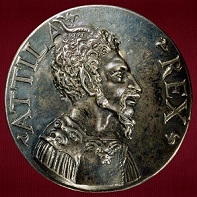
In 434 Rugilas (Roas) dies, and his nephews (3.5 ft. tall) Attila (Gothic for "little father"?) the Hun (the Mundzuk) (406-53) and Bleda (-444) succeed as rulers of the Huns; the peace treaty negotiations are continued on a plain near the city of Margus in Upper Moesia, where the Hun rulers talk with the Roman ambassadors on horseback; the treaty requires the humilitated Romans to double their annual tribute to 700 lbs. of gold, to pay a fine of eight pieces of gold for every Roman captive escaping from the Huns, to return or crucify all fugitives, and to renounce all treaties with the enemies of the Huns.
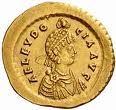
In 438 the Theodosian Law Code (Codex Theodosianus), a collection of Roman laws issued since 312 is pub., formally separating the Eastern and Western Roman Empires; Section XVI.i.2 makes Christianity the official religion of the Roman Empire, and declares all other religions illegal; next year Valentinian III adopts it for the West; meanwhile Theodosius II's wife Aelia Eudocia (401-60) permits the Jews to return to Jerusalem - if your family circle joins my family circle we'll have a chain, and I can't have a chink in my chain?
In 439 after a triumphal sack-happy progress through N Africa, the Vandals capture Carthage (until 534) while most of the pop. are watching the races at the hippodrome, make it their capital, and begin to master seamanship, creating a powerful navy that becomes a royal pain in the ass to the Roman govt., which is already disintegrating under the barbarian kingdoms of the West, going on to eagerly vandalize the soft underbelly of Europe; Genseric makes Carthage his capital, and styles himself king of the Vandals and Alans after integrating the Alans of N Africa into his alliance.
In 441 Attila decides to kick his kickstand on his Hog, and sacks Singidunum (modern-day Belgrade), razing the city and fortress and selling its pop. into slavery; that behind him, he goes on a hellraising party through the Eastern Empire (ends 443). In 444 Attila has his brother Bleda executed, and becomes the most important man in Europe until his death in 453, bullying Ravenna and Constantinople for the next decade.
In 445 Emperor Valentinian III endorses the authority of the bishop of Rome, issuing an edict declaring him the "head of all the churches of the West", with all bishops commanded "to hold and observe as a law whatever it should please the bishop of Rome to ordain or decree" - when I say no Easter during a Super Bowl, I mean it?
In 447 Vandal king Genseric, faced by an alliance of the Roman emperors urges Attila to attack the Byzantines, and the mean midget on horseback invades the Balkans, raiding S to the walls of Constantinople after destroying 70 cities - riding through town with a Happy Meal in my booster seat?
In 447 Roman historian Varro claims that the city of Rome (founded -753) is now exactly 12 cents. old, and is therefore due to fall according to the pagan legend that every Roman knows defines them and who they iz - so, Christians, you can have it?
In 448 Emperor Theodosius II sends an embasssy headed by Maximin and accompanied by Priscus and Vigilius (the interpreter), the latter given a secret mission from Theodosius' eunuch Chrysaphius to assassinate Attila, but he confesses and is spared upon paying 200 lbs. of gold; Attila sends his own ambassadors Eslaw and Orestes to expose the treachery and dictate terms, and Theodosius II agrees to send another embassy to kiss up to Attila, which eventually agrees to the humiliating Redistribution of the European Nations at the hands of the Huns, giving them all the land along the S banks of the Danube River from Singidunum (Belgrade) to Novae in Thrace, with a breadth equal to a distance of 15 days' ride into Roman territory; the annual tribute of the Eastern Roman Empire to the Huns is increased to 2.1K lbs. of gold, with a 6K lb. payment up front; the negotiations continue up to Theodosius II's death in 450.

In spring 450 Honoria (daughter of Placidia), forced to live with the sisters of Theodosius II and their chosen virgins in Constantinople so that she isn't getting any like she did in ravin' Ravenna, who is being forced to marry some old fart Roman senator, sends a eunuch with a letter and her engagement ring to Attila the Hun and calls upon him to be her deliverer, which Attila takes as a marriage proposal; since he already has enough wives, he passes for the time being, and when her advances are discovered she is sent back to Italy, almost executed by her enraged brother Valentinian III, then forced into a marriage with some obscure bozo named Flavius Bassus Herculanus, and permanently imprisoned - if only he'd known she was used goods? In 450 Roman emperor (since 408) Theodosius II (b. 401) is thrown from his horse into the Lycus River near Constantinople, and dies several days later at age 50 after reigning 43 years; his eldest sister (supposedly a virgin) Pulcheria (399-453) is proclaimed Roman emperor #92 of the East, becoming the first female ruler of the Romans; she has the eunuch Chrysaphius executed before the city gates without a trial, and the move is so unpopular that to cover her butt she marries 60-y.-o. Thracian-born tribune and senator Marcian (390-457), who becomes Roman emperor #93 of the East (until 457) (last of the House of Theodosius), being crowned by the Constantinople patriarch on Aug. 25 (the first religious coronation of an emperor); too bad, he makes the big mistake of sending ambassador Apollonius to Attila to demand an end to the annual tribute, causing the latter to send ministers to both the Eastern and Western emperors with the message, "Attila, my lord and thy lord, commands thee to provide a palace for his immediate reception"; thinking the East was too easy, he prepares an attack on the more wealthy West first? On Nov. 27, 450 Empress Placidia (b. 392) dies in Rome, and is buried in Ravenna in a sepulchre seated in a cypress chair.

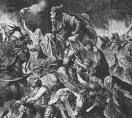


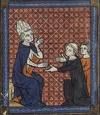


In 451-2 mean Asian midget (Calmuck?) Attila (Gothic for "little father"?) the Hun (the Mundzuk) (406-53), the "Scourge of God" (Flagellum Dei) and his hordes of 850K horsemen deal the West a fatal blow, stick them with a fork. In 451 after Italy suffers a devastating famine this year (and next), later helping convince him not to take the city of Rome, Attila declares war on the Western Roman Empire, and, using the supposed marriage proposal of Valentinian III's sister (Galla Placidia's daughter) Justa Grata Honoria as an excuse crosses from Pannonia, destroying Emona (Lyublana), and arriving in Belgica with up to 500K troops from Germany and Scythia (incl. the Ostrogoths, who end up falling by the thousands to their kinsmen the Visigoths at Chalons), joined by the Franks (led by the elder rival for the throne) when he reaches the confluence of the Rhine and the Neckar Rivers, using trees from the Hercynian Forest to build a bridge to ford the Rhine in the spring, then sacking the towns of France, incl. Metz (Divodurum) (Apr. 7), Tongres, Cambrai, Rheims (Reims), Mainz, Strasbourg, Cologne, Trier, and Arles (Artebatum), mysteriously bypassing Paris after a short siege, then in June seriously sieging Aurelianum (Orleans) (100 mi. SSW of Paris on the Loire, originally the Roman settlement of Cenabum), which is saved by the efforts of Bishop Anianus, until Frankish-Burgundian-Celtic reinforcements under Roman Gen. Flavius Aetius and Visigoth King Theodoric I (with his sons Torismond and Theodoric II) arrive, causing Attila to retreat back past the Seine River to the plains of Chalons (E of Paris, between Reims on the N and Troyes on the S)), where his Scythian cavalry can operate advantageously on its smooth level surface; along the way to Orleans he and his hordes are allegedly miraculously diverted by the prayers of worthy Christian saints from various lucky towns, incl. Troyes (100 mi. SE of Paris) by St. Lupus (Loup) (-479) (who gives himself as hostage to Attila), and don't forget Paris, allegedly saved by living saint (a Romanized Celt from Gaul) St. Genevieve (422-512) (Gael. "Gwenfrewi" = white wave or stream), AKA the Shepherd Girl of Nanterre (422-512); too bad that prayers to St. Servatius (-384) can't save Tongres (because God had already called him home?), nor can prayers to St. Ursula (-383) save Cologne, and poor Metz has no saints, so that Attila finds it no problemo, and massacres its priests, along with the infants that had just been baptised by the bishop, then burns it down, except for the Chapel of St. Stephen; meanwhile gen. Aetius and Theodoric I, having raised the support of the Romans, Visigoths and Franks, incl. the independent tribes of the Laeti (from Gaul), Armorici (between the Seine and Loire), Breones (Rhaetians from E of Lake Constance), Saxons (from the diocese of Bayreux), Burgundians (from Savoy), Sarmatians (Alani), Ripuarians (Ripuarii) (Ripari) (named from their posts on the rivers Rhine, Meuse and Moselle), and Franks (under Merowig), finally kick the butts of Attila's Hun hordes in June at the original Million-Man March, the 1M-man Battle of Chalons, AKA the Battle of Catalaunian Fields (Plains) (Campus Mauriacus) near Troyes (in NE France) in the province of Campania (Champagne) (capital Rheims) (a good place to campaign your horses because it's so level?); previously during his retreat from Orleans the Gepids under Attila's main man Ardaric are mauled by the Franks, losing 15K men; the battle begins with a struggle for the heights, which is won by the Visigoths led by Theodoric I's eldest son Torismond (Thorismund) (-453), causing Attila to give a speech to his troops to whip them up, saying, "I myself will throw the first javelin, and the wretch who refuses to imitate the example of his soveriegn is devoted to inevitable death"; Attila ocupying the center of the battle line in person, the Gepids form the right wing, and the Ostrogoths form the left wing to oppose the Visigoths; on the other side Gen. Aetius and his Romans form the left wing, Theodoric I the right wing, and the Alani (settled in Aurelianum around Orleans) under Sangiban the meat-grinder center (to make him pay for promising Attila to open the city gates of Orleans for him?); Theodoric I is felled from his horse by a javelin thrown by the Ostrogoth Andages, then trampled to death by his own cavalry; the Alani flee or defect, but the Huns lose, and only the coming of night saves Attila from being captured, causing him to circle the wagons and order the saddles of his cavalry piled up to be used as his funeral pyre in case the camp should be taken?; 162K-300K men die on both sides in "a conflict fierce, various, obstinate, and bloody, such as could not be paralleled either in the present or in past ages" (Cassiodorus Senator); Europe is saved from having a Mongolian overlord, but Attila's example encourages many other barbarian tribes to swarm the sagging Roman Empire, worst of all being the seafaring vandalizing Vandals?; Torismond becomes king of the Visigoths (until 453), and after "crafty Aetius.. fearing that Rome might find a second Alaric... persuaded the young king to return at once to his capital" (Gibbon) withdraws his Visigoths back to Toulouse to prevent his brothers from usurping his throne, then Aetius withdraws, leaving Attila and his Huns alone on the plains of Chalons for several days licking their wounds (and facing plague?) until they decide to retreat NE back over the Rhine S of Cologne to count their loot, with the Franks under Merowig following them all the way to Thuringia in C Germany, learning of atrocities against hostages and maidens which the son of Clovis I revenges 80 years later; "[Attila's] retreat across the Rhine confessed the last victory which was achieved in the name of the Western Roman Empire" (Gibbon); Attila is not finished, however, and during the winter he plans some more fun in the Italian sun? - see ya later, alligator?
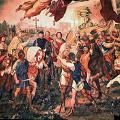
In spring 452 Attila again demands dear Princess Honoria, crosses the Alps E of Pannonia, crosses the Save River going S, then wheels W and invades Italy on June 8, sacking it as he goes then laying siege to the rich maritime city of Aquileia, using Roman captives to construct siege engines, but finally deciding to give up after 3 mo.; too bad, as he is packing up, Attila observes a stork leaving its nest in one of the city's towers, causing him to declare it an omen and renew the siege, finally taking and burning the pesky city (#1 commercial city of N Italy) to the ground (ouch), building a castle on a hill N of it to watch it burn, thus founding the town of Udine; Attila then destroys Altinum (near modern-day Venice), Concordia, and Padua, goes inland and sacks Vicenza (on the confluence of the Bacchiglione and Retrone Rivers, 40 mi. W of modern-day Venice), Verona, and Bergamo, bypasses Mutina (Modena) after its dead bishop St. Geminian(us) (-397) miraculously intercedes with a dense fog, then loots Milan and Padua without burning them (finding a painting in Milan's royal palace showing Scythian princes prostrate at the Roman emperor's feet, and ordering a painter to reverse the figures?); Valentinian III abandons the impregnable fortress of Ravenna for Rome, while Gen. Aetius and his small remaining force of Roman troops harass Attila all the way to Rome, where he camps at Lake Benacus at the end of the Mincius River (on the former farms of Virgil and Catullus); after some Huns reach the gates of Rome, Valentinian III sends a 3-man delegation led by Roman sen. Avienus and Pope Leo I, who meet Attila in Mincia (near Mantua); Pope Leo I then shows why he's the Great by wowing Attila with his witch doctor voodoo jive honky act, making him see visions of Peter and Paul (and/or other celestial spooks) hovering over him and threatening him with instant death if he attacks the Holy City of Rome (and telling him how his babe Honoria is ugly, old used merchandise, and reminding him of what happened to the last dude who sacked Rome, Alaric?); after seeing plague break out among his men, food supplies run low, and Roman reinforcements coming from the east, Attila strikes a secret peace agreement, the Romans paying an immense ransom as a dowry for Princess Honoria, which they promise to send along to him later (yuk yuk?); Attila then returns across the Alps to Pannonia (Hungary) with his bloated, well-laid, treasure-carting Huns - who are becoming soft with Italian cooking and diseases?
Early in 453 (Jan. 18 by any chance?) Attila the Hun (b. 406) dies in Sicambria shortly after marrying I-like-flat-buns Ildico (Il Dyke-o?), daughter of a Germanic chief; the official story is a burst artery that drowned him in blood in his sleep, but rumors have it that she knifed him (maybe he just got overexcited on his wedding night, or was into B&D?); Emperor Marcia allegedly has a vision that night in Constantinople of Attila's bow breaking (maybe he was behind it?); he dies after conquering 1450K sq. mi. of C and E Europe, incl. the W Russian plain, but failing to conquer Gaul; his remains are enclosed in three coffins of gold, silver, and iron and buried in a grave aunder the bed of the Tisza River long with many spoils, incl. the bodies of the captives who dug the grave to keep the location secret; his son Ellac (-455) succeeds him, but the other sons Dengisich ("little sea") and Ernakh (Ernac) (-503) (who rules the Utigur Bulgars until 503) fight with him and each other, setting them up for conquest by their outside enemies. Also in 453 Torismond is murdered by his younger brother Theodoric II (-466), who becomes king of the Visigoths in Gaul based in Aquitaine, "justifying this atrocious deed by the design which his predecessor had formed of violating his alliance with the empire" (Gibbon).
On Sept. 21, 454 after court eunuch Heraclius whispers in his ear, Valentinian III murders rich, famous, popular patrician Roman gen. Aetius (b. 396) in the palace of Rome with his own sword, partly because Aetius' son Gaudentius is betrothed to his own daughter Eudoxia and he fears a coup; Praetorian prefect Boethius and many of Aetius' friends are also murdered; his death causes a power vacuum in Gaul, and turns the people against the emperor? - zoom zoom zoom? In 454 the Battle of the Nedao (Netad) River in Pannonia, led by the Gepids under Ardaric in an alliance with rebel Germans and Sarmatians, incl. the Ostrogoths under Walamir is a D for the Huns under Attila's eldest son Ellac, who is KIA along with 30K Huns, leaving his brother Dengisich (-470) as the new king of the humbled Huns, who flee, eventually settling on the lower Danube in Scythia; Ardaric takes over Attila's wooden palace along with Dacia (E Carpathians to the Euxine); the Ostrogoths under brothers Walamir (oldest), Theodemir, and Widemir (d. 473) (youngest) split up Attila's Pannonian conquests from Vienna to Sirmium (modern Hungary W of the Danube) and become military allies (federates) of the Byzantine Empire (Walamer's portion is between the rivers Save and Drave, Wedimer's between the Save and Plattensee, Theodemir's between the Plattensee and Danube), inviting other Ostrogoths within the Roman Empire to join them; Singidunum is reclaimed by the Byzantines, only to lose it to the Sarmatians; the Hun Empire begins to disintegrate, and the Huns speedily disappear from the map, melting into surrounding pops. - now everybody in C Europe claims to have a little Hun in them?
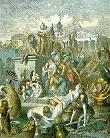


On Mar. 16, 455 Roman emperor (since 425) Valentinian III (b. 419) is murdered in the Campus Martius (Field of Ares) in Rome while watching war games by his own guards Optila and Thraustila (followers of Aetius avenging his murder, as well as Scythians working for Sen. Petronius Maximus, whose wife Valentinian had tricked into hanky-panky in the palace?), along with his advisor Heraclius; Valentinian III becomes the last emperor of the Theodosius family; Petronius Maximus (397-455) becomes Roman emperor #94 of the West (until 455) (first of the "shadow emperors", puppet rulers presiding over Rome's demise with short-lived reigns) after forcing Valentinian III's wife Eudoxia to marry him and distributing bribes; he lasts 77 days before being killed on May 22, causing Eudoxia to paradoxically call for help from the (educated, moral, literate, civilized?) Vandal pirates from Carthage under Genseric (Gaiseric), king of Africa, who are more than happy to cross the Mediterranean, then sack Rome (not destroying a single bldg. but only pillaging after Pope Leo I the Great talks to him?) for two fun-filled weeks (June 2-16), carrying away the empress and her two daughters, plus what was left by the Visigoths in 410, incl. the C.E. 70 Jerusalem spoils of Titus, which sink on the return voyage to Carthage (and have yet to be found by Indiana Jones?); on July 9 Eparchius Avitus (395-457), master of soldiers and ambassador to the Visigoths is proclaimed Roman emperor #95 of the West by the Gallic army, and enters Italy on Sept. 21; Pope Leo I's efforts to stop Genseric, along with his shine with Attila add to the prestige of the papacy after the Western Roman Empire falls, and he becomes the first pope to claim to possess "plenitudo postestasis" (fullness of power of jurisdiction) over the entire Church, and to become virtual mayor of Rome, with political, civil, financial, and defense responsibilities.

In Mar. 456 after the sailing season begins Vandal African King Genseric ravages Sicily and S Italy, setting up the Vandal Kingdom of West Sicily which lasts to 534. In 456 the Visigoths of Gaul under Theodoric enter NW Spain and defeat the Sueves (Suevi) at the Battle of the Urbicus River. In 456 Avitus advances from S Gaul to Rome, but a revolt by Majorian and the Suevian master of soldiers Ricimer (Rikimer) (405-72) (whose mother is Wallia's daughter) causes him to flee back to Gaul, where he is caught, stripped of his imperial dignity, and forcibly consecrated as bishop of Piacenza, soon disappearing down the rice bowl of history.


In Jan. 457 Roman Byzantine emperor (since 450) Marcian (b. 390) dies, and is succeeded by Thracian Leo I (-474) as Roman emperor #96 of the East (until 474); Ricimer retains power by securing the consent of Leo I to his nominee Majorian (Julius Valerius Majorianus) (420-61), who becomes Roman emperor #97 of the West; meanwhile the Vandals head E and lay Greece waste, followed by Dalmatia, then threaten Constantinople, causing Marjorian to make a major but unsuccessful attempt to stop them.
On Aug. 2, 461 Roman emperor (since 457) Majorian (b. 420) is forced by mutineers in Dertona (Tertona) to abdicate as he passes through on his return journey to Italy from Spain, and five days later mysteriously dies, and Ricimer gets his nominee Libius Severus III (-465) declared Roman emperor #98 of the West with the consent of Emperor Leo I. In 465 Roman emperor (since 461) Libius Severus III dies, and there is a 2-year interregnum in the withering West.

On Apr. 12, 467 Ricimer's nominee (daddy of his wife) Procopius Anthemius (420-472) becomes Roman emperor #99 of the West (until 472), again with consent of Eastern emperor Leo I, becoming the last able Western emperor, facing the problem of the Visigoths in Gaul and Spain, and the Vandals in N Africa, allying with Breton (Briton?) king Riothamus (Riotimus) (Rigothamus) (Gael. "supreme leader") (son of Deroch I), who travels by sea with his 12K-man army to Bourges (Berry) near Buridgala (Bordeaux); too bad, Euric is tipped off by Arvandus, Roman prefect of Gaul (461-5, 467-70), and intercepts Riothamus before he can hook up with the Romans, defeating him and causing him and his survivors to flee to the Burgundians (then back to Britanny or Britain), after which he seizes the Gallic city of Arverna (named after Mercury); after being found out, Arvandus is convicted of treason and banished; Riothamus is the real King Arthur, because he is last known to be near the Burgundian town of Avallon, and his betrayal by Arvandus is really the story of Mordred? In 467 in order to offset the Alan Aspar, master of the troops, Emperor Leo I marries his daughter Ariadne to Zeno, an Isaurian from the mountains of S Asia Minor.
On Feb. 28, 468 Pope (since 461) Hilarius dies, and on Mar. 3 Pope (#47) (St.) Simplicius (-483) is elected, seeing the Western Roman Empire end during his reign, and the simplistic schism with the churches of Armenia, Syria, and Egypt (Copts) begin. Leo I and Anthemius make another major but unsuccessful attempt to subdue the pesky Vandals in N Africa, which ends in the destruction of the huge Byzantine fleet of gen. Flavius Basiliscus (-477) at Carthage by Genseric, and the murder in Aug. of Roman gen. Marcellinus (cmdr. of Dalmatia since 454) in Sicily in Aug., after which the Vandals attempt to invade the Peloponnese but are driven back by the Maniots at Kenipolis with heavy losses, pissing off the Vandals, who take 500 hostages in Zakynthos, hack them to pieces, and throw them overboard on the return voyage to Carthage.
In 470 Roman emperor Anthemius falls sick and blames it on sorcery, taking it out on many nobles, causing Ricimer and his 6K men about to fight the Vandals to begin a civil war against him in Milan.

On July 11, 472 Roman emperor (since 467) Anthemius (b. 420) is killed by Ricimer, ending the civil war; Ricimer's nominee Anicius Olybrius becomes sole Western Roman emperor #100 for a few mo.; Ricimer dies, and his pagan nephew Gundobald (Gundebald) (Gundibald) (Gondebaud) (-516) succeeds to his position as patrician and master of soldiers (until 473).





On Jan. 18, 474 Roman Byzantine emperor (since 457) Leo I dies of dysentery, and is succeeded by his infant grandson (son of his daughter Ariadne) Leo II (-474) as Roman emperor #101 of the East; on Feb. 9 his daddy, Ariadne's Isaurian husband Trascalisseus (Trasicodissa) makes himself co-emperor Zeno (426-91), Roman emperor #102 of the East (until 496); in June after Leo I names him to stop Glycerius, Dalmatian cmdr. Julius Nepos ("nephew") (430-80), husband of Leo I's niece marches into Ravenna and claims the purple as Roman emperor #103 of the West (until 480), and Glycerius gives up without a fight, being made bishop of Salona (Solin) in Dalmatia; the Western Roman Empire now consists of Italy, part of the Balkans, and footholds in N and S Gaul; the Vandals begin launching pirate attacks on the coasts of Italy; on Nov. 17 Leo II dies, and Zeno (who probably did you know what) becomes sole Eastern emperor, causing Leo I's widow Aelia Verina (-484) to depose "the worthless and ungrateful servant on whom she alone had bestowed the sceptre of the East" (Gibbon, Ch. 39), and replace him with her brother Flavius Basiliscus (-477) as Roman emperor #104 of the East (until 477). On Jan. 9, 475 he is proclaimed Augustus in Constantinople, and drives Zeno into exile in his home mountains of Isauria.

The Roman Empire is suffering Seinfeldian shrinkage? In 475 a treaty is signed by Roman emperor Nepos with Euric, recognizing the Visigoths as masters of most of Gaul and Spain in exchange for restoring the Provence region of Gaul to imperial control; meanwhile Nepos appoints German tribesman (half-German and half-Roman?) Orestes Augustus (-476) (father of Romulus Augustulus) (former asst. to Attila the Hun and husband of the daughter of Count Romulus of Petovio in Noricum) as master of soldiers (big mistake?), and after the Roman Senate abandons Nepos for his Eastern ties, Orestes stages a coup in Ravenna on Aug. 25, becoming Roman emperor #105 (until 476), causing Nepos to flee to Dalmatia, where he rules with the backing of the Byzantine emperor and is recognized in Gaul; Orestes then gets his teenie son (by his Roman wife) (known only for his beauty) Flavius Romulus Augustus (Augustulus) (Momyllus) (461-77?) crowned as Western Roman emperor #106 (last) (until 476) on Oct. 31; "The appellations of the two great founders, of the city and of the monarchy, were thus strangely united in the last of their successors." - Gibbon, Ch. 36.



In Aug. 476 Flavius Odoacer (Odovacer) (435-93), Herulian Visigoth chief gen. of the Germanic tribes in the Roman army leads a revolt over a baksheesh matter (free homes in Italy), captures Ravenna, and kills Orestes in Pavia; on Sept. 4 (Sept. 7 Gregorian) (Mon.) Romulus Augustus (461-77?) (AKA Augustulus), the boy emperor of Rome in Ravenna becomes the Last Roman Emperor of the West as he is deposed and exiled to the castle of Lucullus in Campania in S Italy (with 6K pieces of gold per annum allowance) by Odoacer, who proclaims himself Roman emperor of the West, petitioning Emperor Zeno to recognize him as a patrician and ruler of Italy on behalf of the Eastern Empire; Zeno accepts on the last part, but insists that exiled Julian Nepos (d. 480) remain Roman emperor, which he does, on coins; Odoacer uses the old Roman law of hospitality providing for the quartering of Roman soldiers to force Roman landowners to surrender a third of their estates for use by his soldiers; many non-aristocratic Romans welcome the new boss because he will abolish the taxation and police system, while aristocratic Romans in Gaul circle the wagons and create private armies; 753 + 476 - 1 = 1228?; the Dark Ages begin as 1.2K years of progress of civilization becomes kaput in Europe thanks to barbarians and Christian hostility to paganism, which to them incl. all pagan scientific, literary, historical, and cultural works, making all scientists forever suspect of being in league with the Devil by the Christian masses, an impediment that ends in ?, and the very idea of wanting to live for "the world" when the Kingdom of Heaven is dangled in front of your eyes to seem pointless?; "So it was in utter social decay and collapse that the great slave-holding 'world-ascendency' of the god-Caesars and the rich men of Rome came to an end" (H.G. Wells, Ch. 37) - so who is the last emperor, Romulus Augustus or Nepos? Roman Byzantine emperor (since 474) Basiliscus assassinates Verina's lover, and offends Achilles, lover of his wife Harmatius, causing a conspiracy to form against him, and Isaurian gen. Illus (-488) flops onto Zeno's side, along with Ostrogoth king Theodoric, allowing him to march to Constantinople and regain the Eastern throne, while Verina flees and continues to oppose him; Zeno starves Basiliscus and his family to death in an unheated basilica, then adopts Theodoric as his son, gives him the rank of patrician and consul, the command of the Palatine troops, an equestrian statue, a large sum of silver and gold, and a rich noble Byzantine wife; too bad that Goths stick together when the blood is flowing? Zeno finally concludes a perpetual peace with the Vandals, and recognizes Genseric's authority; Trinitarian bishop Victor of Cartenna sends a refutation of Arianism to Genseric, and is not punished even though Trinitarians are persecuted and Vandals are prohibited from conversion. After the Western Roman Empire falls, the new Visigoth masters of Italy, Gaul, Spain, and North Africa aren't into Science much, and as they were themselves squeezed by more German barbarians and Byzantine armies, Europe descends into the Dark Ages, where literacy is almost kaput, and money disappears, requiring barter; the onset of the Muslim Great Jihad in the 600s closes the last doors; literacy survives mainly in outlying monasteries in Ireland that only copy religious lit. The Dark Ages set in for the Iron Chefs of Europe? From this year to the 15th cent. C.E. Medieval Cuisine is based on primitive preservation methods (salting, pickling, smoking, drying), with the diet mainly consisting of cereals (sans rice and potatoes, which are introduced from America in the 1530s); cattle raising is undeveloped, causing reliance on game meat and seafood; seasonings incl. spices (pepper, ginger, caraway, anise, fennel, cumin, saffron), wine, and vinegar are used in many sweet-sour recipes; no, they don't serve spiced spoiled meat, they aren't nuts; almond milk is used as a thickener; fruits (plums, figs, grapes, raisins, apples, pears) and veggies (lettuce, cabbage, carrots) are used liberally. Religious and societal class rules limit meat consumption, as do rules based on the Four Bodily Humors of 2nd cent. Greek physician Galen (129-216); beals are limited to a heavy midday dinner and a lighter evening supper; great quantities of wine, beer, and ale make up for everything? After the Western Roman Empire falls, the art of eating truffles disappears in Europe for a thousand years; meanwhile the Italian cities begin to be ruled by bishops, who become protectors of the oppressed and dispensers of charity, which evolves under the Lombards to the point of municipal independence, walled towns, civilian consuls and guilds, and ultimately backfires as the towns fight encroachments from the papacy and the German emperors, ending in fun guys like Giuseppe Garibaldi in the 1900s?


Although the line of Roman emperors ends in 476, the Byzantine emperors continue until 1453, when the Muslim Ottoman Turks killed the last one and took over Constantinople, changing the name to Istanbul. Too bad, a school of West-hating historians arose in the East that claims that because the Byzantines called themselves Roman, and because Byzantium was the shining city of civilization to the yokels in Russia et al. seemingly forever, the Rome in Italy was made up ex-post facto along with its emperors, and that a thousand years of history have been fabricated out of whole cloth to make the West superior to the East, and thus we need to reset the calendar and throw out all historyscopes. This school, represented by Russian topologist Anatoly Fomenko (1945-) et al., and having followers incl. world chess champ Gary Kasparov is called the Nuclear Wessel School, after Ensign Pavel Chekhov in the TV series "Star Trek", and is about as realistic as that series, Beam Me Up Scotty, too bad that they keep digging up all them old Roman coins, let's play some 3-D chess with Spock as we're going faster than the speed of light.